



Beat the holiday blues
Become a mentor
Cut the cost of motoring


WHAT
★
YOUR TOUR GUIDE WON’T TELL YOU— P102 ★ HOW TO...
Picnic in comfort 50 YEARS ON… “MY DAD, THE GREAT TRAIN ROBBER” p38 PLUS David Gower Adele Parks
AUGUST 2013 £3.79 REPUBLIC OF IRELAND €5.10 readersdigest.co.uk AUGUST
John Lloyd Brenda Blethyn on fame, why she’d love Vera as a mate and still feeling like a beginner at 67
BOOK EXTRACT What Bob did next. Dylan after the Sixties by Ian Bell UNDERCOVER WITH THE WORLD’S MOST DANGEROUS SMUGGLERS EAT YOUR WAY TO THE PERFECT DAY! p70

Catherine Haughney, editor of Reader’s Digest, welcomes you to the July issue
Tell us what you think of this issue: theeditor@readersdigest.co.uk


Like us on Facebook: facebook.com/readersdigestuk
Follow us on twitter: twitter.com/rdigest
August 2013 Features

Described as “franker and cheekier than a barrel full of monkeys’, comedian and former RD columnist Je Green takes on the getting of wisdom in this month’s “Maverick”. p76

“There’s no doubt that the world is becoming noisier,” says journalist Lynne Wallis. “And coping with noise-related stress is sapping our physical and mental health.” p58

While writing his book Outlaws Inc, Matt Potter went undercover to investigate the biggest smuggling network in history—from Russia to the waters of South America. p86
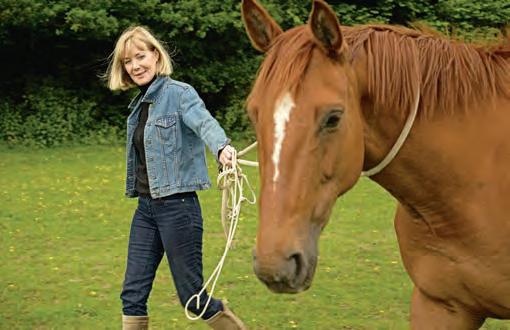
What did the actress say to the horse? See p52
28 Reasons to Be Cheerful, Part 33 Why James Brown is ditching social networks for real life 32 Brenda Blethyn The Oscar-nominated actress talks self-doubt, sea cadets and how life feels better after a nice bit of grilled chicken 38 My Dad, the Great Train Robber Nick Reynolds’s extraordinary childhood 44 Best of British: Homes of Writers & Artists Looking for literary inspiration? Try these locations 52 A Life Less Ordinary: Horses for Courses How a love of horses prepared actress Kika Mirylees for her most unusual role yet 58 C’Mon Fear the Noise Why modern life is just too LOUD!! 64 John Lloyd: “I Remember” The veteran producer tells how creating QI saved him from existential crisis 70 Eat Your Way to the Perfect Day From porridge to pasta: how to choose the right food for the right mood 76 The Maverick: “We Don’t Get Wiser With Age” Broader knowledge can mean narrower thinking, says comedian Je Green 80 The Habit of a Lifetime Life in the religious orders in the 21st century 86 BONUS READ: Flight Club The Russian pilots who’ll deliver anything anywhere—as long as they’re
paid enough
JAMES
Stories featured on the cover are shown in red
Regulars Welcome
...at the front

...at the back

As we’re in the holiday month of August, if you have free time, why not visit some of the houses of this country’s most famous writers and artists? (See our Best of British feature on p44.) I’m heading o to Charleston in Sussex, home to artists Vanessa Bell and Duncan Grant, because it has a connection with Reader’s Digest In 1981, Lila Acheson Wallace, our cofounder and a generous patron of the arts, donated £50,000 to help preserve Charleston so that people like me could visit all these years later. Thank you, Lila.
Reader’s
If you’re a fan of a taut, tense, gripping read, turn to p86 for Matt Potter’s real-life tale of “anything goes” smuggling after the collapse of the Soviet Union. You’ll never look at a cargo plane in quite the same way again.
Happy holidays!

2 READERSDIGEST.CO.UK AUGUST 2013
Digest the World’s Biggest Magazine published in 50 editions in 21 languages On our cover: Subject photographed by photographer Catherine Haughney theeditor@readersdigest.co.uk facebook.com/readersdigestuk twitter.com/rdigest ReadingTheDigest
9 Over to You… 13 Radar—Your Guide to August Film: Natalie Haynes Music: Stuart Maconie Gadgets: Olly Mann Sport: Andy Zaltzman 19 You Couldn’t Make It Up… 23 Word Power 26 If I Ruled the World: David Gower
98 1,001 Things Everyone Should Know 104 Medicine: Max Pemberton 107 Health: Susannah Hickling 112 Consumer: Donal MacIntyre 114 Money: Jasmine Birtles 118 Fast Food 121 Gardening 124 Online: Martha Lane Fox 126 Motoring: Conor McNicholas 128 Travel: Kate Pettifer 130 The Reader’s Digest—our recommended reads of the month 135 Books That Changed My Life: Adele Parks 138 Laugh! 142 RD Brain Teasers 144 Beat the Cartoonist!
b






Write On…
Send us your stories, jokes and letters—if we publish, we pay!
WE PAY
£50 for the star letter and £30 for regular letters.
EARN
£50!





Email readersletters@readersdigest. co.uk or write to Readers’ Letters, Reader’s Digest, 1 Eversholt Street, London NW1 2DN £50 for the true stories, anecdotes, jokes in Laugh! and You Couldn’t Make It Up…, and contributions to end-of-article fillers, Travel and Gardening. Email excerpts@ readersdigest.co.uk or write to Excerpts, Reader’s Digest, 1 Eversholt Street, London NW1 2DN
Digest,
Visit readersdigest.co.uk or write to Reader’s Digest, PO Box 444, Douglas, Isle of Man IM99 3ZF.
UK: £42 a year. Republic of Ireland: €74.39 a year.
Europe: £50 a year. Rest of the world: £60 a year. Prices include delivery. For Gift Subscriptions contact Customer Services below SUBSCRIBE!
CUSTOMER SERVICES
Contact Customer Services for renewals, gifts, address changes, payments, account information and all other enquiries. Phone: 0871 351 1000 (Calls from a BT landline will cost 10p a minute. Call costs from other providers may vary.) Email: customer_ service@readersdigest.co.uk
Minicom: 0870 600 1153.

twitter.com/rdigest

TALKING MAGAZINES
Reader’s Digest is available in a talking edition for blind and partially sighted people for £16. For details, phone: 01435 866 102; email: info@ tnauk.org.uk, website: tnauk.org.uk.
SMALL PRINT
Ensure submissions are not previously published. Include your name, email, address and daytime phone number with all correspondence. We may edit letters and use them in all print and electronic media. Contributions used become world copyright of Vivat Direct Ltd (t/a Reader’s Digest).
WE ALSO PAY SORRY!
We cannot acknowledge or return unpublished items or unsolicited article-length manuscripts. Do not send SAEs. Articlelength stories, poetry and cartoons are not requested.
facebook.com/readersdigestukReadingTheDigest

4 READERSDIGEST.CO.UK AUGUST 2013
b
Who needs a tractor?





Well it’s one way of transporting a pony. Another would be in the back of a Jazz. When a Scottish farmer’s tractor broke down, he popped the boot, flipped the Magic Seats and drove his prize Shetland to the local horse show. Not the most conventional way to use the versatile Jazz. But probably the most Honda one.













Jazz1.2S , £145a month, 0% APR Representative



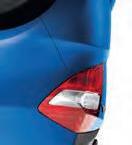



honda.co.uk/tractor
Fuel consumption figures for Jazz i-VTEC petrol models in mpg (l/100km): Urban 40.9 - 45.6 (6.9 - 6.2), Extra Urban 57.7 - 61.4 (4.9 - 4.6), Combined 50.4 - 54.3 (5.6 - 5.2). CO2 emissions: 129 - 120g/km. Fuel consumption figures sourced from official EU-regulated laboratory test results, are provided for comparison purposes and may not reflect real-life driving experience.
Model shown: Jazz 1.2 i-VTEC S Manual in optional Azure Blue Metallic at £12,145 On The Road. Terms and conditions: New retail Jazz 1.2 i-VTEC registrations from 1 July to 30 September 2013. Subject to model and colour availability. Offers applicable at participating dealers and are at the promoter’s absolute discretion. Honda Aspirations (PCP): £145 per month example based on Jazz 1.2 i-VTEC S Manual in metallic/pearl paint at £12,145 total cash price (and total amount payable) with 36 months’ 0% APR Representative (interest rate per annum 0% fixed) with £2,530.28 (21%) deposit, Optional Final Payment of £4,394.69, annual mileage of 10,000 and excess mileage charge 3p per mile. You do not have to pay the Final Payment if you return the car at the end of the agreement and you have paid all other amounts due, the vehicle is in good condition and has been serviced in accordance with the Honda service book and the maximum annual mileage has not been exceeded. Indemnities may be required in certain circumstances. Finance is only available to persons aged 18 or over, subject to status. All figures are correct at time of publication but may be subject to change. Credit provided by Honda Finance Europe Plc. 470 London Road, Slough, Berkshire SL3 8QY. Servicing: Four years’ servicing or 50,000 miles, whichever comes first, for £399 including VAT and includes a maximum of four manufacturer’s scheduled services.
@readersdigest.co.uk
Online this month…
WEB
EXCLUSIVE!
THE TOP TEN HAPPIEST
FILMS EVER
From WALL-E to Singin’ in the Rain, our film critic Natalie Haynes chooses the films that make us smile, laugh or cry (with joy). Find out which films made the cut at readersdigest.co.uk/magazine

cut at readersdigest.co.uk/magazine

OUR NEW BLOG! Looking for interesting fun, facts and features? Or how about wonderful stories from our archive? Then visit our blog at readingthedigest.com.
CHECK OUT our fabulous apps, too! Go to the App Store, iTunes music store, Google Play Store and Amazon to download our magazine apps onto your iPad, Kindle or tablet.


















6 © 2013 Vivat Direct Ltd (t/a Reader’s Digest). British Reader’s Digest is published by Vivat Direct Ltd, 1 Eversholt Street, London NW1 2DN. All rights reserved throughout the world. Reproduction in any manner, in whole or part, in English or other languages, is prohibited. Reader’s Digest is a trademark owned and under license from The Reader’s Digest Association, Inc, and is registered with the United States Patent and Trademark O ce. All rights reserved. Classified advertising by Madison Bell. Printed by Polestar Chantry, Polestar UK Print Ltd. Newstrade distribution by Mail Publishing Solutions. PUBLISHED BY VIVAT DIRECT LTD (T/A READER’S DIGEST), 1 EVERSHOLT STREET, LONDON NW1 2DN PAPER FROM SUSTAINABLE FORESTS. PLEASE RECYCLE THE READER’S DIGEST ASSOCIATION INC President and Chief Executive O cer ROBERT E GUTH Vice President, Chief Operating O cer, International BRIAN KENNEDY Editor-in-chief, International Magazines RAIMO MOYSA EDITORIAL Editor CATHERINE HAUGHNEY Deputy Editor/Design Director MARTIN COLYER Deputy Editor/Features Editor SIMON HEMELRYK Production Editor TOM BROWNE Assistant Features Editor/Web Editor ELLIE ROSE Art Editor HUGH KYLE Picture Editor ROBERTA MITCHELL Contributing Editors SUSANNAH HICKLING (Health) CAROLINE HUTTON JAMES WALTON LOLA BORG LINDA GRAY ADVERTISING Head of Advertising Sales ADRIAN MILNER Account Directors SIMON FULTON JIGS PANKHANIA Account Manager SUZANNE SMITH MARKETING Head of Marketing JAMES GREENWOOD PRODUCTION JAN BUCIL MANAGING DIRECTOR EDWARD KNIGHTON
facebook.com/readersdigestukReadingTheDigest twitter.com/rdigest b











SO WHY IGNORE BLOOD WHEN YOU BRUSH YOUR TEETH?
If you spit blood when you brush your teeth, it could be an early sign of gum disease, a leading cause of tooth loss. So, if you spit blood in the sink when you brush your teeth, try Corsodyl Mint Mouthwash. Nothing is more effective at treating gum disease.* Find out more at www.corsodyl.co.uk

CLINICALLY PROVEN. FOR PEOPLE WHO SPIT BLOOD WHEN THEY BRUSH THEIR TEETH.

*Over the counter medicines only. Corsodyl Mint Mouthwash contains chlorhexidine digluconate. Bleeding gums can be a sign of gum disease and not treating may lead to tooth loss. Always read the label. CORSODYL is a registered trade mark of the GlaxoSmithKline group of companies.
YOU WOULDN’T IGNORE THIS.
Over to You...
EMAILS, LETTERS, TWEETS AND FACEBOOK
£30 FOR EACH PUBLISHED LETTER, £50 FOR THE LETTER OF THE MONTH!
SEE P4 FOR MORE DETAILS

LETTER OF THE MONTH

I read “How War Heals” with great interest. My niece Ruth is an army captain and also a highly qualified trauma nurse, and during her tour of duty at Camp Bastion hospital in Afghanistan, she dealt with many appalling injuries. According to her, ketamine is now being used as an alternative analgesic to morphine—although better known as a horse tranquilliser, it apparently has fewer adverse side e ects than opiates.
Ruth also tells me that all the British soldiers wear silk boxer shorts under their padding around the crotch. Silk has a unique ability to entangle and stop tiny slivers of shrapnel that would otherwise cause terrible damage. US soldiers don’t currently wear them and, as a result, have a higher number of groin injuries. Richard Sirot, Kent
DIVERSE DADS
The five fathers profiled in “Family Guys” are proud, kind and happy men, but I didn’t feel your article was a fair depiction of dads in general.
All were in well-paid jobs and able to a ord little extras for their kids. But what about those who are out of work through no fault of their own and struggle to provide things? Or the brave dads serving in the armed forces, who don’t see their o spring for months? And we shouldn’t forget disabled dads who overcome great handicaps to bring up children.
John Roberts, Conwy
Matt Ogborne says he likes to hear his daughters making noise because of the tragic loss of his stillborn son. As the product of a marriage that only produced me after one stillbirth and six miscarriages, I can understand that. But I was never encouraged to look upon a supermarket as a playground where my desire to “run around and play with everything” should be indulged.
As a former shopkeeper, I can tell you that unchecked kids
9 AUGUST 2013READERSDIGEST.CO.UK
►
Over to You…
damage stock, which then has to be sold at a loss because the parents are unwilling to pay.
Hilary Woodjetts, Oxfordshire
GAME, SET AND MATCH
I thoroughly enjoyed your article about Andy Murray. My family were there on that magical day in Dunblane when Andy came home to meet his fans. He couldn’t have been more gracious if he tried, posing for photos and signing things. He spoke to my husband, shook my son’s hand and smiled in my direction. It makes me emotional just thinking about it.
Angela Logan, Perthshire
THE SOUND OF SUMMER
It was interesting to read about the robot lawnmower in your Radar section. But as it detects a signal from a perimeter wire, the machine can presumably work in darkness. Imagine my joy at the possibility of a chorus of mowers continuing throughout the night.
David Bennett, Sta ordshire
A BIT OF A SQUEEZE
Following on from your “Crazy Houses” feature, I thought I’d mention a weird residence in Conwy, Wales, near where I live. The smallest in the UK, it measures ten feet by six-and-a-half feet. Strangely, the fisherman who first owned it was over six foot!
Jenny Moyneux, Clwyd

RD: Yes, we love that house (pictured left) too. In fact, it was featured in “Best of British: Little Britain” in March 2012. Thanks for jogging our memory!
QUICK WIT
We went to Theatre Bristol to see comedian Josh Widdicombe, one of your columnists. During the show a mobile phone went o , and Josh asked the woman responsible who’d phoned. She replied sheepishly that it was a reminder to take her medication. Josh told her to take it, and she said, “No, it’s OK—I’m stable,” whereupon the man in the next seat piped up, “But keep all sharp objects out of reach!”
Carol Davis, Somerset
KNOW OF ANY GOOD SAMARITANS?
RD: Read Josh’s column on p139.

As Reader’s Digest is the home of stories of ordinary people doing extraordinary things, The Garden Productions, the team behind award-winning Channel 4 series 24 Hours in A&E, wondered if any of our readers have ever been rescued by an unknown good Samaritan and would like help finding that person to say thank you. Or if you’ve ever stepped in to help a stranger in an emergency, do you want to know what happened to them? If you’ve been in either position, The Garden would love to hear from you for an inspirational programme it’s making for ITV1. Please contact Katy at takepart@ thegardenproductions.tv or call 020 7261 1252.
10 READERSDIGEST.CO.UKAUGUST 2013
◄


Flora pro.activ Buttery.
Proven cholesterol lowering never tasted so good.
Clinically proven to actively lower cholesterol by 7-10%*, with a rich buttery taste and creamy texture. Now, lowering your cholesterol doesn’t mean giving up the tastes you love.

www.floraproactiv.co.uk
* 1.5 to 2.4 g of plant sterols daily can lower cholesterol by 7-10% within 2-3 weeks. Enjoy Flora Pro.activ as part of a healthy diet and lifestyle.

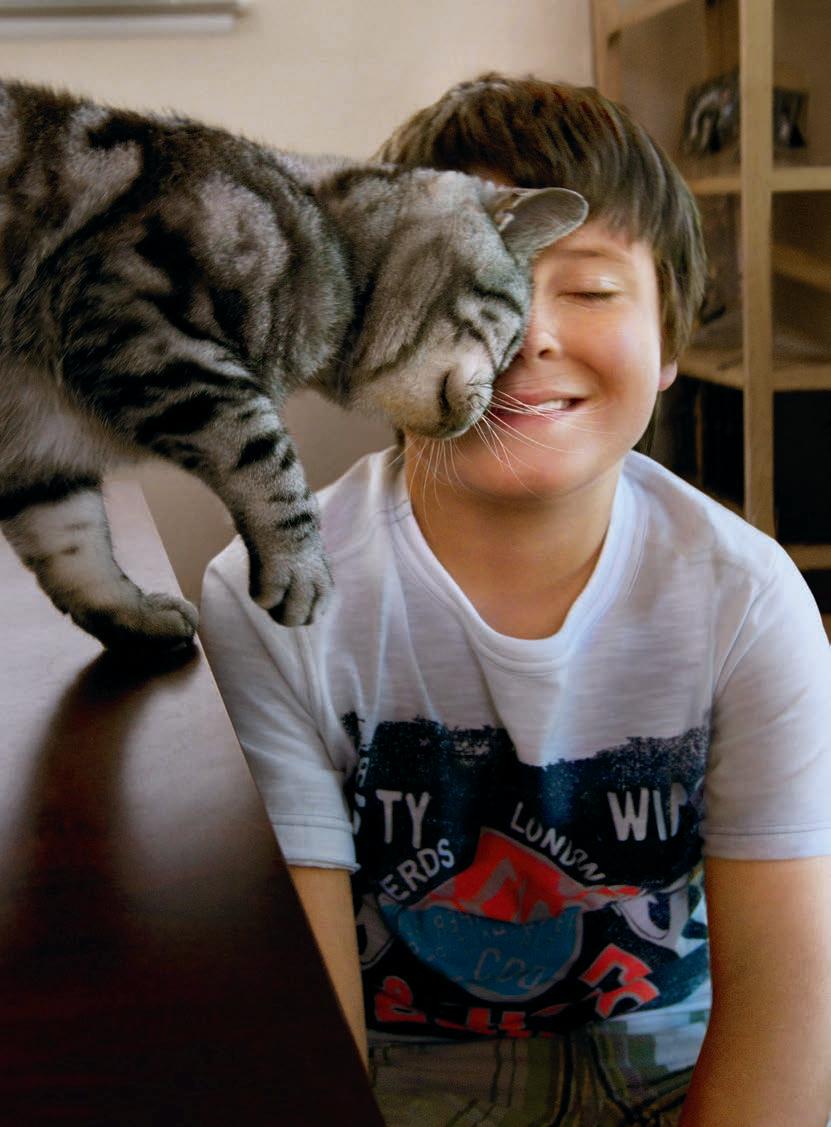



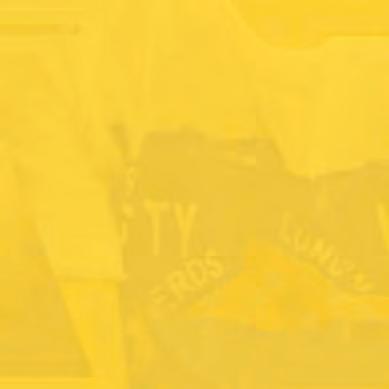



Film R A D AR
YOUR SHORT, SHARP GUIDE TO AUGUST

 Author and BBC4 Review Show critic Natalie Haynes on the new releases
Author and BBC4 Review Show critic Natalie Haynes on the new releases
IN CINEMAS
Alan Partridge: Alpha Papa
Every time I see a terrible idea for a reality show, I can’t help thinking of Partridge pitching “Monkey Tennis” to a TV exec during the BBC2 series. Now the failed chat show host turned local DJ finally fulfils his destiny and appears in his own film. He’s back in Norwich, where he belongs, but the city has taken on a dangerous aspect with a disgruntled former employee of Alan’s radio station on the loose.
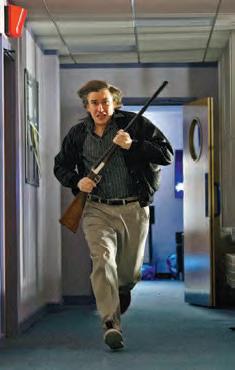


Steve Coogan is on peerless form as Alan, the wonderful Felicity Montagu returns as his put-upon assistant Lynn, and the cast is a parade of British comedy stalwarts from Simon Greenall to Darren Boyd. Besides, I’ve waited a long time to tell you to go and see a film because my boyfriend is in it (he plays the handsome policeman Sarge), so go.
Under
13 AUGUST 2013READERSDIGEST.CO.UK 2013
►
siege: Steve Coogan as hapless DJ Alan Partridge
Percy Jackson: Sea of Monsters
The Percy Jackson novels by Rick Riordan are a huge global hit— if you haven’t heard of them, your children certainly have. We follow Percy as he discovers there’s a reason why he doesn’t quite fit in at home or at school: he’s a Greek demigod (Perseus, for those of you who prefer your classics to be less modern). Happens to the best of us.

The first film (Percy Jackson: The Lightning Thief) was good fun, and now Percy’s on a quest for the Golden Fleece (yes, I know it was Jason who searched for the Golden Fleece, but Greek myth has existed for millennia and it can cope with a bit of stretching). Look out for some inspired casting along the way—Sean Bean as Zeus and Stanley Tucci as the dissolute Dionysus are just a couple of highlights.

READER RADAR
Stephen Webster, 60, teacher

AND NATALIE’S PICK OF THE DVDS
Oblivion Tom Cruise battles to save mankind again (we really owe him one). This time, earth’s future hangs in the balance after a war with aliens.
The Place Beyond The Pines
Ryan
Gosling stars as a mysterious biker—with Eva Mendes, Rose Byrne and Bradley Cooper: all Hollywood’s prettiest people in one film.


Watching: The Chase (ITV1) This game show has an unusual combination of gambling and general knowledge. The questions are a bit di erent too.
Reading: Invisible Romans by Robert Knapp Deals with the lives of ordinary people in ancient Rome—the sort of people most of
us might have been. The nearest you can get to time travel.
Online: flickr I’m a keen artist, so this is brilliant for finding photos of landscapes to paint.
Listening: Second Waltz by Shostakovich Part waltz, part march—when I first heard it, I had to know what it was.
14 READERSDIGEST.CO.UK AUGUST 2013
R A D AR
Logan Lerman as Percy Jackson and Alexandra Daddario as fellow demigod Annabeth Chase
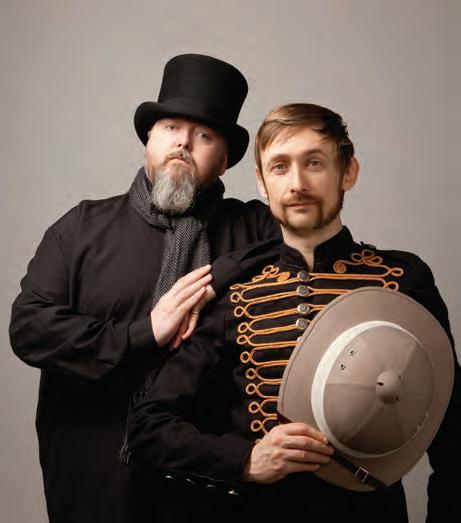
Music

BBC 6 Music’s Stuart Maconie’s pick of the recent releases

Sticky Wickets by The Duckworth

Chic record in all but name), a new generation has been alerted to the genius of Nile Rodgers. There has been no shortage of collections, but if you’re new to Chic, this is a terrific place to start, combining all the band’s hits, connoisseur selections such as the 12-inch of “My Forbidden Lover” and many of the songs Rodgers wrote and produced for acts like Sister Sledge, Diana Ross and, bizarrely, Johnny Mathis.
The Weight of Your Love by Editors






that Mick Jagger has been ►
Lewis Method Think Electric Light Orchestra meet 10cc at The Oval. In 2009, just ahead of the Ashes, Neil Hannon of The Divine Comedy and Thomas Walsh released their first album, inspired by a joint love of cricket. It was a treat, and four years later— just before another Ashes series —they return with this joyous celebration and recreation of slick 1970s British pop. The title track is the Stones song about cricket that Mick Jagger has been threatening to make for decades.
Up All Night by Nile Rodgers
Presents: The Chic Organisation
Think “disco” is too small a word for it. Perhaps partly because of his work on the new Daft Punk album (“Get Lucky” is surely a
Think U2 for the Spotify era. When Editors emerged in 2005, their thrilling live show and singer Tom Smith’s bruised baritone invited comparisons to Joy Division. They perhaps struggled to capitalise on that early impact, but have regrouped with R.E.M. producer Scott Litt. The result is a record steeped in 1980s arena rock and the wide open vistas of American music. Some fans may find the slickness and lack of shadows disappointing, but the sheer confidence of the sound may well win new admirers, especially in an al-fresco setting.

Gadgets

Technology expert, broadcaster and Answer
Me This! podcaster
Olly Mann reveals the latest must-haves
ALSO ON OUR RADAR…
August 2–26
Edinburgh
Festival Fringe
August 3–4
Prudential RideLondon mass cycling event
August 8
Eid al-Fitr (celebration for the end of Ramadan)
August 23–25
Reading & Leeds Festival
August 23–26
Bolton Food & Drink Festival
Polti Vaporettino Lux
Steam Gun, £29.95
Who has the most fun doing housework? Robocop, that’s who. There’s no need to scrub away at grease and grime like a Dickensian street urchin when you can blast it o with a pistol full of high-pressure hot vapour. Just a fraction of the size (and price) of a full-blown steam cleaner, the Vaporettino is still jolly e ective at removing stains and comes with a range of useful add-ons such as a flexible hose and lance. No child lock, though, so don’t give it to anyone you wouldn’t trust with, er, a gun.


Garmin Nuvi Premium, £269.99
Drivers increasingly use smartphones as satnavs, and many question the need for a stand-
AND CHECK OUT…
Pure Jongo, £169.99
alone navigation unit in 2013. Garmin’s answer has been to invigorate their range with seriously swanky design— slim metal casing, multitouch glass screen, magnetic screenmount—and bring in more realistic road signs, free map updates and crowd-sourced live tra c info. There is, as they say, an app for that, but it doesn’t look as cool as this.

Place these punchy portable speakers around the house, stream music to them from your tablet and— hey presto!—an a ordable multi-room speaker system.
Linksys RE2000 Wireless-N Range Extender, £59.99
This signal booster plugs into a wall socket and boosts your Wi-Fi signal to cover areas of your home your router can’t reach.

16 READERSDIGEST.CO.UK AUGUST 2013
R A D AR


ESPNcricinfo cricket blogger, broadcaster and stand-up comedian
Andy Zaltzman previews the best of the month’s action
Sport
Fencing World Championships,
Budapest, August 5–12
Fencing is an incomprehensibly rapid sport to those wise souls who tend to avoid becoming involved in sword fights.
So if you watch this event, the best thing to do is keep an eye out for the Italians. Beyond having the top teams in both genders in the foil category, they’re also always world number ones in body language. By a large and vividly gesticulated margin. So don’t watch the ba ing bouts. Watch their reactions. They’ll tell you everything you need to know about a) who’s won, b) the human condition, and c) Italy.
level of unpredictability. Last season’s top three all have new managers. David Moyes (below) takes over at Manchester United in a Scot-for-Scot succession to Alex Ferguson. Venerable Chilean Manuel Pellegrini takes over at the Abu Dhabi plaything and former football club
Manchester City. And charismatic, irritating, genial, rude, tactically limited footballing genius José Mourinho is back in the ejector seat at Chelsea.



Gloriously expressive.
Gloriously expressive.
For the neutral, much of the interest lies in whether the media can continue to feign interest in who finishes sixth, thus winning the right not to care about being in whatever the Europa League is called next season.

Premier League
Opening Day, August 17
FIM World Superbike

The 22nd season
debt-excreting
The 22nd season of the cash-guzzling, money-vomiting, debt-excreting sporto-economic minotaur kicks o amid an unusual
Championship Round 9, Silverstone, August 2–4
Tom Sykes, challenging strongly for Britain’s first vroom vroom world title since James Toseland’s victory in 2007, aims to add Silverstone wins to his double victory at Donington. ■
17 AUGUST 2013READERSDIGEST.CO.UK
GETTY IMAGES; AFP/GETTY IMAGES





You Couldn’t Make It Up…
¶ I WAS PUTTING ON A PRODUCTION OF THE Gilbert and Sullivan comic opera “The Mikado”, set in Japan. We had lots of lovely costumes, including a genuine and very rare samuri warrior’s outfit. It doesn’t form any part of the plot, but I still wanted to use it.
The orchestra started the overture, and I opened the curtains to an actor in the centre of the stage wearing the costume. He was standing perfectly still as a tableau and illuminated with special lighting. The e ect was magical. When the overture finished I closed the curtains to great applause, then opened them again to start the opera.
The audience loved the spectacle—except one 12-year-old boy who said loudly, “It’s a pity they opened the curtains too soon.”
Brian Daniels, Worcestershire


¶ My dad and his friends Asem and Mandeep were talking about the benefits of protein shakes.
“Oh, that stu ,” said Mandeep. “It never works.”
“Yes it does—I’ve tried it. And anyway it tastes quite nice,” Asem replied.
“What’s this got to do with taste?” asked Mandeep.
“You mix the powder with milk and drink it,” he explained.
“Oh,” said Mandeep, blushing bright red, “I just rubbed the powder on my arms…”
Zainab Malik, London

¶ As we were parked behind a police car at the tra c lights, my young daughter spotted a dog in the back of their vehicle.
“What did he do wrong?” she asked in a concerned tone.
Anna Hammett, Cheshire
¶ Arriving in Cape Town to visit family, we asked for train tickets to Johannesburg.
“Fast or slow train?” asked the man in the ticket o ce. “The fast costs more.”
We opted for the fast train, eager as we were to reach our family. The only trouble was it stopped to pick up a lone milk churn left beside the rails every few miles. Once the train halted, the engine was disconnected and it chugged o along a branch line to
19 AUGUST 2013READERSDIGEST.CO.UK
►
You Couldn’t Make It Up…
return much later towing a wagon full of churns.
When the guard came around later to check our tickets, I said, “I thought this was a fast train!”
Drawing himself up to show his full authority, he replied, “This is a fast train! It just stops frequently.”
May Fenn, Essex
¶ The day after we’d been watching an old recording of the marriage of Prince William and Kate Middleton, an invitation dropped through the door from my brother to his daughter Victoria’s wedding.


When my four-year-old grandson heard about it, he said, “Will we be going to the wedding or just watching it on TV?”
Christine Edney, East Sussex
¶ I was driving a male patient to the local hospice. He sat in the front seat, and I subsequently
WIN £50 FOR YOUR TRUE, FUNNY STORIES. EMAIL excerpts@ readers digest.co.uk OR GO TO facebook. com/readers digestuk ◄
¶ I WAS VISITING MY MOTHER one afternoon when she disappeared into the kitchen to make a drink and fetch a book she’d promised to lend me.
After she’d returned with

picked up a lady who sat in the back.
As we were driving along, the lady said to the man in front, “You used to work at the bus depot, didn’t you?”
“That’s right,” he said, without looking back. “Do you remember fat old Liz that worked there?”
“Yes…that was me,” she replied.
He looked round with an embarrassed expression, then said, “Blimey, you’ve lost weight!”
Roy Day, Bristol
two cups of tea and sat down, I asked if she wasn’t able to find the book.
“Oh God, I’m losing my marbles!” she replied, and started to get up again.
My seven-year-old son,
who’d been playing on the floor, piped up, “It’s OK, Nanny, you can have some of mine,” and promptly deposited a handful of glass balls in her lap.
Tracy Jones, Anglesey ■
20 READERSDIGEST.CO.UK AUGUST 2013

Understand care costs and you’ll feel at home
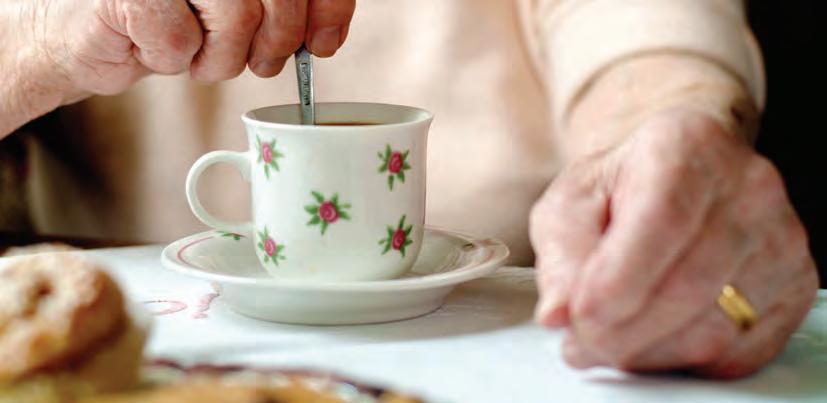



PART 2 of our six- part series
Knowing exactly what you’re paying for can help you make the right care decision for your individual needs
There’s no blanket cost for care because no two people have identical needs. So find out in advance what your (or your loved one’s) requirements are likely to be, and then you can make a positive decision about the type of care you’d like. Yet we found that only about a quarter of us have done any initial research on care homes.*
Care home costs break down into:
1. The type of care needed. The many possibilities range from limited personal care, through more extensive personal care and some nursing, to specialised nursing; duration of care-home stay may be ‘pop-in’, short stay, long stay or permanent.
If you have assets above the limits annually specified by the Government, you’ll be required to pay for your own personal care and accommodation (the NHS may make a contribution towards assessed nursing needs).
2. The location of the home and its facilities.
3. The type of private bedroom you choose: with/without en-suite, extra features, and so on.
This means there’s flexibility to tailor costs to your budget.
When you live in a Bupa care home, your fees include: 24-hour personalised care –private, furnished bedrooms – all homecooked meals and refreshments – range of activities and events, and much more
Find out more
Including ways of funding care, useful contacts and sources of advice by requesting Bupa’s FREE guide
“Paying for Care” at www.bupa.co.uk/ individuals/carehomes/request-aguide or call 0800
0121508 (quote Digest)
*Opinion Matters survey of 2,107 adults aged 40+ carried out for Reader’s Digest in May 2013

A Kindle Paperwhite!
Bupa’s “Planning for your needs in Later Life” guide and you could be the lucky winner of one of five Kindle Paperwhite e-readers. Visit readersdigest.co.uk/bupa
Win
Order
ADVERTISEMENT FEATURE










































































Word Power
Test your on-the-job vocabulary


1 oeuvre n (er-vruh)
A job opening B body of work C French chef
2 arduous adj
A passionate B cheap C di cult
3 incumbent n
A job holder
B elaborate filing system
C sales process
A word is born Appreneur
The rise of smartphones has seen the birth of the “appreneur”—a business man or woman who has built a successful company based on the development and sale of phone apps.
RD Rating: Useful? 8/10
Likeable? 6/10
Get ready to embrace your colleagues— August 23 is National Hug Your Boss Day. Yes, really. Whether you love your boss or loathe him (or her), take our test to discover how well you know the language of the workplace. Will you make it into the boardroom? —answer A, B or C below to find out.
4 funct ionary n A jack-of-all-trades B number cruncher C one who works in a specified capacity or as a government o cial
5 remunerate v A to pay for work B do the same job repeatedly C break a contract
6 proletariat n A working class B head honcho C cowboy skilled with a lasso
7 indolent adj A unpaid B averse to work, lazy C migratory
8 Luddite n A one who opposes technological change B freelancer
C bigwig
9 on spec adv A with no assurance of payment
B exactly as planned C in a supervisor’s role
10 trouper n
A dependable worker
B infantry soldier
C temp-agency worker
11 sinecure n (sinni-cure)
A herbal healer
B math faculty C cushy job
12 m étier n (met-yay)
A fee for services B oath of o ce C area of expertise
13 sedentary adj
A multi-tasking
B mindlessly obedient
C not physically active
14 garnishment n A extra pay B withholding of wages C job in name only
15 indentured adj
A having perks B bound to work C illegally employed
JUST THE JOB
Your job is your vocation —literally, your calling (hence the shared root with “vocal”).
Your hobby is your avocation —that which calls you away from work. (Don’t confuse these with vacation, which is simply when you relax by vacating the premises.)
Words by Emily Cox and Henry Rathvon
23
i STOCKPHOTO ►
Word Power Answers
9–11 getting there
12–13 impressive 14–15 word-power wizard!
1 oeuvre B
body of work. “Annie Hall is my favourite film in Woody Allen’s oeuvre.” French.
2 arduous—C di cult. “Rounding up all 400 guests proved a tad arduous for the groom.” Latin arduus (steep, di cult).
3 incumbent A job holder. “Lisa was the only incumbent left in Accounts.” Latin incumbere (lie or lean on).
4 functionary C one who works in a specified capacity or as a government o cial. “John had been a local functionary for 20 years.” Latin fungi (perform).
5 remunerate—A pay for work. “Which o ce remunerates us for these long-distance deliveries?” Latin remunerari (reward, recompense).
6 proletariat A working class. “Hugh is too aristocratic for the rank-and-file proletariat.”
Latin proles (o spring).
WHY POODLE?
Man’s curly-haired canine friend is thought to have started life in Germany as a Pudelhund. Its name comes from the German word pudeln, meaning splash in water. The poodle’s coat is moisture-resistant, making it a natural swimmer, and it was originally used as a retriever because of its love of splashing around.
7 indolent B averse to work, lazy. “Santa is furious with this new generation of indolent elves.” Late Latin in(not) and dolere (su er or give pain).


8 Luddite A
one who opposes technological change. Possibly from Ned Ludd, an 18th-century workman who is supposed to have destroyed machinery.
9 on spec—A with no assurance of payment. “We agreed to build the house on spec.” Latin speculari (observe).
10 trouper A dependable worker. “Darla was as a trouper in a crisis.” French troupe (group of dancers).
11 sinecure C cushy job. “Carol’s uncle is
Play WP online: go to readersdigest. co.uk/wordpower
the boss, so she’s got a sinecure as a filing clerk.” Latin sine cura (without care).
12 métier—C area of expertise. “They pay her to sing, but Margot’s true métier is astrophysics.” Latin ministerium (service).
13 sedentary C not physically active. “Studies warn that you are not meant to be sedentary all day.” Latin sedere (sit).
14 garnishment B withholding of wages.
“Half of John’s salary is in garnishment for alimony.” Old French garnir (equip).
15 indentured B bound to work. “I’m not your indentured servant!” French endenter (to notch or dent; make jagged/toothlike). ■
24 READERSDIGEST.CO.UK AUGUST 2013
PENELOPE BERGER/ i STOCKPHOTO
Have you seen our invisible hearing aid yet? No?
Our fantastic invisible hearing aid is small. Really small. And, because it fits slightly deeper in the ear canal than your average hearing aid, it’s virtually invisible when worn. That means you get all the benefits of hearing better without anyone understanding how you do it.
Whilst it can’t be seen the difference can be heard.
Just because this hearing aid is small doesn’t mean it’s less effective. We’ve made sure this tiny device has the high speed processors and clarity enhancing features of the very latest hearing aids. These are the things that make sure you get to enjoy all the great things life has to offer like conversations with friends and family, an evening out in your favourite restaurant or a cosy night in front of the TV. And you can enjoy all this with the confidence that whilst people might notice the difference in your hearing they definitely won’t notice your hearing aid.
If you like what you (don’t) see, call 0845 203 7662 and book a free appointment in store to find out more about this amazing little hearing aid.
“I hear normally, it’s as if I don’t have a loss and, because you can’t see them, no one else knows I do!”

Free hearing check
To book your hearing check simply call 0845 203 7662
Terms: Valid until 02 September 2013. Free hearing check for over 18s only. Only one free hearing check per year.


For more information please
Not at all? Exactly.
visit Bootshearingcare.com
David Gower If I Ruled the World
England cricket legend David Gower, 56, has been described as one of the most stylish batsmen of his era. He appeared on BBC1’s They Think It’s All Over for eight years and is now a pundit for Sky Sports.
There’d be compulsory education for townies about what happens in the country. The rural economy has kept many employed, happy and healthy for a long time. I live in the country and find it irritating when issues that a ect it are decided by city dwellers, many of whom love tarmac, are allergic to grass and find it hard to understand where Morris dancing came from.
It’d be really good for town and country folk, when they’re at school, to learn more about each other. There’d be a low-level exam. If you fail twice, you’re not allowed to vote; unless you understand the issues, you’re not qualified.
I’d permit fox hunting and encourage tolerance of other country pursuits. I’ve no desire to hunt foxes, but I don’t want to stop others. I shoot, and I have interesting discussions with people about firing at defenceless pheasants. I do worry about a time when townies decide to arm pheasants and they start shooting back...
But land that’s devoted to shooting is well tended, with cover crops and woods. The landowners I know are responsible







people who want to preserve their estates for future generations. And the shooting community is very clear that everything that’s shot should be eaten.
Many of these issues apply to fox hunting—conservation and also pest control. I’d ask city dwellers what they think when confronted by urban foxes, which have proliferated.
Red wine would be available on the NHS. With the benefits of having a glass of red wine—maybe not every day of the week, but certainly three or four— for blood pressure and so on, it should
AUGUST 2013 READERSDIGEST.CO.UK 26
ILLUSTRATED BY SAM FALCONER; SAMIR HUSSEIN/GETTY IMAGES
be available on this very interesting basis: the more tax you pay, the better class of red wine you’d be entitled to. If you’re not paying very much tax, I’m sorry, it’s vin de table. If you happen to be paying millions, you’ll get, say, a first-growth claret—with the compliments of David Cameron.
I’d foster a greater love for the arts from an early age. It shouldn’t be the preserve of the chosen few. I don’t go and see as much live music or theatre as I’d like, though I do have a love for both. I know what I like and I like what I know, as they say, but at least I have sections of art that I’ll head for and understand.
If you had an hour a week devoted just to the arts for your first five years at school…by God, you’d know something about it when you left. The Big Society— a rounded and inclusive society—isn’t just being able to chat to the bloke next to you at the bar in a pub; it’s actually having something to talk about.
I’d urge the world to do more sport. You don’t have to be a footballer or tennis player. But there are things out there that you can do. Although I was a professional sportsman for 20 years, the one thing I’ve never liked is running for the sake of running. If I go for a jog, I get to the first corner and think, Is there much more of this? And yet, if you give me a ball to chase—cricket, squash—I’m a bit like a puppy. I’ll happily do it all day. So there’s something for everyone.
“All of us have weaknesses, but it’s great to genuinely challenge yourself”
I’d encourage everybody to be competitive— it’s good for you. The thought, It doesn’t really matter if I lose, is what I fall back on on a bad day. If you’re going to run the marathon and you have a target—let’s say five hours—and you’re two miles away with ten minutes to go, thinking, Oh, it doesn’t matter...you’re letting yourself down.
All of us have weaknesses, but it’s great to genuinely challenge yourself. If you don’t meet your target, work out why. It’s such good psychological training.
I’d tell people it’s OK to skip university. I haven’t got a proper degree [David dropped out of a University College London law course] but I’ve got lots of honorary ones, and I’m very proud of them. But if you’ve got a good idea of how to make money without going to university, go for it. College is very similar to sport in that if you go there without trying to do well—as I proved—it’s a complete waste of time.
I saw far more of my Roman law professor in the pavilion at Lord’s as an MCC member than I did at UCL lectures. He told me, “I think you made the right decision.” ■
As told to Ellie Rose
The Gower Selection is a case of 12 wines chosen by David Gower for Laithwaites and is available at laithwaites.co.uk.
AUGUST 2013 27 RE A DERSDIGEST.CO.UK
Reasons to Be Cheerful 33
Saying no to social networking is di cult—but it feels like
I’ve killed the little bird of Twitter, from my mobile phone anyway, and it feels as if I’ve stolen its wings. The sense of release is immense. I was effusive in this column last year about all the great things Twitter gave you—the humour, the information, the opportunity to fly around the world at a second’s notice, picking up fascinating morsels as you go.
about others doing things; instead of hearing one word-of-mouth joke about a topical subject, I was hearing 50 slightly different versions of it. Instead of going to see the Rolling Stones at Glastonbury, I was reading people’s raves about it on my tiny telephone, in the dark, 200 miles away from the stage.
Perhaps I was following too many people—700 from the 10,000 following
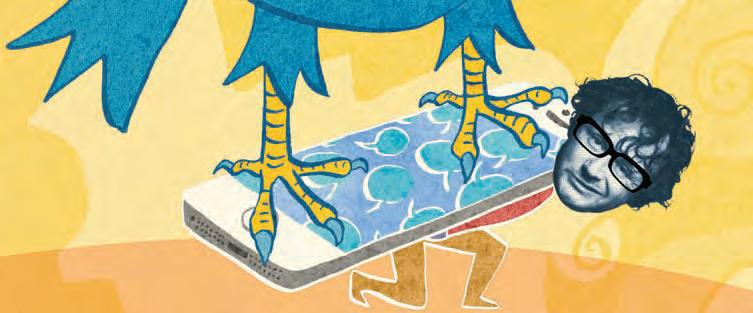
I still believe this, but I’ve found there’s another side to the constant global conversation—it’s exhausting, it’s addictive and it takes you away from the moment you’re actually in and hurls you into a never-ending digital coffee morning.
Yesterday, I came to the conclusion that, far from making me cheerful, having Twitter and Facebook available at all times on my mobile was depressing me. Instead of doing things, I was reading
me. Proportionally that doesn’t seem a lot, but imagine if you’re standing in the middle of a crowd of that many people, walking from one to the next and listening to them babbling on.
Then there’s the etiquette. It’s apparently sacrilege to “unfollow” friends. I don’t live with my friends; I live with my family. I am happy to hear about my family—and Leeds United—any time of
28 READERSDIGEST.CO.UK AUGUST 2013
Getting Off the Grid

the day. But I reserve the right to switch off from one friend for a while and listen to another one.
I’ve had three friends take umbrage at me for unfollowing them. I found a former colleague’s political smugness unbearable. Another friend, who I introduced to Twitter, was mainly promoting his alcoholic-drinks business (I don’t drink), while a third has gone to work in Australia and was constantly tweeting about Australian news. I like these people; I just don’t want to see their world on my phone all the time. Anyway, none of them is talking to me now.
libraries might not want to hear me ranting about the people who run Leeds United. So I don’t take offence if they go and follow someone else.
The key to this feeling of cheerfulness is saying no. Having the choice to stop. The Government used to recommend “Just Say No” as advice to kids to avoid taking drugs, but Twitter isn’t as addictive as opiates—you can just turn it off.

I’ve resisted the opportunity to use an app to find out who unfollows me. I understand that someone who followed me because of an article I wrote praising
I recently met a record producer from Belfast who told me that, during the whole 18 months he’d been working in Hollywood, he’d turned his phone off. The idea seemed crazy, but he says he soon adjusted to responding to people when they left their messages on an old-fashioned answerphone or with his agent. Some people even wrote letters to him. If you haven’t got a Hollywood
a liberation, says James Brown ►
29 AUGUST 2013READERSDIGEST.CO.UK ILLUSTRATED BY SATOSHI K AM BAYAS HI
It feels like I’ve taken o handcu s—focusing on what I have and not what I don’t have
agent, a husband or wife can act as message receivers for you.
When I’m in the country with my girlfriend and son, I regularly leave my phone inside. It feels like I’ve taken off handcuffs. Yesterday, instead of spending three or four hours peering at my phone, I chopped up the branches of a felled tree, I had a constructive meeting about my new house with the refurb people, and I read The Gamekeeper by Barry Hines, author of A Kestrel for a Knave (filmed as Kes), which prompted me to write to him and ask for an interview. It was a
great day—focusing on what I have and not what I don’t have.
And now it’s dawn on a bright Tuesday morning and I feel released. I’m listening to Holst’s The Planets—Jupiter, the Bringer of Jollity. And that’s something I didn’t learn from Twitter. n
James, founder of Loaded magazine, now edits Sabotage Times—an online magazine with the motto: “We can’t concentrate, why should you?” You can (still) follow James on Twitter
@jamesjamesbrown
Budding Authors, Take a Bow
This twisty tale was one of thousands submitted to this year’s 100-Word Story Competition. We’ll be featuring a commended story in the magazine every month.
 By Eddie Butterfield, Derbyshire
By Eddie Butterfield, Derbyshire
FLATMATES
They were flatmates, but they rarely spoke. They almost never saw each other.
Chris would wake up at six each morning, grab a slice of toast and be out all day at work. It was stressful, and at times like these he always worked until late.
Ben rarely got up before noon. He didn’t have strict shifts to adhere to; his business allowed him to do what he wanted, whenever he wanted. And whenever Chris got home, it was always dead silent in Ben’s room.
Chris was a detective inspector. And Ben was the killer he was trying to catch.
Eddie says: “The idea came to me while writing down thoughts for short stories. I liked the concept of having two people living together who never saw each other—almost as if each was a ghost to the other. I thought it would be interesting if there existed a hidden link between the pair, a complication that neither knew about.”
Eddie will receive a cheque for £50
30 READERSDIGEST.CO.UK AUGUST 2013
◄
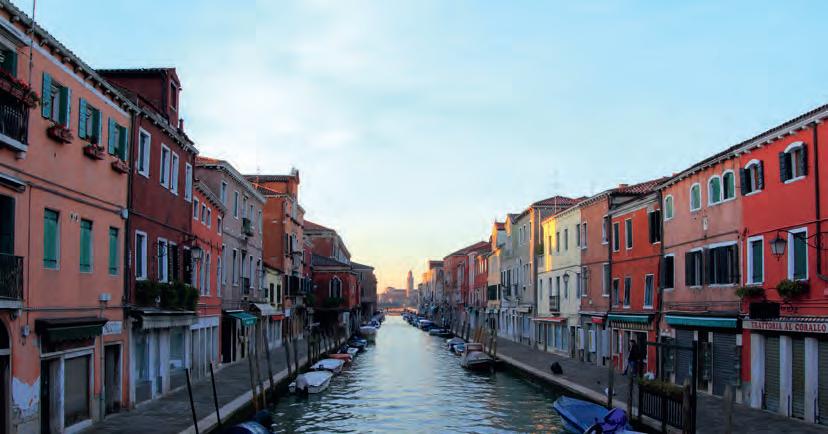

One lens for every moment

























This Tamron Megazoom lens delivers an unbeatable combination of exibility and performance.


Thanks to the 15x zoom you can choose the right focal length for every situation in no time. The VC image stabilization and the fast, almost silent PZD autofocus complete the package. The lens´ low-weight and compactness ensure that enough room is left in your travel bag for souvenirs. Available for your digital APS-C SLR from Canon, Nikon or Sony *.
* The Sony mount does not include the VC image stabilizer.


















Focal length: 18mm Exposure: F/16, 1/20 sec, ISO 320
Exposure:
1/250
320
Focal length: 270mm
F/6.3,
sec, ISO
Available from all ne camera stores www.tamron.co.uk
Di II VC
18-270mm F/3.5-6.3
PZD
www.5years.tamron.eu
Awarded by 17 leading European trade journalists Register at:
15x ZOOM
 Brenda Blethyn may be as down-toearth as the detective she portrays in ITV’s Vera —but she wishes she had her confidence
Brenda Blethyn may be as down-toearth as the detective she portrays in ITV’s Vera —but she wishes she had her confidence
‘‘There are times when I feel like a total beginner’’
Funny things always happened to Brenda Blethyn. She is, she says, just one of those people who seem to attract comedy to their lives.
Recently, for example, she was on the escalator in Marks & Spencer, Newcastle—where she films her title role in the hit ITV1 detective series Vera—when she was spotted by an elderly fan.
“She was so excited that she was turning round to look at me while running on the spot on the final stair,”
Brenda recalls. “I was thinking, Oh my Lord, she’s going to go arse over tit, so I rushed forward to prop her up. I was trying to manhandle her to safety and the two of us were sort of wrestling on the stair.
“The woman was oblivious and was saying, ‘Is it you, pet? Is it Vera? I love Vera. I LOVE her…always
BY DAPHNE LOCKYER
MIKE OWEN
► 33 AUGUST 2013RE A DER SD IG E ST.CO. UK
telling all those men what to do!’ ”
As anecdotes in celebrity interviews go, it’s not one that portrays Brenda in the most glamorous of lights. But then it’s not taking herself too seriously that has helped make her one of our best-loved character actors, starring in everything from Secrets & Lies to Pride & Prejudice. She’s also quite content to take on frumpy but winningly down-to-earth characters like the jowly, scruffy Detective Chief Inspector Vera Stanhope who, as Brenda admits, “any woman would feel beautiful next to”.
In the flesh, though, the actress is actually fine-boned and pleasingly buxom. Dressed today for our interview at ITV’s London HQ in a navy linen suit and floral blouse, she’s also both stylish and, at 67, enduringly pretty. The hair, mind you, is a bit of an issue. She’s just returned from shooting new cop film Enemy Camp in
New Mexico and still has the unflattering steel-grey hairdo needed for the role. But she has an appointment at Daniel Galvin to get the brunette reinstated the moment our interview’s over.
Despite not quite sharing Vera’s love of jumble-sale chic, Brenda’s grown very fond of the character, who solves Northumbrian murders with dogged determination and intuition.
“I’d love her as a mate; to be able to call her up and go out for a drink,” she says. “We have a similar sense of humour, and I hope that I share her kindness because I do think she has a very good heart.”
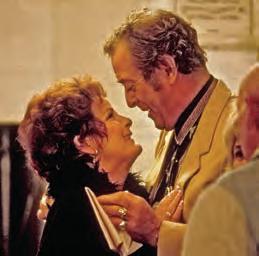


Brenda received an OBE for her acting in 2003, and Oscar nominations for Secrets & Lies and Little Voice, but doesn’t have the same amount of confidence as the detective (whom colleagues call Mussolini). “There are times even now, after all these years, when I still feel I’m a total beginner. But Michael [Mayhew, her husband] always says to me, ‘Well, it’s a lot better than thinking you know it all, isn’t it?’
“I can get in a right mood sometimes,” she adds. Those times coincide, perhaps, with being overtired or taking on the negative elements of a character she’s playing. “Michael will say, ‘Come on. Would you like me to grill you some chicken or a bit of fish?
AUGUST 2013 READERSDIGEST.CO.UK 34
MOVIESTORE COLLECTION/EVERETT/BOTH REX FEATURES
◄
Critically acclaimed: Brenda’s Oscar-nominated turns in Secrets & Lies and (above) Little Voice alongside Michael Caine
It’s only a film, you know. Ninety per cent of people in the world probably haven’t even seen one. Lighten up!’ He’ll make me laugh and I instantly feel better.”
It’s just as well that making Vera, which returns for its third series this month, is such a happy experience. “It’s got to the point now where it feels like family. The same cast and crew return each year.”
She and Michael own houses in Ramsgate and London, but they plan to put the latter on the market shortly and
Tyneside terriers: Brenda as Detective Chief Inspector Vera Stanhope, with David Leon as Sergeant Ashworth

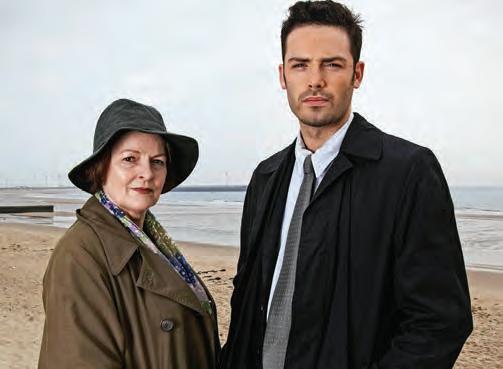
It’s enduringly popular too—Brenda finds it particularly satisfying that police officers tell her they like its authenticity—and ITV has already commissioned a fourth series, which is filming this summer. It does, however, take five months to make, during which time Brenda stays in Newcastle. It’s a long time to be separated from her real loved ones and, unlike Vera, who’s “a complete loner, but never lonely”, Brenda needs the company of others.
“So this time around, instead of staying in a hotel, I’m renting an apartment so that Michael and other members of my family can come and stay,” she says. “I’m really looking forward to it.”
Brenda has dipped a toe in Hollywood, appearing in movies such as Robert Redford’s A River Runs Through It as early as 1992. But this need to be around her favourite people and places has stopped her moving there properly. “I spend so much time away working already, and when it’s finished I want to go home,” she says. “And England is home to me.”
move lock, stock and barrel to the Kent seaside resort, where Brenda grew up.
“I’m going to be by the sea and that’s all there is to it,” she says. “There are so many echoes of people who aren’t alive any more—my mum and dad and two of my siblings. It comforts me and makes me feel close to them still.”
She takes a surprisingly active part in the local community. One recent honour bestowed upon her is president of the Thanet Male Voice Choir.
“I haven’t been able to go to the concerts because I’ve been away. But I recently turned up at a rehearsal and it was heaven. I had two hours of private performance. There were about six retired policemen in the choir. They said, ‘Should we call you Ma’am or Brenda?!’ ” she laughs.
She’s also patron of the Ramsgate & Broadstairs Sea Cadets. “I was giving
►
35 AUGUST 2013READERSDIGEST.CO.UK
HELEN TURTON/ITV
out the awards at their prize-giving just a couple of months ago,” she says.
Last year, she learned that they had only one small boat for the whole company to practise their rowing skills. “I felt bad about it, so I said, ‘Oh, go on then, I’ll buy you another one. But don’t make a song and dance about it!’ Anyway, it still ended up in the local paper and I was a bit mortified. But the good thing was that someone saw the story and decided to donate another boat too. So now they have three of them!”
working-class Catholic family, she has “loads of nieces and nephews”, and is close to them all. Among her strong views about young people, she thinks it’s a shame that so many go into acting now as a short cut to fame.
“When I joined the profession I wanted to learn my craft and work in the theatre.


She’s delighted to put both her mouth and money behind a charity that supports local young people. “It’s not just about learning nautical skills. They’re also taught how to play musical instruments and become part of a team. The more able help the less able too, so they develop patience and tolerance. It’s a lot better than leaving them to spend hours on Facebook in their bedroom or hanging about on street corners.”
She has happy childhood memories of riding to the seafront on the handlebars of her older brother’s bike, but says, “We’d be watching out for the local policeman because he’d have given you a right ticking-off if he’d seen you. In those days you’d call a policeman ‘Sir’. Nowadays, some youngsters don’t seem to give a toss. If I misbehaved as a kid I’d have been given a clip. Too right. But the sea cadets are incredibly disciplined, wellbehaved and respectful.”
Though she never had children herself, as the youngest of nine kids in a
I never thought that one day I’d be in movies or on the telly.”
She didn’t even become an actress until she was in her thirties, working first as a secretary for British Rail, then having an epiphany after splitting up with her first husband Alan Blethyn. And she’s very happy about that.
“I suppose if I’d suddenly become famous when I was in my twenties I might not have handled it too well,” she speculates. “I mean, I wouldn’t have had me—if you know what I mean—to advise me. That inner voice I have now that tells me where to go and what to do or what’s important.”
Clearly not one to hurry life’s big moments, she was in a relationship with Michael for 35 years before they finally married in 2010.
RICHARD YOUNG/REX FEATURES ◄
AUGUST 2013 READERSDIGEST.CO.UK 36
With Michael Mayhew, Brenda’s husband of three years—and partner of 35
“Well, we wanted to be sure,” she jokes. “But seriously, you get to a certain age and some of your friends start popping off and you think, Well wouldn’t it be awkward, legally, if I went or you went and we’d never married?
“So, really, we didn’t marry for romantic reasons and yet it did turn out romantic in the end because I discovered that I love being Michael’s ‘lawful wedded wife’. I love the sense of belonging.”
She’s all for two people—whether gay or straight—entering into a contract to spend their lives together. “What could be wrong with that? If you were going into business with someone, you’d want a contract. How much more important is it when you’re investing everything— financial and emotional—in your personal life? I don’t really understand the difference between [gay] marriage and a civil partnership, though. To me the difference is really just a word. In every other way it’s the same thing, isn’t it?”
She expects to be with Michael until death doth them part, “although hopefully, we’ll have many years to look forward
Burger Off!
to”. And neither Brenda nor Michael—a graphic designer—is planning to retire.
“The last time I said I was thinking about it, I got a ton of job offers,” she laughs. “Somewhere in the back of my mind, though, I do think it might be nice to do nothing for a while. Just potter around. I’d probably get involved with amateur dramatics in Thanet. Start a little theatre group,” she says, looking awfully cheerful at the prospect.
She’s cheerful too about her looming 70th birthday. “Why worry?” she says. “I’m 67 now and I’ll be 70 then. It’s just a number and, besides, my brothers are all past that age and are hale and hearty.”
Seventy, she continues, will be, a “right adventure. I remember talking to one of my nephews just before his eighteenth and he said, ‘I don’t know what it’s going to be like, I’ve never been 18 before.’
“Now I feel the same way. I’ve never been 70 either. But life’s a learning curve at every age. And that’s what keeps it interesting.” n
Vera starts this month on ITV1.
Transcript released this year by the police to highlight abuse of the emergency helpline by the public:
Operator: “Police, emergency.”
Caller: “Hi, it is a bit of an emergency, but it isn’t at the same time. Basically, I’ve come into McDonald’s and we’ve bought some food and there’s been a misunderstanding. We drove back around and none of the members of sta are coming to the till—they’re just ignoring us. So we’ve decided to stop in the drive-thru now, but there are 20 cars behind us…”
Operator: [interrupting] “This isn’t a police matter, sir.”
Caller: “It’s not, is it?”
Operator: “No, not at all.”

37 AUGUST 2013RE A DER SD IG E ST.CO. UK

For most of us, it’s an almost legendary crime. For Nick Reynolds, it marked the start of an extraordinary childhood
MY DAD,

THE GREAT TRAIN ROBBER


AS TOLD TO CRISPIN ANDREWS
38

On August 8, 1963, a gang of 15 men stopped the Glasgow to London mail train near Cheddington, Buckinghamshire, by tampering with a signal. They stormed on board, stole a record haul of £2.6m cash (the equivalent of more than £40m today)—and claimed a place in history. Soon afterwards, gang leader Bruce Reynolds went on the run with £150,000, his wife Frances and his toddler son Nick. Fifty years on—and just a few months after Bruce’s death—Nick takes up the story... ►

The robbers unload the cash, as re-enacted in a forthcoming BBC drama, starring Jim Broadbent
39
‘‘
WE LAID LOW IN ENGLAND for about a year after the robbery, at friends’ houses in the country and at a place Dad bought in Albert Mews, London.
But he always planned to go abroad. It was what he did after a big job— usually to the south of France. This time, however, we had to get further away. By April 1964, 11 members of the gang had been caught and given severe sentences of up to 30 years in jail. Dad’s face was all over the papers.
So he headed out to Mexico—flying from Belgium to avoid the authorities, using a fake name and passport—and Mum and I joined him shortly after.
In Mexico City, we were legit. The locals accepted Dad’s story that he was a successful British businessman. After all, he had the money to prove it. And though he’d had a few disguises over the years—a beard, bald head, long hair— people recognised him by his glasses, so all he had to do was take them off. He bought a franchise to sell Dunhill products—a straight job—and we rented a penthouse apartment from the president of the Bank of Mexico’s son.
Life on the run was one big holiday. My memories are like watching a badly edited Super 8 film, but I can recall watching, through the glass bottom of a boat, Dad scuba-diving off a reef in Acapulco. And I can remember him deep-sea fishing for marlin, and jumping off the diving board at the Acapulco Hilton pool. He was a living, breathing action man. My best friend.
With Dad confident that the police didn’t know where we were, we drove all over America, following routes through the Wild West that outlaws like the James gang had once taken, and we went to places like the Alamo and Tombstone, Arizona, where the Gunfight at the OK Corral took place.
“Cowboy novels inspired my dad to be the criminal lunatic that he was”

“Dad’s face was in all the papers”: the picture of Bruce Reynolds released by police
40
Reading cowboy novels as a kid had inspired my dad to be the lunatic criminal that he was. His nickname was John West. He could break open safes like sardine cans. Three months before the train robbery, his gang robbed a payroll truck at Heathrow, getting away with £62,000. He did it for the buzz as much as the money.
I OFTEN HAD A NEW PASSPORT.

‘This is your name now,’ I was told. But it never really bothered me. One time I got separated from my parents at a festival and the Tannoy announced that a little boy who didn’t know his name was lost. My parents knew it was me. I did know my name, I just didn’t want to tell anyone.
We were in Mexico for three years, then Dad’s fellow gang member Buster Edwards came to visit. People started wondering why my dad had such a cheeky chappie for a friend. Nigel Havers with Del Boy didn’t add up. And the British police had traced calls from Buster’s wife to Mexico, so when Buster later gave himself up, the press speculated that he had been out there with Bruce. One night, we upped sticks and legged it to Canada.
In Montreal we stayed with Charlie Wilson, another train robber. Charlie had three girls, so I had company, and we were settled for about a year. But an alarm bell went off in Dad’s head, when he went in three times to get Canadian citizenship and they were messing around, saying they couldn’t find his application form. We scarpered overnight. ALEX
Not long afterwards, Charlie had 50 Canadian Mounties outside his house. Also there, to bring Charlie back to Britain, was my dad’s nemesis, Detective Chief Superintendent Tommy Butler— Scotland Yard’s old Grey Fox, who was leading the hunt for the robbers.
Next, we went to France, then back to Britain, to Torquay. Dad needed money and thought things had died down enough for him to sneak in, do a job and then clear off again.
BUT SIX MONTHS LATER, IN NOVEMBER
1968, I opened the front door one morning and about 100 policemen came steaming in. Someone had recognised Dad.
I was seven. Tommy Butler let me have a final word with Bruce. ‘Dad’s been a naughty boy and is going away for a long time,’ he told me.
Then they took him off. I was sitting in the back of a police car with my mum, crying her eyes out. She thought he was smarter than the Old Bill, and had a charmed life. He got 25 years. The same as a murderer. ►
41 AUGUST 2013READERSDIGEST.CO.UK
WOODS/REX FEATURES
Nick Reynolds, Bruce and Nick’s sculpture of Bruce at an exhibition in 1999
My life was messed up. I’d lost my dad. My mum cracked and was never the same again. I was sent to a boarding school— Dad had some money tucked away and Mum sold her story to the papers for £30,000—where prefects threw darts at you. I even had a new name. Having a villain for a father wasn’t cool then. Had anything gone missing, the train robber’s son would have got the blame.
Yet, though Dad ended up doing ten and a half years, he pretty much programmed me to be the person I am today. He sent postcards from prison telling me about the latest art: I’m a sculptor. He loved music and built me a guitar in the prison workshop: I’m in a band, Alabama

3 [most famous for “Woke Up This Morning”, the theme song for The Sopranos]. We’re rereleasing a cover of the song “Have You Seen Bruce Richard Reynolds?” for the 50th anniversary of the robbery, actually. He wanted to join the navy, but his eyesight wasn’t good enough. I spent seven years in the navy as a diver in the late Seventies and early Eighties.
Everything he wanted to do but couldn’t, I’ve done—the best way I could get him to be proud of me.
“I FOUND THE ROBBERS’ LAIR”
JOHN MARIS WAS A HERDSMAN AT LITTLE LONDON FARM, NEAR OAKLEY, BUCKINGHAMSHIRE
Four days after the robbery, I was in a field with the cows when I decided to look round the neighbouring Leatherslade Farm. The previous week, I’d seen a Land Rover full of men going up there, even though the owner, Mr Nixon, had sold up and moved out. I’d assumed they were builders. But now the police said they were looking at farms within 30 miles of Cheddington as potential gang hideouts.
The curtains were blacked out. There was a coil of rope outside the door and a lorry under a tarpaulin. I just knew this was the hideout.
I told the police, but nothing happened. Then, that evening, a car whizzed towards Leatherslade and tooted
“I WAS A LOCAL BOBBY”
ROY WILCOCK WAS A RECENTLY QUALIFIED POLICE CONSTABLE, WORKING IN AYLESBURY, SOME TEN MILES FROM CHEDDINGTON
We were sent out in teams of six to look for the suspects, with booklets containing their photos. You had to watch who you showed them to, or some busybody would tell you that some local so-and-so looked like one of the robbers. Everyone in Aylesbury wanted to know what was going on. You couldn’t even go for a drink without people throwing questions at you.
42 READERSDIGEST.CO.UKAUGUST 2013
◄
Nick at his father’s funeral, March 2013
THE ROBBERY
MEMORIES OF
’’ REX FEATURES
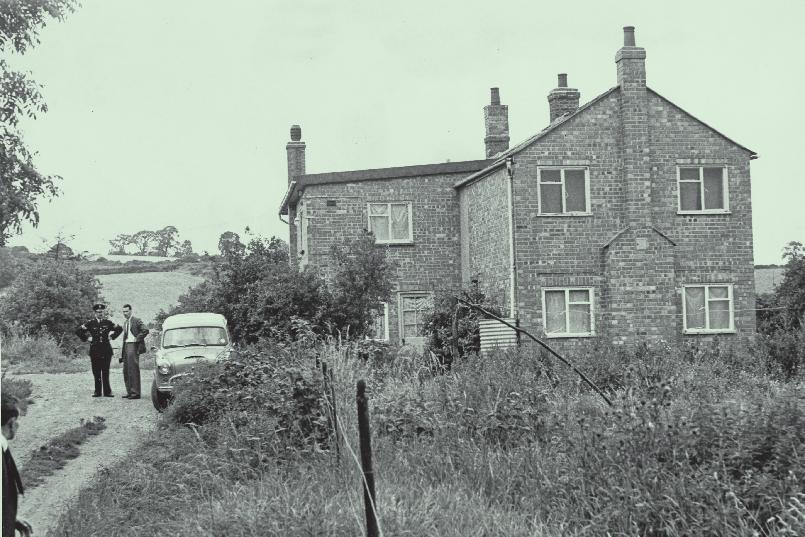
Den of thieves: the hideout is discovered
three times. I rang the police again and this time two o cers did arrive. Within hours, the police and press were all over the place.
The robbers had fled, but they’d left fingerprints, along with mail sacks and bank-note wrappers. I got an £18,000 reward. It bought me a house and put my two children through university!
I also got threatening letters. One had a co n with my name on it. My wife and I bought an Alsatian and I hid some pickaxe handles. Luckily, I didn’t have to use them.
It’s since been reported that the robbers were planning to burn down Leatherslade. If I hadn’t found it when I did, the Great Train Robbers may have escaped prosecution.
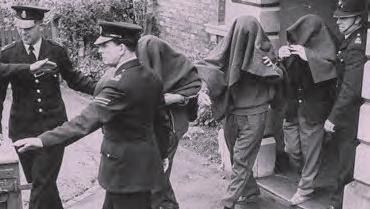

After Leatherslade was discovered and most of the suspects were captured at various locations, I took two of them to Linslade magistrates’ court for their first hearing. Feeling right sorry for themselves, they were. A photographer took a shot of us that ended up in the News of the World. I’ve still got the cutting.
“I PHOTOGRAPHED THE CRIME SCENE”
BARRY KEEN, FORMER BUCKS HERALD SNAPPER
Maurice Cousins, the Herald’s lead photographer, got a tip-o at 6am: there’d been a train robbery—get over to Cheddington. He took some photos of a broken train window and came back to Aylesbury, not realising what he had. Then the national press arrived and I went out to get some more pictures of the scene.
Obviously, it was our lead story that week. But the day the police found the hideout, I was in a nearby village, taking a picture of a donkey that drank gin and orange. I’d taken the van, so Maurice and the reporters had to get cabs out there. I followed. The police wouldn’t let us inside, but we got shots of the hole in the lawn where the gang had tried to bury the mailbags.
By the third week, the police had made more arrests and the town was buzzing. They’d got £30,000 of the stolen money back too.
It was the biggest story I ever covered. We were very much a local paper and, by week five, the town centre’s projected redevelopment was on the front page.
Aylesbury is known for ducks and the Great Train Robbery. It was great to
Great Train Robbery. It was great to be part of it.



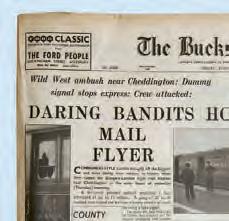




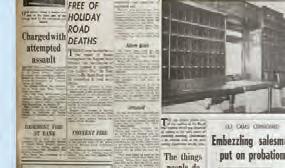




DAILY MAIL/REX FEATURES DENNIS OULDS/GETTY IMAGES; BUCKS FREE PRESS
Nicked: robbery suspects at Linslade Magistrates’ Court
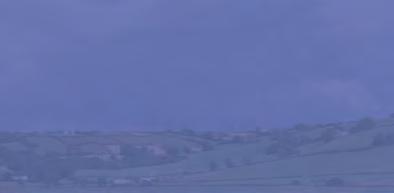
THE DYLAN THOMAS BOATHOUSE, WALES

“This tumbling house,” wrote the poet Dylan Thomas in 1952, “whose every pane and wind-whipped-o slate, childscrawled wall, rain-stain, mousehole, knobble and ricket, man-booby and rat-trap I know in my sleep.” He was talking about the Boathouse in Laugharne, where he lived with fiery wife Caitlin from 1949 (it was bought for them by his patron Margaret ►








Homes of Writers &Artists



A source of inspiration, or a place to reflect on the life and work? Whatever your feelings, the summer months are a perfect time to visit the houses once lived in by our literary and artistic giants
BY LOLA BORG
BESTof BRITISH
45




Taylor, wife of the historian
A J P Taylor). They’d always longed to own the beautifully located house, but it was damp and impractical, and Caitlin quickly tired of village life.
Thomas, a former hack on the South Wales Evening Post, wrote Under Milk Wood here while sitting in a “wordsplashed” garage on the cli edge with views of the Taf estuary. Caitlin and the children would listen to Thomas’s broadcasts from the US on the living room radio, which is still here.
Drink took Thomas in the end—he died in New York’s Chelsea Hotel in 1953, “after 18 straight whiskies” (his words), but is buried in St Martin’s Church in the village, with Caitlin alongside him. Open 10am–5.30pm, with shorter hours in winter.
Entrance: £4.20 for adults, £2 for children (dylanthomas boathouse.com)
JANE AUSTEN’S HOUSE MUSEUM, HAMPSHIRE
Jane Austen finally put her pen down on Pride and Prejudice 200 years ago, and since then an entire industry has sprung up around the writer, her novels and the TV and film adaptations. So it’s easy to forget, with all the anniversary hoopla this year, that Austen was a brilliant writer.

a patchwork quilt she worked
For those who want to find the home of the brouhaha, this red-brick, six-bedroom Georgian “cottage” is the house she lived in for the last eight years of her life—and her most famous works were either written or revised here. There aren’t a vast amount of personal belongings, but one highlight is the modest writing table (right) where Emma and Persuasion were written, and a patchwork quilt she worked on. It doesn’t take long to tour the house and take “a turn about the gardens”—as she might have said.

house and take “a turn about the gardens”—as she

Open 10.30am–5pm (July/August).
Entrance: £7.50 for adults, £2.50 for children (jane-austens-house-museum.org.uk)

46 READERSDIGEST.CO.UK AUGUST 2013 (OPENING SPREAD) STEPHEN SPRAGGON/GETTY IMAGES
◄

CHARLESTON, SUSSEX
The shenanigans of the Bloomsbury Set in the early 20th century never fail to fascinate, which is why people flock to a smallish country house with a walled garden a few miles outside Brighton. This idyllic cottage was the family home of artists Vanessa Bell and Duncan Grant, and later became their summer retreat, where they held legendary bohemian house parties—guests included everyone from E M Forster to John Maynard Keynes (who had his own room and would spend weekends unwinding here after advising the government on fiscal policy), and, of course, the writer

Reader’s Digest co-founder Lila Wallace donated £50,000 in 1981 to help save Charleston for posterity.
and intellectual Virginia Woolf, Vanessa’s sister. Rooms are dark and poky, and the colours have faded, but the house still summons up avant-garde artiness, with interiors individually—some might say garishly— decorated by Bell and Grant. Guided tours are long and over-structured, giving the sense of a shrine rather than an interesting house—it’s best to visit on a Sunday, when visitors are free to wander. There’s also an excellent shop and tea room, and the guidebook has a helpful chart of who slept with whom.
Open Wednesday to Friday. Entrance: £9.95 for adults, £5.95 for children (charleston.org.uk)
AUGUST 2013READERSDIGEST.CO.UK 47
VISITBRITAIN/BRITAIN ON VIEW/GETTY MAGES
►
Left: portrait of Vanessa Bell by her lover Duncan Grant

DOVE COTTAGE, CUMBRIA
The romantic poet William Wordsworth moved around in Cumbria, but this small former pub in Grasmere (in his words, the “little unsuspected paradise”) is the place most associated with him and his sister Dorothy. They lived a simple existence here for nine years, and today it has a museum next door.
Dove Cottage is where Dorothy wrote the Grasmere Journals—a vivid picture of their domestic life—and Wordsworth his most famous works, including “The Prelude” and “I Wandered Lonely as a Cloud” (visitors can see the journal entry that records the day in nearby Ullswater where they saw the da odils that inspired the latter poem). There’s such a scrum of visitors to Dove Cottage, especially in summer, that it’s a leap of imagination to summon up a sense of tranquillity, although there are free poetry readings on Monday afternoons.
Open 9.30am–5.30pm, with shorter hours in winter. Entrance: £7.50 for adults, £4.50 for children (wordsworth.org.uk/visit/dove-cottage)
BARBARA HEPWORTH MUSEUM AND SCULPTURE GARDEN, CORNWALL a
Barbara Hepworth, one of our most prominent 20th-century sculptors, first came to St Ives with her artist husband Ben Nicholson and their triplets in 1939, to escape wartime London. She was drawn by “the quality of light and colour, which reminds me of the Mediterranean”. A decade later, she bought a home with studio space, a garden and views of Porthminster beach, which is now a museum dedicated to her life and work.




and wander the lush, subtropical gardens (designed where she placed them. She lived and worked here
Visitors can peek through the windows of her studio and wander the lush, subtropical gardens (designed by Hepworth) containing her sculptures—still exactly where she placed them. She lived and worked here from 1949 until 1975 when, smoking a cigarette in bed, she accidentally caused the fire that killed her.
Open from 10am–5.20pm, with shorter hours from November–February (closed Mondays). Entrance: £6.60 for adults, free for children (tate.org.uk/visit/ tate-st-ives/barbara-hepworth-museum)
£6.60 for adults, free for children (tate.org.uk/visit/ ►
READERSDIGEST.CO.UK AUGUST 2013 48 VISITBRITAIN/BRITAIN ON VIEW/GETTY MAGES
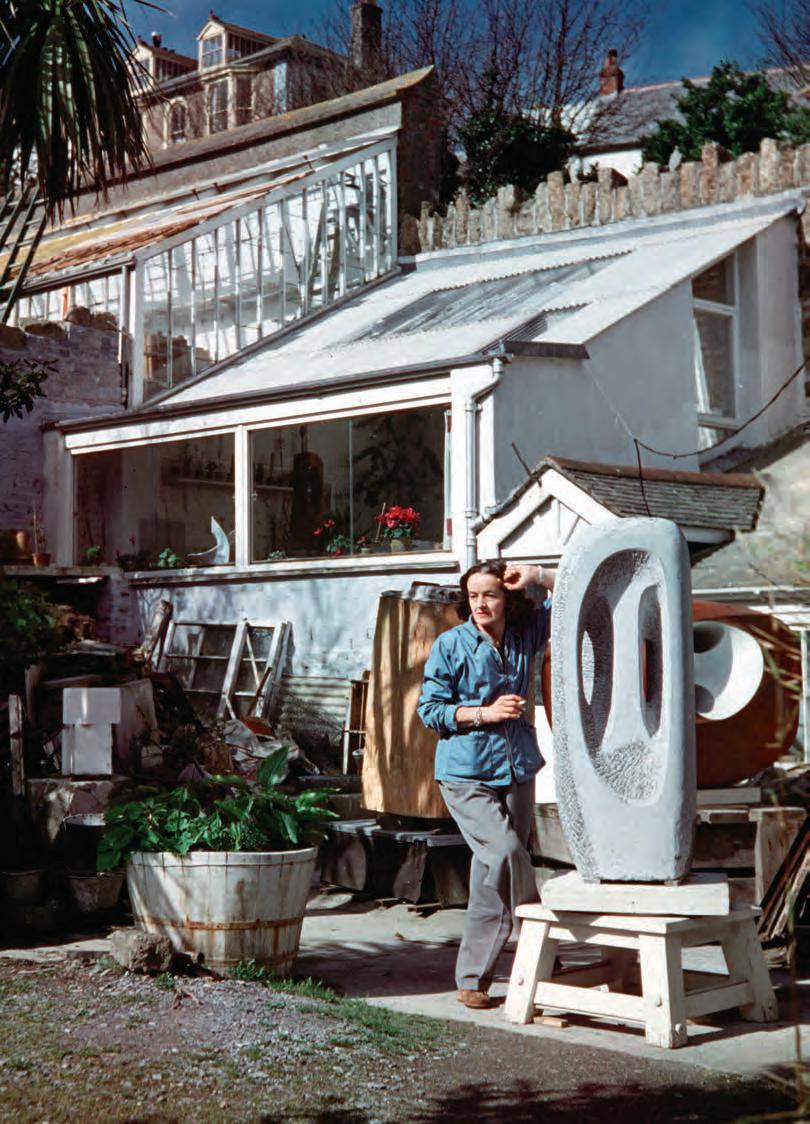



PAUL POPPER/POPPERFOTO/GETTY IMAGES
Barbara Hepworth at work. “Finding Trewyn Studio was a sort of magic,” she wrote
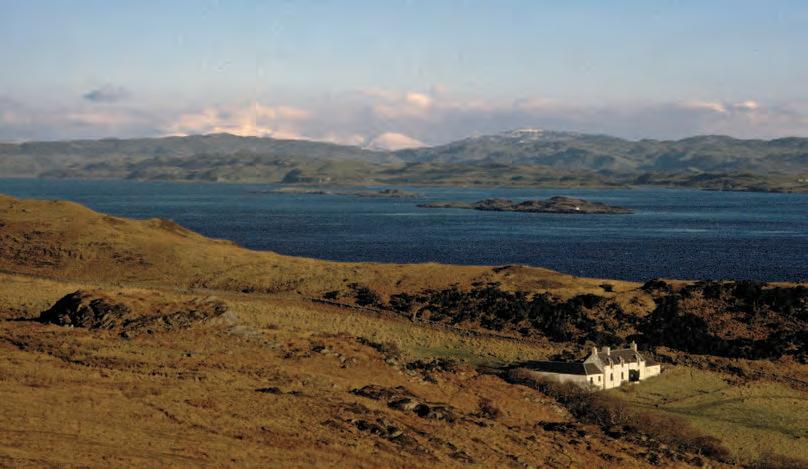
GEORGE ORWELL’S NINETEEN EIGHTYFOUR HOUSE, SCOTLAND


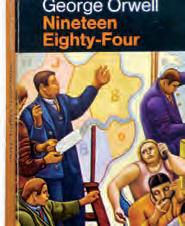
Jura, o the west coast of Scotland, is the island to which George Orwell, on the recommendation of his Observer editor David Astor, retreated to write Nineteen EightyFour and to get away from the demands on his time in London after the success of Animal Farm. Orwell stayed in a remote farmhouse, Barnhill, seven miles outside Ardlussa at the northern tip of the island and five miles from the nearest road.







Recently widowed (his wife Eileen died during a routine gynaecological operation) and a single parent to his three-yearold adopted son, Orwell, who wasn’t in good health, spent a “quite unendurable
winter” (in his words) without electricity on Jura in 1946, during which he worked feverishly. He was famously impractical, but his sister Avril eventually arrived to take care of him. An incident at the nearby infamous Corryvreckan whirlpool almost killed him (after his boat capsized, Orwell and his party were rescued by passing lobstermen).
Jura worked feverishly. He was his sister Avril eventually him (after his boat capsized,
A shrine for Orwell fans, the area has changed little since 1946 and there’s nothing to indicate Orwell lived here. He interspersed his trips to Jura with time in his “bleak” Islington flat in 27b Canonbury Square (which is not at all bleak these days). By the end of 1948 he had finished Nineteen Eighty-Four and went straight from Jura to a TB sanatorium.
Barnhill can be rented out as a holiday let—prices start at £600 a week (escapetojura.com)
50 READERSDIGEST.CO.UK AUGUST 2013 PETER BOWATER/ALAMY
THE BRON TË PA RSONAGE MUSEUM, W EST YORKSHIRE
Haworth, a cobbled village in Yorkshire was an unlikely hub of Victorian creativity. During their short lives here, the Brontë sisters wrote several classics of English literature (Wuthering Heights, Jane Eyre) while fighting for space at just one table in the dining room at the village parsonage.

Haworth was on the literary map even when the Brontë sisters were alive—all three had published novels by 1847. The museum gives a sense of family life and contains many artefacts, including the portrait of the three sisters by brother Branwell and the blue sofa where Charlotte allegedly lay down and died. Adjacent to the house is the village graveyard, which means that even on the sunniest day the parsonage can seem a tad gloomy.
Open 10am–5.30pm in summer (11am–5pm in winter).
Entrance: £7 for adults, £3.60 for children (bronte.org.uk)

THE CHA RLES DICKENS MUSEUM, LONDON
Down a side street in Bloomsbury, close to Lincoln’s Inn Fields, is the house Dickens lived in from 1837 for two years—not long, but he did write Oliver Twist and Nicholas Nickleby here. Reopened last year after a £3.2m revamp, it recreates the family living space as it would have been, including bedrooms, living room and kitchen. Dickens took a keen interest in interior design, chose the precise shades for decoration and rearranged the furniture wherever he stayed, even if it was just for one night.
It’s immediately apparent that Doughty Street would have been a squeeze for his growing family (two daughters were born here), which included sister-in-law Mary, who died in Dickens’s arms just six weeks after they moved in. Dickens was traumatised by her death, took her as the model for Little Nell and wore the ring he took from her finger for the rest of his life.
Open 10am–5pm every day. Entrance: £8 for adults, £4 for children (dickensmuseum.com) n
Do you have a favourite location with a literary or artistic association? Please tell us about it. Send an email—with a picture if possible —to theeditor@ readersdigest.co.uk.
51 AUGUST 2013READERSDIGEST.CO.UK
NE XT MON TH: FOOTBA LL STADIUMS
VISITBRITAIN/BRITAIN ON VIEW/GETTY IMAGES; MARK SUNDERLAND/AGE FOTOSTOCK/GETTY IMAGES
A Life Less Ordinary
You may know her from numerous TV dramas. But actress Kika Mirylees also plays a much more surprising role— involving horses, footballers and drugs
 BY CRISPIN ANDREWS
BY CRISPIN ANDREWS
PHOTOGRAPHED BY
JAMES ECKERSLEY
52 READERSDIGEST.CO.UKAUGUST 2013
HORSES FOR COURSES
For a resident of rural Surrey, Kika Mirylees has led a very full life. She’s dated her son’s best friend, killed a corrupt prison officer and once sat in a spaceship’s toilet with her pants round her ankles.

A couple of years ago, she also tried to get Paul Gascoigne to walk a horse across a field, without either the animal or the troubled former footballer
53 ► AUGUST 2013READERSDIGEST.CO.UK
►
freaking out. And that—unlike her respective roles in EastEnders, Bad Girls and Red Dwarf—wasn’t for a TV show.
For as well as being a well-known actress (you’re most likely to recognise her as Bad Girls’ Julie Johnston, one of the “Two Julies”, who knifed the evil screw Jim Fenner), Kika runs inspirational equineassisted psychotherapy (EAP) sessions that have helped dozens of sports stars deal with alcohol, drug and gambling addictions. By showing her clients—mainly footballers, but also cricketers, rugby players and golfers—how to handle horses, she teaches them how to believe in themselves, build trust with others and develop self-control.
“People with addictions tend to dwell too much on the past, or their problems,” says Kika, 59. “With a horse to look after, you have to stay in the moment. You have a much bigger immediate problem.”
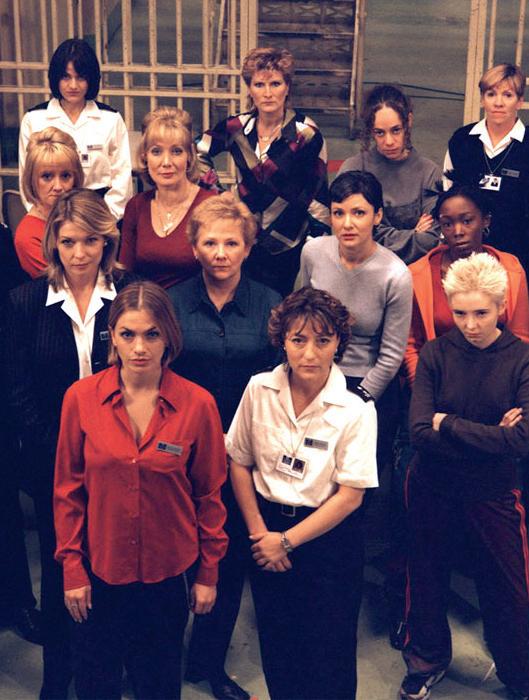
For the last ten years, her EAP sessions have formed a crucial part of the treatment programme at the Sporting Chance Clinic, based in Liphook, Hampshire.
Kika first rode a horse when she was six. Her mum Sheila taught riding at Little Abbey Prep School in Liss, Hampshire. She remembers “going out bareback in the evenings, flying through the fields at 100 miles an hour with some crazy creature under me”.
But Kika couldn’t afford her own horse until 23 years later when, after training as an actress, she started getting TV work (from C.A.T.S Eyes to Lovejoy) and made
a success of a high-end catering business she’d bought from a friend.
That first horse, Purdy, cost £2,000. “It should have been £1,200,” says Kika. “The dealer saw me coming. Anyone could see she wasn’t a thoroughbred.”
But though the animal bolted everywhere and terrified Kika, it taught her an early lesson about how dealing with a horse could lead to self-improvement.
“She wouldn’t listen. I was so nervous about riding her in the morning, I couldn’t eat my breakfast. But it wasn’t Purdy’s fault—it was mine.”
Kika realised that by composing herself and confidently leading the horse back
54 readersdigest.co.uk august 2013
◄
As Julie Johnston in ITV’s Bad Girls…
and forth to the stables four times when it played up, she could take charge. Purdy never misbehaved with Kika again.
By the early Nineties, Kika had got roles in The Darling Buds of May and Strathblair, a BBC drama about post-war Scotland. She bought more horses and soon qualified as a trainer, after witnessing the woman she’d employed to train her animals scream and shout at one, just because it went over a little jump without permission. “She tried to crush such a joyful spirit. Appalling. I wanted a different way.”

The athletes don’t ride the horses, but walk them through various activities and over small jumps— sometimes blindfolded, so the horse leads. During sessions, Tony and Kika talk with clients about issues that arise, then feed back to other Sporting Chance counsellors.
Inevitably, not every client turns up in the right frame of mind.
Adopting the methods of famous US trainer Monty Roberts, author of The Man Who Listens to Horses, she developed a local reputation for training difficult or mistreated animals by connecting with them emotionally, rather than browbeating them. So when psychotherapist Tony Sabey approached her to start up EAP addiction courses with him in 2003, she was keen to apply all that she’d learned about horses and their effect on humans, and jumped at the chance.
Since then, Kika has helped more than 300 sports stars at her paddocks on the edge of the South Downs. Each client has two or three sessions as part of their Sporting Chance treatment, which also include yoga, talking therapy, personal training and golf, all of this is designed to get them to examine their lives, learn self-discipline and, in the case of scuba diving, breathing techniques that can keep them calm.
“ ‘I don’t trust anyone, no one trusts me, and that’s it.’ ” Kika puts on her best Liver Birds accent to recount what one man, a burly footballer who’d turned to drink after a tough childhood, told her a few minutes after arriving for his first session. He’d not been out of the city that much and there he was, up to his ankles in the sort of mud last experienced by soccer stars at Derby County’s Baseball Ground in the 1970s.
The big Liverpudlian, who’d never seen a horse in the flesh, had been paired up with Gracious, a feisty mare who, says Kika, doesn’t like being touched and can get “arsey”. At first, he wanted nothing to do with her, but he gradually mellowed and it soon became clear she was the perfect horse for him.
“He was stroking her all over, part of the getting-to-know-you process. Then, as she does, Gracious tried to bite him,” Kika says, before reverting back into comedy-Scouser mode. “ ‘Oh Gracie, don’t do that, you’ll hurt me,’ ” she recalls the footballer saying. “Then the horse tried to kick him, and he was all: ‘Gracie, watch where you’re putting your leg, Gracie.’
“Horses are prey animals in the wild, ►
55 ► AUGUST 2013READERSDIGEST.CO.UK
…and as Hazel Hobbs in Eastenders

No more long faces. Connecting with horses such as Gracie (left) and Lizzie can help those struggling with addiction and depression
so they pick up on body language, emotions, even fast breathing—anything they associate with aggression. Gracie will only cooperate if she trusts you and you trust her.”
But, says Kika, this skittishness can make her clients realise that they’re coming across as anxious or agitated and moderate their behaviour accordingly.
So before long, he was walking Gracie around the field, his arm round her, talking the whole time to reassure her. “ ‘Hey, Gracie, look at those sheep in that field over there,’ ” Kika remembers him saying. “It was as if he was taking a stroll with a girlfriend. ‘Where’s my Gracie?’ he’d say, whenever he came back.”
If clients like this have to be patient and control their emotions to get a horse
to do what they want, they learn that, when other problems arise, there’s an alternative to lashing out.
Horses can also inspire clients to open up. Kika remembers a young footballer who was battling drug use and depression and didn’t speak much. He chose Maron, another temperamental horse, but for the first week the animal cooperated. “Went OK,” the sullen teenager told his Sporting Chance counsellor. “Don’t know why. Nice horse.”
The following week, however, the animal didn’t want to know and the counsellor asked why.
“Don’t know…just…wouldn’t do anything,” he replied.
“How did that make you feel?”
56 READERSDIGEST.CO.UKAUGUST 2013
◄


“What I do gives a hand up. From there on, it’s up to them”

“Well, you know…”
Kika says that the lad just erupted. “I’ll tell you how it made me feel. I really liked that horse. He’s a beautiful bloody horse. He liked me and I liked him. And he’s just like my bloody father. He ignores me. I love my father and he’s ignored me all my bloody life.”
The real reasons for the footballer’s problems poured out—how his father had apparently seen him as worthless. Now the Sporting Chance counsellor could really start to help.
“Working with the horse had triggered change,” says Kika. “That [boy] didn’t come back. There’s always something unhappy behind addiction. Being a human isn’t easy and it’s good to be able to help. But I’m not a fixer. What I do gives a
hand up. From there on, it’s up to them.”
Client confidentiality being all, Kika doesn’t usually get to hear exactly what’s happened to people after she’s helped them. She couldn’t help Gazza—he couldn’t cope with the horses—and not everyone beats their demons. But Sporting Chance, set up by former footballer Tony Adams, has an overall success rate of more than 50 per cent—far better than other treatment programmes.
ing Chance, set up by former footballer
Kika manages to fit both horses and acting into her life. “It works best when I’m in a play in London. Horses in the morning and work in the evening.”
But she gives short shrift to any smartalec clients with Two Julies jokes. “Yes I do [act],” she tells them. “But today, we’re doing this.”
Kika and her colleague Julie Hanly recently set up Equine Alchemy UK, and are looking to collaborate with other counsellors to set up support groups for people with other emotional problems. Kika also hopes to go to Cape Town to work with Stacey Doorly-Jones, who runs sessions for township youngsters, using mistreated horses. She’s back on TV later this year too, in BBC1’s New Tricks. Perhaps a bit of equine therapy might keep cop Gerry Standing, played by Dennis Waterman, out of the gambling dens… ■
Visit equinealchemy.co.uk and sportingchanceclinic.com.
Fun Fact: Battle of the Sexes Revisited
Here’s something to tell your chatty female colleagues: research from the US reveals that women speak about 20,000 words a day—13,000 more than the average man—due to higher levels of the “language protein” Foxp2 in the brain.
57 AUGUST 2013READERSDIGEST.CO.UK

From low-flying planes to high-volume headphones, the din of modern life is taking a surprising toll
C’MON FEAR THE NOISE
BY LYNNE WALLIS


Peace and quiet are starting to feel like things of the past.
A few decades ago, we woke up to tinkling milk bottles or birdsong. Now it’s the first traffic drones of the morning. Going to work, we endure thundering buses, other people’s tinny headphones and constant train announcements. And when we reach the relative quiet of the office, someone spoils it by switching a radio on. Then there are planes, loud parties and your next-door neighbour tramping across her new wood flooring while you’re trying to sleep…
It’s hard to measure how much noise has increased in recent years. But according to the Noise Abatement Society (NAS) some 61 per cent of Brits say they have to stop what they’re doing to escape noise every day; half a million move house annually to get away from it; and figures from the Office of National Statistics show that noise complaints to local authorities have risen more than fivefold since 1988.

“We’re being subjected to constant noise levels that were unknown even 30 years ago,” says John Stewart, chair of pressure group the UK Noise Association. “But it’s still the forgotten pollutant, even though it’s causing us all phenomenal levels of stress.”
Indeed, experts are increasingly discovering that it’s more than just a source of aggravation. It may be affecting our health, the way we interact and think— even our ability to survive.
THE SOUND OF SICKNESS
A 2011 study by the World Health Organisation found that a million “healthy life years” are lost annually in Western
►
59 AUGUST 2012READERSDIGEST.CO.UK
HOLLINGSWORTH/ GETTY IMAGES
JACK
Europe owing to environmental noise. The effects listed included stress and associated cardiovascular disease, sleep disturbance and tinnitus.
As for the UK, the DTI reported in 2010 that one in six wind turbines— which, at times, can be heard more than two miles away—had attracted a noise complaint. Among the associated health problems are said to be palpitations, respiratory and renal problems, depression and nausea.
Meanwhile, 43 separate studies have linked aircraft noise with high blood pressure—and a recent study of office workers by Cornell University, New York, discovered that those exposed to constant machinery and general hubbub had more adrenalin in their urine than workers in quiet areas. Overproduction of the hormone, released when we’re feeling anger or fear, can cause premature ageing.
learning. Recent University of London research showed that children in schools under the Heathrow flight path were two months behind in their reading. In a University of Nebraska study, adults’ scores on maths and verbal reasoning tests decreased significantly when they were annoyed by noise.
FORTY-THREE SEPARATE STUDIES HAVE LINKED AIRCRAFT NOISE WITH HIGH BLOOD PRESSURE
But according to Ingrid Collins, a consultant psychologist at the London Medical Centre, the increased noise we’ve come to regard as normal—from people on mobiles to air conditioning—also affects our personalities: “We need quiet to access our inner thoughts and feelings, but with [so many] distractions we’re becoming reactive instead of reflective. We can’t think things through, which makes us unpredictable.
“It also takes enormous energy to cope with the constant stimuli, so we’re becoming emotionally and physically exhausted, with less energy to live our lives.”
The din from a local laundry stressed John Stewart so much he got heart palpitations, and such is the effect noise can have that shops even use it to make us buy things. “Researchers [have] found that very loud music prompts the need for a stress release which, in this instance, is a purchase,” says Dr Martin Corbett, reader in technical and organisational psychology at Leicester University.
TOO LOUD TO LEARN
Several studies have demonstrated links between noisy environments and slower
Symptoms of this might range from irritation with someone getting in our way to not concentrating properly when talking to our spouses.
Philip and Catherine Hickey have been profoundly affected by the local wind turbines in Ballylusk, County Wexford. “The noise is constant and travels through double glazing,” says Philip. “We have a beautiful garden but we can’t sit outside any more. You can’t concentrate to read a book. We’ve become fixated with it. It’s the main thing we talk about, and we often get short with each other now.”
60 READERSDIGEST.CO.UKAUGUST 2012
◄
Experts also believe that too much noise is making us lose the meaning behind the gaps and the silences in our conversations—the significance of what we don’t say as well as what we do.
“Everything comes out in a gush now, competing against so much other sound,” says NAS chief executive Gloria Elliott. Not only that, she says, but many young people feel vulnerable in silence. “They’ve grown up with mobiles, laptops, iPods, games consoles, so quiet makes them feel insecure.”
When teenagers play loud music on buses, they’re often trying to own their personal space, says Dr Harry Witchel of Brighton and Sussex Medical School, who’s conducted a study into the subject. This also causes misunderstandings— because a 70-year-old woman, say, may feel intimidated, even though that’s not the youngsters’ intention.
NOT HEARING THE WARNINGS
Our increasing exposure to loud noise may threaten our very existence, according to literature published last year by the Franklin Institute in Philadelphia. Humans have evolved rapid reactions to noise stimuli—such as the roar of a lion, or the crack of a falling tree—that enable us to go from a deep sleep to a sprint from danger, or a fight with an attacker. Yet as we grow increasingly used to things like wailing sirens, we risk losing this response. How often have we heard a fire alarm and barely reacted—assuming it’s nothing to do with us?
MAKING IT STOP
So what’s being done to protect us from our damaging soundscape? Earlier this year, NAS introduced a Quiet Mark ►

“And if you look to the left, you can see people trying to watch TV.” Another plane comes in to land at Heathrow
award, which identifies around 80 items, including washing machines, lawnmowers and cars, that minimise noise. Nas also recommends sound barriers, such as acoustic (soundproofed) doors.
Another major but subtle source of noise in our homes is the volume of TV ads: a 2008 ruling by the Advertising Standards Authority that adverts can’t be any noisier than the programmes they interrupt seems to have been widely flouted. But there is hope here too—the French government banned loud ads in 2011, and the US followed suit at the end of last year.
In the meantime, there are things you can do yourself if you want to avoid the worst effects of noise pollution.
Internationally renowned acoustic consultant Dr Geoff Leventhall says that sounds such as planes or building work cause us stress because we don’t feel we can do anything about them. But a simple exercise may help combat this. “Imagine the noise as a big black ball and move it around, nearer, then further away, or change its colour and size and then explode it,” he says. “That way, you’re taking control of what’s bothering you.”
Other experts also offer simple
Casting a Spell
but useful advice. “Make time every day to be quiet for ten minutes to process your thoughts,” suggests Ingrid Collins—while John Stewart’s tip is to “do things that are enjoyable and absorbing to distract you from the noise—a crossword or reading or watching something gripping”.
Some noise can, of course, be quite relaxing. The sound of traffic and the sea are not that different, but the sea calms us down because we associate it with nature and holidays, rather than commuting, dirt and frustration. So listening to a nature recording may be a welcome break from the daily cacophony. In fact, sales of Amazon’s top 40 nature MP3 albums increased by 57 per cent during the first half of 2012.
Perhaps, though, we need to act together to reverse the noise-pollution trend. “Our society is very much about being liberal, about everyone having rights, which is fine, except it’s gone too far in the wrong direction and we don’t think about the effect of our noise on others,” says Gloria Elliott. “We’re so focused on the visual impact of everything. We need to appreciate the necessity and beauty of how we use sound.” n
Blue plaques are mainly associated with great authors or pioneers, but English Heritage has broken new ground by unveiling one in Brighton to…a witch.

Doreen Valiente (a “very quiet lady”, according to one neighbour) helped popularise modern witchcraft after it was made legal in 1951, and the plaque might persuade others to give it a closer look. Doreen’s friend Ralph Harvey was quick to highlight the nature-loving aspects of the faith. “Pagans were the original green party,” he pointed out, clearly eager to move beyond black cats and cauldrons.
62 READERSDIGEST.CO.UKAUGUST 2012
◄

















Bring your car and sail away to the Isle of Man. Your holiday begins the moment you relax on board, before driving away to explore unspoilt countryside, a stunning coastline, fascinating culture and marvellous heritage attractions. Bring your sense of adventure. Leave with treasured memories.













BOOK NOW, VISIT


















Terms and conditions apply. Subject to availability. A combination of ports should be considered. *Valid for travel from 11.06.13 until 09.09.13. Journeys must be completed within 5 days - day of outward sailing counts as day 1. Return sailing must commence on or before day 5. † Valid until 13 September 2013. Price is per person and includes return foot passenger sea travel and bed & breakfast accommodation sharing a twin/double room. For payment by credit card, a fee of £3 applies per transaction, not per person.
TIME TO UNWIND BRING SOME BIGGEST SUITCASE BRING YOUR
LOVE OF HISTORY BRING YOUR WHOLE CREW BRING THE STEAM-PACKET.COM



John Lloyd ‘‘I remember...’’
…WATCHING THE QUEEN’S CORONATION IN 1953. My parents had rented a small black-and-white telly for the occasion and, although I was only about 20 months old, I remember sitting in my high chair while everyone fussed about as this tiny box was placed in the corner.
…GOING TO IRELAND FOR OUR HOLIDAYS. My family are bogtrotting Irish gentry but, as my dad was the only son of the youngest child of nine, he’d had to try and make his living elsewhere, so he joined the navy. Ireland was peppered with eccentric relations who lived in big, crumbly houses with ducks and chickens wandering in and out of the rooms. I remember my grandfather would wheel us (me and my younger twin brother and sister) around in a wheelbarrow among the haystacks.
…TRAVELLING THE WORLD. As a naval o cer my father was posted all over the place—we lived in Gibraltar and I could speak Spanish by the time I was three. We spent time in Dover and the Mediterranean, a couple of years in Portsmouth and a year each in Canada and Malta. Sometimes our lives were
quite luxurious, with sta and lots of lavish entertaining—but at other times we’d be living in a small hotel for months. When I went to prep school in England aged nine, I couldn’t believe that boys had lived their whole life in one place.
…CANADA WAS A LIFE-CHANGING EXPERIENCE. I was five when we went to live in Kingston, Ontario, but I remember it as though it was yesterday. We took a train from New York up the east coast and it felt like all the colours in my world had been turned on. Everything was larger than life. I can still hear the Niagara Falls. I remember the tornadoes in autumn, the bitter cold in the winter, and an idyllic summer when we took a house by a lake in the middle of nowhere and zoomed around on a speedboat. There was a little jetty there and my friend and I would fish for the tiny minnows that massed under it.
…BRITAIN IN THE FIFTIES WAS A VERY DULL PLACE. We’d been living in Dover and everything about it was grey; the sea, the pebbles, the buildings. The food was awful too—mince and boiled potatoes, powdered milk and the daily
64 READERSDIGEST.CO.UK AUGUST 2013
►
JAMES MCNAUGHT; PERSONAL PICUTERS COURTESY OF JOHN LLOYD

From navy brat to Blackadder: cosying up to a sailor in Dover and (inset) in Malta aged eight—it was “the boyhood of Raleigh”, says John


65
READERSDIGEST.CO.UK AUGUST 2013
spoonful of Radio Malt to give us vitamins. But in Ontario everyone had fridges and there were vast supermarkets! That year in Canada gave me a sense of possibility and fired my imagination more than any formal education could have done. The inspiration for QI [the BBC series that John went on to create] comes partly from being immersed in other cultures in my early years.
…SEEING A DEAD BODY.
◄ at school meant I embraced the freedom at Cambridge University with open arms. Within hours of arriving I made more lifelong friends in the queue for registration than I ever did during my school days. I loved the mix of people there—Prince Charles had just left, but I remember a beautiful guy who was the nephew of the Emperor of Ethiopia, who walked around with a gold cane, and friends whose fathers ran huge corporations, all jostling alongside people from every class.
One day my father took me out on his naval boat to take part in a Nato exercise. We went into the Atlantic and were mock-attacked by planes and torpedo boats. If that wasn’t thrilling enough for a 12-year-old, on the way back into Plymouth the crew fished a dead man out of the water. I don’t know what had happened to him, but I’ve only ever seen two dead bodies: his and then my father’s, some 40 years later.
…A LOT OF CASUAL VIOLENCE AT PREP SCHOOL.
All the boys fought a lot and corporal punishment was still the norm then. In my last year I was badly hurt after being given six with the cane for something very minor I hadn’t even done (running for the school bus), and it made me very, very angry. I have a fierce sense of injustice to this day. I also remember being hungry all the time, and the thin blankets that did nothing to stop us freezing in winter.
…THINKING IT WAS VERY UNCOOL TO HAVE A UNIFORM THAT MADE YOU LOOK LIKE NEVILLE
CHAMBERLAIN.
I was a scholar at King’s School, Canterbury, and they hadn’t really grasped that it was the Sixties and times were changing. But all that regimentation
…THINKING I REALLY MUST DO SOME
WORK. I wasn’t enjoying studying law, but thought I should probably make an e ort. So, in my second year, I got to the first lecture right on time. I was concentrating so much I sucked my Biro too hard and it exploded all over my face like a firework. The ink wouldn’t come o for a week so I couldn’t go out, and somehow I managed to avoid going to another lecture ever again.


…WRITING JOKES WITH MY FRIEND RICHARD BURRIDGE, LATER OWNER OF THE RACEHORSE LEGEND DESERT ORCHID. He and I wrote and directed the Trinity College revue and, when we needed a closing act, we asked Playing Noddy in the university pantomime in 1971
66 READERSDIGEST.CO.UK AUGUST 2013
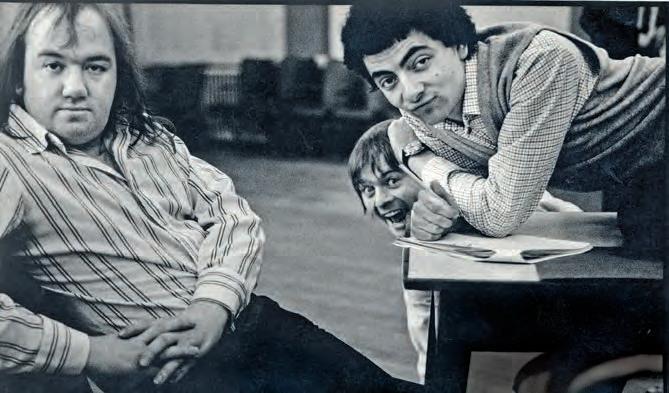
this glamorous girl called Mary Allen to sing. She turned up and I fell in love on the spot. So my final year at Cambridge was spent love-struck in bed playing Ella Fitzgerald. I got the worst third-class degree in the Cambridge law faculty. My wonderful tutor wrote to me and said, “Congratulations, John, I can’t believe anyone who did as little work as you got a degree at all.”
“My final year at Cambridge was spent love-struck in bed”
…SEEING ROWAN ATKINSON FOR THE FIRST TIME.
…SMOKING. When I first started as a radio producer at the BBC everyone smoked. It was the mid-Seventies and the o ces would be thick with smoke. We’d go down to the pub and have a couple of pints for lunch, smoke there, then come back and smoke some more. It’s a terrible habit I’ve never kicked and it’s totally associated with feeling under pressure.
I’d gone to the Edinburgh Fringe and went to record the Oxford revue. Richard Curtis was playing the straight man to Rowan, and I stood there open-jawed. I knew I was in the presence of genius. When I went backstage to meet Rowan he was rather grumpy because he thought the show hadn’t gone well. But a few years later, when we were putting together Not the Nine O’Clock News, we knew we had to have Rowan in it.
…
NOT THE NINE O’CLOCK NEWS WAS CONCEIVED IN AN INDIAN RESTAURANT IN COVENT GARDEN.
It was apparently the same restaurant where chicken tikka masala was first served. I’d decided it was about time I moved from radio to television, so
67 READERSDIGEST.CO.UK A UGUST 2013
Peeking out from behind Rowan Atkinson (right), with Mel Smith on the left, during the making of Not the Nine O’Clock News in 1980
►
I knocked on the door of the head of BBC comedy and asked for a show— those were the good old days when things were agreed on the spot. I was given six episodes, so long as I collaborated with Sean Hardie, who worked in current a airs. Luckily, we got on brilliantly.
The first episode was so bad that Mel Smith has described it as “the single worst half-hour of television ever made”. But, by the second series, it was the hottest show on TV and made stars out of all the cast.

there was a national outcry—“How could these people make fun of a baby!”—but I’m quite sure the little prince didn’t notice or mind.
…MISSING
EVERY SOCIAL OCCASION THROUGHOUT THE EIGHTIES.
…ONE OF MY PROUDEST MOMENTS WAS WHEN OUR SPOOF BOOK OF THE MARRIAGE BETWEEN CHARLES AND DIANA, NOT THE ROYAL WEDDING, TOPPED THE BEST-SELLER LIST. The real souvenir of the wedding came next. It was an exciting time to be alive because the show was so good when it worked.
…THE SMELL OF PINK LATEX. Producing Spitting Image was very stressful, and the latex from the puppets still makes me feel sick with residual feelings of fear—fear that we weren’t going to make transmission times and the show might not be good enough. The press loved us, though, because we gave them such good copy. When we made a puppet of the new baby Prince William
I was working so hard and was a ridiculous overachiever. When I met Sarah in 1989, while filming the last series of Blackadder, I remember thinking, “If I don’t marry this wonderful, beautiful girl, I’ll be making the biggest mistake of my life.” I was over the moon when Sarah got pregnant. She rang to tell me the news when I was shooting a commercial with Harry Enfield. He was dressed as a giant baby in nappies at the time and we were surrounded by lots of real babies. That was quite surreal.

…BEING VERY DRUNK AT THE 1990 BAFTAS. Blackadder had already won two awards. We were all hugely successful. Sarah was pregnant. Everything was marvellous. We cracked open the brandy and it was then that I heard Princess Anne at the podium getting ready to present the Lifetime Achievement Award and
68
◄
The Not the Nine O’Clock News royal wedding book
BILL CROSS/ASSOCIATED NEWSPAPERS/REX FEATURES
John Lloyd’s very own Spitting Image puppet
describing a career that sounded a lot like mine. I was completely poleaxed because I was drunk and hadn’t prepared a speech. I got up there and apologised to Princess Anne for being the person who helped produce the Spitting Image puppet of her.
…A BLEAK FEW YEARS. I was 39 and had achieved so much, but all of a sudden an unexpected darkness descended and I couldn’t see the point of life. I was miserable, overweight and drank too much. So I started to read voraciously, everything from Greek philosophy to physics, in an attempt to understand the meaning of life. And this led me to conceive QI [Quite Interesting], because I realised that everything in the world is interesting if you delve a little deeper.
…REALISING THAT BEING A PARENT IS THE HARDEST JOB IN THE WORLD.
Before having a family, I was used to people doing what I asked, but
“An unexpected darkness descended and I couldn’t see the point of life”
kids don’t work like that. I’m so proud that I’m still married to Sarah and that our three children seem to like being with us. I’ve never taken the awards or accolades personally because as a producer you’re just helping other people to be the best they can, but having a happy family is the best prize in the world. ■ As told to Caroline Hutton
John Lloyd will be performing his one-man show “Li of QI” throughout August at the Edinburgh Festival, in the Underbelly Dairy Room.
Crossing the Language Barrier
What the British say
“With the greatest respect…”
“Very interesting”
“I’m sure it’s my fault”
“You must come for dinner”
“I would suggest…”
“I only have a few minor comments”
What the British mean
“I think you’re an idiot”
“That’s clearly nonsense”
“It’s your fault”
“It’s not an invitation— I’m just being polite”
“Do it or be prepared to justify yourself”
“Please rewrite completely”
Source: joannagoddard.blogspot.co.uk
What others understand
“He’s listening to me”
“They’re impressed”
“Why do they think it was their fault?”
“I’ll get an invitation soon”
“Think about the idea, but do what you like”
“He’s found a few typos”
69 READERSDIGEST.CO.UK A UGUST 2013







Choosing the right food for the right time in your daily schedule can make a big di erence to your health, energy and mood
Eat Your Way to the Perfect Day
BY SUSANNAH HICKLING
WAKEY, WAKEY!


When it comes to hauling ourselves out of bed and getting going in the morning, many of us opt for the traditional cup of co ee. But doing that might not always be the best idea. A 2010 Bristol University study found that regular co ee consumers were no more alert when given ca eine first thing than non-co ee fans who took a placebo. This is perhaps because co ee guzzlers feel withdrawal e ects after several hours without it, and that initial cup of the day simply brings them back to “normality”.
One reason you feel sluggish when you wake up is dehydration. So Lucy Jones, of the British Dietetic Association and Channel 4’s Food Hospital, has a simple alternative to co ee: drink a glass of water.
► MONKEY BUSINESS IMAGES/ISTOCKPHOTO
READERSDIGEST.CO.UK 71 AUGUST 2013
Co ee may come into its own, however, before a morning jog. “The best thing for weight loss is to exercise before breakfast,” says Jones. “You can burn o 20 per cent more fat on an empty stomach. But, if you have a black co ee first, the ca eine mobilises these fat stores further. It also reduces the perceived e ect of exercise, meaning you can train harder.”
Even so, a serious athlete like Devon hotelier Luke Tillen needs to eat first. Luke, 37, runs 69-mile ultra-marathons to raise money for the Torbay Holiday Helpers Network, which organises breaks for families a ected by terminal illness.
UP AND RUNNING
An hour before a 15-mile run up and down the local cli s, he eats porridge made with water. “The oats provide a good, steady, slow-burning source of energy,” he says.
Nutritionist Beth Hanson from Loughborough University agrees. “Porridge is low glycaemic, meaning that carbohydrate gets released into the blood stream gradually,” she explains. This means you feel fuller longer and eat less over the day—unlike with high glycaemic foods (such as white bread or sugary cereals) or those containing a lot of saturated fat, which give you an instant energy boost, followed by a big crash that leaves you hungry.

GO TO WORK ON AN EGG
We all know a proper breakfast is crucial. But what is proper? It’s a light meal containing both protein and carbohydrates with a low glycaemic index (GI).
“After a protein breakfast you have better memory and cognitive function during the day,” says Jones. “But you must remember that the brain relies on glucose, so some carbohydrate is essential to help it function and keep you sustained through the morning.” She recommends a slice of low-GI granary toast and scrambled eggs.
Financial journalist Helen Loveless finds that eggs are exactly what she needs to set her up for a high-pressure shift at a
national newspaper. “When I eat them, I really don’t feel hungry until lunchtime,” says the fortysomething Londoner.
Try drinking green tea with your healthy breakfast too. It’s thought to boost metabolism, which is handy if you want to lose weight, and improve mental alertness—just what you want as you head for the o ce.


72 READERSDIGEST.CO.UKAUGUST 2013 CREACART/ISTOCKPHOTO; JORDAN SIEMENS/ TAXI/GETTY IMAGES

EATING FOR THAT MEETING


Got an important appointment coming up and need a quick lift? Sally McKay, an artist from Greenwich, south London, who specialises in depicting dancers, uses almonds to give herself a boost.
“If I’m working with a dance company, I never know when they’ll stop for a break,” she says. “I usually carry almonds so I can eat something nutritious fast and keep my energy levels up.”
Sally’s three teenage children think she’s a crank, but Jones confirms that she’s doing the right thing. “Tree nuts [which also include Brazils, cashews and walnuts] are high in calories, but full of minerals, vitamins, antioxidants and really hearthealthy fats,” she says. She recommends a mid-morning or mid-afternoon hit of 30g of tree nuts—that’s around 23 almonds.
Jones is also a fan of blueberries as a boost to mental performance. “We studied o ce workers who’d had a blueberry smoothie,” she says. “It increased blood flow to certain parts of their brain, which helped with concentration and shortterm memory tasks.” It’s thought that flavonoids in blueberries open up blood vessels. Other purple fruits, such as red grapes and plums, bring similar benefits.
“Nuts are full of really heart- healthy fats”
LET’S DO (LIGHT) LUNCH
Everyone should have a good meal in the middle of the day to get the nutrients they need. But, if you want to stay awake and e ective in the afternoon, Jones counsels against high-GI or fatty foods such as bowls of pasta or rice, or a jacket potato and cheese, that cause insulin levels to shoot up and make you sleepy when they dip again. “The worst thing,” she laughs, “is an o ce lunch with a glass of wine and a fatty meal. You’ll never get anything done after that.”
Her own choice is smoked salmon salad with a spoonful of couscous. “The fish gives you Omega-3, essential for proper brain function, and you’ve got protein there to help the cognitive function and short-term memory. The meal also has a low GI and has plenty of fibre from the vegetables to help sustain you through the afternoon.”

“I realised that a sandwich at lunch sent my energy levels plummeting,” says Sally McKay. “So I had to replace it with something simple as I was either in my studio or a dance studio. Salad seemed to be the answer, and I now always have lots of carrots and celery in the fridge.”
73 AUGUST 2013READERSDIGEST.CO.UK
► MONCHERIE/ISTOCKPHOTO; SIMONKR/ISTOCKPHOTO
FOOD FOR YOUR MOOD
The afternoon’s wearing on and you’re fed up with your boss, your children’s demands or trying to get through to the call centre. But healthy snacks can make you feel more contented.


First, reach for a glass of water. A recent Journal of Nutrition study suggested that even mild dehydration can make you feel depressed.
Then you might want to try fruit. “It’s a really healthy, nourishing snack,” points out dietitian Laura Clark. “And if you know you’re eating something that’s good for you, it can have a very positive e ect on your mood.”
EVENING EXERCISER

Lucy Jones’s feel-good food is “healthy” popcorn (the kind without too much salt or sugar)


flavoured with cinnamon and honey. wherever you can.”
flavoured with cinnamon and honey.
“Studies have shown that carbs, especially for men, are linked to feeling happy and calm. But eat wholegrain wherever you can.”
So granary toast with honey also makes for cheery chow.

Journalist Helen
with honey also makes almonds, which improve your mood by boosting serotonin. “I often get

Loveless, meanwhile, turns to those energy-boosting almonds, which improve your mood by boosting serotonin. “I often get stressed before a deadline and want to eat as a distraction, but almonds make me focus without feeling too sleepy and full.”

If you’re going to the gym after work, your energy levels could be low, so top up with some carbohydrate. “You could have a small sandwich—peanut butter, perhaps—a few portions of fruit or a glass of juice,” says Beth Hanson. Whatever you do, don’t go for a quick post-work glass of wine before working out. Alcohol is a diuretic and it makes you sweat more, so you risk dehydration and recovering from exercise will be harder.
ROBERT DALY/OJO IMAGES/GETTY IMAGES ISTOCKPHOTO


WINDING DOWN
According to Dr Ian Smith, director of the Sleep Centre at Papworth Hospital in Cambridge, eating certain foods to ensure a good night’s sleep is only half the story. “It’s also about timing and quantity,” he says.
If you eat too early—say, at 5.30pm or 6pm with the family—you may well be starving by bedtime. “Being hungry inhibits sleep,” points out Dr Smith. “There’s good evidence that people with anorexia sleep incredibly badly.”
So if you do eat early in the evening, have a milky drink or a banana before bed. Both are rich in tryptophan, which is converted to serotonin, one of the hormones that help you get to sleep.
Coffee or tea at night is

night
a no-no
Eat too much too close to bedtime, though, and not only can it be uncomfortable, but you could end up su ering from acid reflux, which will wake you up without your knowing why.
“Research shows that if you eat a highGI meal, like pasta, in the evening four hours before you go to bed, you’ll actually fall asleep quicker,“ says Lucy Jones. This is because when you eat carbohydrates, insulin knocks all other amino acids except for tryptophan out of the way.
Co ee or tea at night is a no-no. “It’s still hugely under-appreciated just how potent and long-lasting the e ects of ca eine are,” says Dr Smith. “If anyone has problems with their sleep we recommend they don’t have ca eine after 2pm.” And this—sad to say—applies to good-quality, ca eine-rich chocolate too. ■
75 AUGUST 2013READERSDIGEST.CO.UK
GERENME/ISTOCKPHOTO
THE MAV E RICK ‘‘WE DON’T GET WISER WITH AGE’’

Being older and more experienced inevitably makes you more astute, the theory goes. Nonsense, says comedian and author Je Green
WHEN I WORKED AS AN OFFICE DOGSBODY IN THE 1980S, I was told about one of the company’s longest-serving employees, a crusty old dude who’d been doing the same job for years and was considered to be the company’s IT expert. “He’s brilliant. He knows everything,” people said.
THINKING DIFFERENTLY!
So when I sought his advice about getting a set of customer records pulled from the computer system, I received a rude shock. Instead of the avuncular font of knowledge I’d been expecting, Mr Guru turned out to be an arrogant, inflexible oaf. Sitting in his office, his shoeless feet on the desk, he revelled in explaining to me how what I was asking for was impossible and that we didn’t do things that way, while smirking at my disappointment and blocking all of my suggested solutions with his “expertise”. Needless to say, I didn’t get my printout.
What I did get, however, was my first meeting
►

76 READERSDIGEST.CO.UKAUGUST 2013

77 AUGUST 2013READERSDIGEST.CO.UK ILLUSTRATED BY SCOTT GARRETT/HEART
with a sufferer of the Einstellung effect. Also known as “the inflexibility of experts”, it’s a behaviour that occurs when someone gets so entrenched in a point of view or way of doing things that it becomes hard for them to see things differently. It’s a creativity killer that lulls us into fake omniscience when, in fact, it leads to a narrowness of thinking that actually undermines our expertise. And it’s nourished by age. So when people say that experience and getting on a bit automatically brings wisdom, I’m dubious.
IT SEEMS TO ME AS I get older (I’m 49), that life is funnel-shaped.
◄ though we may have had lots of experiences, we’ve forgotten to learn from them. When the next football season arrives, after 40 frustrating years following Tottenham Hotspur, you’d suppose I’d be wise enough to expect yet more plucky failure and keep my baiting of Arsenalsupporting friends to a minimum. But will I follow such a prudent course? No. Will my expectations run wild with the first sniff of flowing football and a couple of back-to-back wins? Absolutely. This is going to be our year! My clueless optimism might be explained by a 2009 Massachusetts Institute of Technology study. In tests on monkeys, researchers found that success in a task produced a stronger learning signal to the brain than failure. So the popular belief that we absorb more from our mistakes may not actually be true.
“AS YOU AGE, IF YOU’RE NOT CAREFUL, YOU’LL LOSE A LITTLE WISDOM BIT BY BIT”
We may gain greater general knowledge with the passing decades, but the varied and new experiences of youth inexorably narrow until life eventually—in most cases, at least— settles around the same habitual patterns: the places we visit; the authors and magazines we read; the people we trust; the beliefs we hold.
Does that sound like the key to wisdom, experiencing and thinking the same things over and over? I’ve lost count of the number of older people I can’t show to polite society because their dated, set political views are as rabid and unhinged as a Balinese stray dog. Becoming wise, and staying wise, surely comes from constantly doing fresh stuff so we see things from a broad perspective.
Another problem is that, all too often,
IF ALL TH I S WASN’T ENOUGH, OUR brains get weaker as we get older. From the age of 20, we lose ten per cent of our neurons per decade. Thankfully, most grow back, but there’s a small net loss that, according to a study of British civil servants published in the British Medical Journal last January, shows up in our cognitive function from the age of 45. By 65 to 75 we’ve suffered a near ten per cent decline in mental reasoning. We can slow this inexorable cerebral decay with fun stimuli like Sudoku, handicrafts and coach
78 READERSDIGEST.CO.UKAUGUST 2013
trips to Ely Cathedral, but it’s never going to be easy fighting our own physiology, whose proteins and genes eat knitting patterns for breakfast.
Add a hefty dose of the fear of the new that comes as you age, and a jaded indifference to curiosity and the pleasure of mastery, and before you know it you’re on the phone to that pimply nephew to come over and set up the webcam for Skype.
uses of trigonometry in daily life make me wiser overall? Of course not.
Does a wise head really rest on old shoulders?
Join the debate at facebook.com/ readersdigestuk or email readersletters@ readersdigest. co.uk
When I was a young teenager I was given a Casio FX-77 scientific calculator for Christmas. For months, while waiting for puberty to kick in, I delved into its obscurest functions, marvelling at the laws of sines, cosines and tangents. Nowadays, I think about cosines as often as I spend the afternoon on a pogo stick, but does my realisation of the marginal
What’s the solution? You need to have a greater variety of different experiences for a start. Catch the bus to work sometimes, change your news sources, seek out new people and listen to their perspective. You need to avoid the trap of thinking you’re an “expert”—if you’re still learning, which we all should strive to achieve, how can you be an expert?
So remember, when you’re young you know quite a lot. But as you age, if you’re not careful, you’ll lose a little wisdom bit by bit. Mind you, being older and wiser, you probably knew all this already. ■
For details of Je Green’s comedy gigs, visit je green.net.
The Customer Is Always Right?
When five-star products get one-star reviews on amazon.co.uk, you have to question the wisdom of the reviewers:

Sgt Pepper’s Lonely Hearts Club Band by The Beatles
“The title is very misleading. I thought I was buying an album called ‘Beatles’ by a brass band named ‘Sgt Pepper’s Lonely Hearts Club Band’, only to learn when I got home and played it that it was the opposite.” Alf Tupper

Schindler’s List


Animal Farm by George Orwell
“This book is terrible. I mean, I know it was written like ages ago when movies were all about giants, ants and stu , but none of the animals on this farm were even radioactive or giant or anything, so who cares?” Maskoolio

“I’ve got a 42-inch LCD TV with Blu-ray, and it’s the business. I don’t expect to have to watch black-andwhite films on it. Save up and buy a colour camera, Mr Spielberg, you moron! Then perhaps people will watch your stupid films.” David



Great

Expectations by Charles Dickens
“Sorry, I haven’t read this one yet, so cannot comment.”
Peggy



79 AUGUST 2013READERSDIGEST.CO.UK

THE HABIT OF A LIFETIME
Why would anyone want to live the religious life in the 21st century? And what’s it like if you do?
We asked three people who should know to tell us their stories


Sister Scholastica, 53, is a Benedictine nun at Stanbrook Abbey, north Yorkshire
Until ten years ago, I worked for the Arts Council, having been a solicitor before that. I converted to Catholicism only in my thirties. Then, one day, I was about to set o for an important meeting when I heard the abbess of Stanbrook doing a radio interview. Everything she was saying about God and the Benedictine life made so much sense to me. Enclosed communities weren’t about shutting yourself o from the world. They were about giving yourself to it, separating yourself from life’s nitty-gritty to focus entirely on God and on praying for others. Convents are powerhouses of prayer and I believe they make all the di erence. So I ended up googling Stanbrook, missed my train and immediately sensed I’d found my calling.
Shortly afterwards, I went to Stanbrook for a weekend of prayer
►
 BY JOANNA
BY JOANNA
MOORHEAD
 CALTON
PHOTOGRAPHED BY GARY
CALTON
PHOTOGRAPHED BY GARY
to get a flavour of the life. Back then, [before the community moved to Yorkshire] the abbey was a huge gothic building in Worcestershire and I was in awe of the place, thinking, Oh my gosh But by the end of the weekend, I knew I was totally drawn to the life—though I was also petrified about what it would mean for me.
Telling my parents I’d decided to become a Benedictine was hard. They were getting on and, while we are allowed visitors, joining an enclosed order would mean I wouldn’t see much of them in the future. They’re not Catholics either, so becoming a nun was an alien concept. But though I think they were surprised, they did understand my decision.
Benedictine nuns wear a traditional black habit. Think The Sound of Music that’s us. It’s a fabulous outfit: incredibly comfortable and practical. It has huge
“IF
A
ourselves, we also have holiday cottages for rent.
Saturday afternoon is chill-out time. We go for walks—the abbey is surrounded by beautiful woods—and I often take Katie and Gerty with me. They’re pet lambs, named after two of our founding sisters. They follow me and I love it.
Our days are highly structured, but on feast days we do something di erent. There might be a talking meal instead of our usual eating in silence. Or, if we have a party, a group of sisters often put on a play or a little sketch. We’ve got a DVD player and sometimes watch films—not The Sound of Music! We watched War Horse recently.
We never go on holiday, but we do have an annual staycation—a retreat inside the abbey when we do only essential jobs, so we all get a rest. People come in and give talks, and we can read or do whatever
WE HAVE A PARTY,
GROUP OF SISTERS OFTEN PUT ON A PLAY”
pockets—it’s amazing how much stu nuns carry around with them—and you can tie the skirt up when you need leg space.
There are about 20 nuns here. We call each other Sister, but o cially we’re “Dame”, the female equivalent of the male Benedictine title “Dom”. We’re not an entirely silent order but we certainly don’t chat, except during our daily half-hour’s recreation. Life is busy. As well as all the household tasks, we’re trying to revive old crafts such as weaving and, to support
we want. I’ve learned that the further you travel into yourself, the less you need to travel in a physical sense.
My birth name is Susan, and I became Sister Scholastica when I was clothed as a nun. The abbess tells you the name chosen for you during the ceremony—it’s a dramatic moment, because it’s your new persona. I thought I’d never get used to it, but last week I was writing to an old friend and found myself signing “Scholastica” instead of “Sue”. That’s who I am now.
82 READERSDIGEST.CO.UKAUGUST 2013
◄
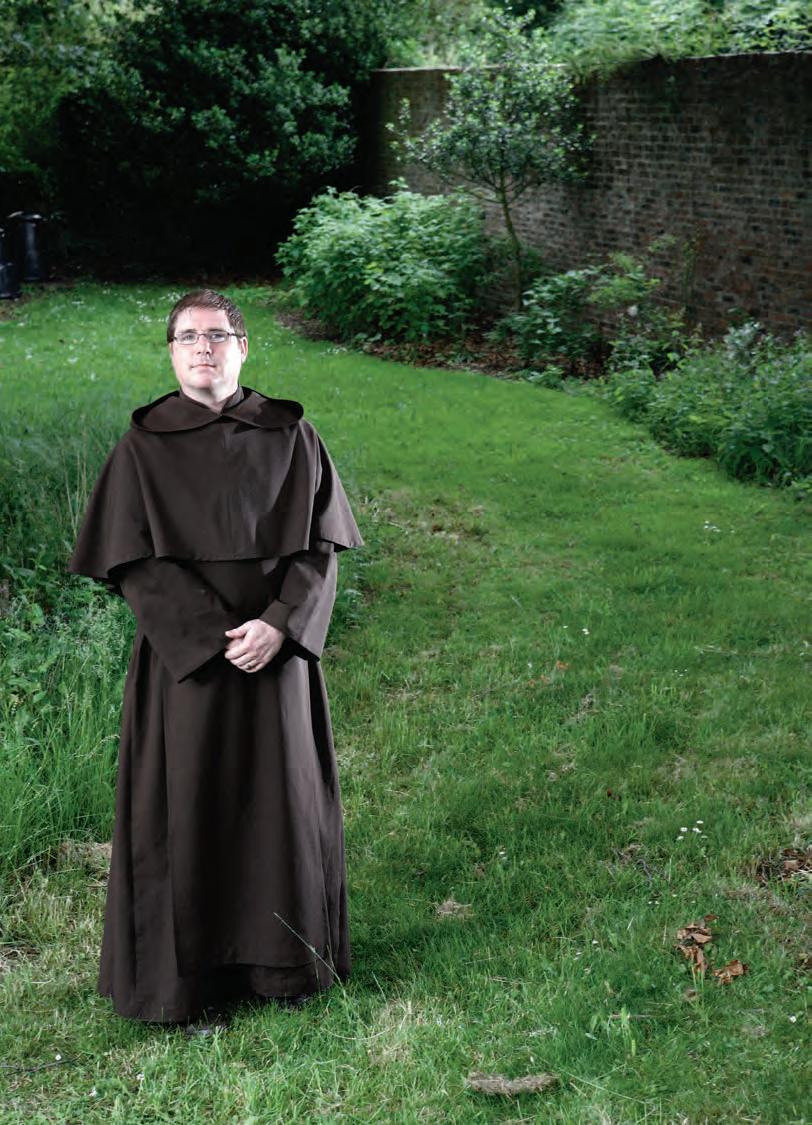
Friar Gerard Walsh, 35, is a Carmelite based in a small community in York
I grew up a committed Catholic and first contemplated the religious life at 18, but felt I was too young. So I became a radiographer and got a job in a Leeds hospital.
I enjoyed my work, earned good money, had my own flat, nice clothes... but there was something missing. So in my late twenties, I investigated the various religious orders and decided to apply to be a Carmelite friar. It was di erent from being a monk in that I wouldn’t be tied to one monastery for life. You can move around and live in small open groups in cities, and I liked the idea of being a witness to God in the middle of ordinary life.
But though there aren’t many applicants these days, the Church won’t just take anyone. Its problems with paedophilia are well known, and getting a place in a religious order is a rigorous process. I had go to through an entire weekend of psychological tests, with lots of very personal questions about my sexual history and family background. I was mentally drained when it was over.
►
Next came a round of interviews at Aylesford Priory in Kent, the community I hoped to join. One was with the national head of the Carmelites, another with an
◄ an honour. Of course I’m only human, and there’s often nothing I can do except listen; but listening is often all someone wants, and they’re usually very grateful.
“IT WAS WEIRD FOR A 28-YEAROLD TO BE TOLD THAT 11PM WAS BEDTIME”
ordinary friar, and a third with the novice director. I also had to talk to a married man, then a married woman: the idea being that they represented the lay people I’d be serving, and would assess whether they thought I could do it. Finally, I was o ered a place at the priory. I was thrilled.
My new life was very ordered. It was weird for a 28-year-old suddenly to be told, for example, that 11pm was bedtime. But I went with it. And given that we were up at 6am to pray, it made sense.
My work at Aylesford revolved around running religious retreats for visitors. But in York, where I now live, it’s more community-based. I’m a chaplain at York University and at a local hospital.
Putting on the friar’s habit for the first time was a very big moment. You feel quite di erent wearing it, and there are a lot of stares and some negativity. But people feel they can trust me and tell me really big things, which I always regard as
The habit we wear is 800 years old, and I’m sure some people think that being a friar is something out of history too. But as far as I’m concerned, it’s as relevant in the 21st century as in any other. I’ve given myself to God so he can work through me, and I can be there for people who need someone to talk to or care for them, often at very di cult moments in their life.

Sister Rachel Gregory, 90, is a Carmelite nun in Quidenham, Norfolk
It was wartime when I entered the convent. I remember we could hear the thuds of the bombs around Norwich from inside the convent walls. But we knew very little about what was going on. The prioress would read snippets from the paper, and that was all. I remember D-Day, because we could hear bands playing and people cheering.
I’ve been a nun for more than 70 years and in many ways my life’s been exactly the same, year in, year out. None of the “normal” things that happen to most women ever happened to me. I never got married, never had a baby, never saw my
84 READERSDIGEST.CO.UKAUGUST 2013
children grow up and leave home, never became a widow. But I’ve no regrets. I may not seem to have lived much on the outside, but I’ve had a rich and wonderful life on the inside, grappling with what I believe are the most important issues of life: knowing God and being close to Him.
The life of an enclosed nun is austere to this day, but before the reforms of the Second Vatican Council in the early 1960s, it was frankly medieval. A grille separated us from the world, with spikes facing outward—going back to the times when nuns had to keep men from invading. Once you were behind that grille, you could never have physical contact with anyone from the outside again. It was very hard, especially on parents who knew they couldn’t hug their daughter. You couldn’t have a visit, even from a family member, without a chaperone.
These days, we’re a lot more sensible about contact with outsiders. If we’re ill, we go to the doctor, and if we’ve got toothache, we go to the dentist. But back then, the rules were intensely petty and they infuriated me. I knew that this life o ered me the path to a properly fulfilled existence. But I didn’t go out for years and years.
Then, I became prioress and was able to go to conferences and meet nuns in other places. I went to Ireland, then Iceland. It felt strange being out: things were very di erent from the wartime world I’d left. All those decades, all those things like the Beatles, the changes for women and in fashion—and I knew nothing of any of it.
The big development in recent years has been technology. We have email and the internet inside
“THE BEATLES, CHANGES IN FASHION–I KNEW NOTHING OF ANY OF IT”
the convent, but we have to use them strictly for business. They’re a very dangerous development in our lives. We’ve chosen to cut ourselves o from the world, but now the world can penetrate our walls.
I’m 90, but in excellent health and though I’ve no reason to think I’ll die soon, I hope I won’t go on too much longer. I never try to imagine exactly what the next life will hold, but I know we are promised a glorious future with God, and that’s enough for me. That’s what I’m looking forward to. n
Is the sign on this bench absolutely necessary? Many thanks to Maggie Cobbett of Yorkshire for sending this in Perching Room Only

85 AUGUST 2013READERSDIGEST.CO.UK
When the Soviet Union collapsed in 1991, it unleashed on the world scores of aircrews with their own cargo jets and a willingness to fly anything anywhere—as long as the price is right

FLIGHT
AUG UST 2013 READER S DIGE S T.CO. UK 86
CLUB Bonus Read
 BY MATT POTTER
BY MATT POTTER
From THE OUTLAWS INC: FLYING WITH THE WORLD’S MOST DANGEROUS SMUGGLERS
DJ/AIRPL A NE- P ICTURES.NET
There is no warning, just a sickening lurch upward as we abandon our flight path . A red light goes on in the cockpit. The instruments say we’re over Kabul, where we’re supposed to be landing. Only now we’re climbing—and we’re doing it too fast and too steeply. “What’s going on?” I ask in Russian.
But Sergei, one of the seven-man crew, can’t hear me over the scream of the battered Ilyushin-76—the cargo plane they’ve flown since their days in the Soviet Air Force. Its four engines shake, lifting the suspiciously overloaded giant almost vertically into the night. Under my feet, the greasy, gaffer-taped jet—now more than 20 years old—groans and pops.
Then Sergei leans in close, and for the first time I notice that he smells not just of sweat and oil, but also of booze. “Missiles,” he shouts above the noise, as if pointing out a house where he once lived, or a roadside bar. “Here’s where they start shooting.”
Who?” I ask.
He shrugs. “Mujahideen. Rebels. Soldiers. You never know. But it’s always somebody.”
Then he grins. “Mikhail is a top pilot, though. He knows the airstrip from the war. He’s got this method where he lands by climbing up high over the airport, then sort of dive-bombing towards the runway like a corkscrew.” Sergei laughs. “You don’t get shot down that way. His trick is knowing when to pull out of the dive. Incredible! You watch.”
Suddenly the plane levels off. The engines are almost hushed now and an odd feeling of weightlessness washes up from the soles of my feet. It takes a moment to register the sudden downward tilt, to see the lights of Kabul in the cockpit glass. These dives—in which the pilot attempts to pull up just before the nose hits the tarmac—are said to have resulted in a number of messy Some
deaths. As we plummet earthward and my stomach passes up through the top of my skull, I attempt to calculate our diminishing chances of pulling level before we crash.
Against my better judgment, I lean out to look over the pilot’s shoulder. Mikhail is hunched forward like a man reading on the toilet or praying. Either way, I’m with him. The ground is more than very close now; it’s just yards from the nose. Pull up. For God’s sake, pull up. Involuntarily, my fists clench, my legs kick out, my eyes shut. This is it.
We’re going down.
The giant Ilyushin-76 was the USSR’s ultimate warhorse. A monstrous cargo jet first built in the early 1970s, it saw
88
identifying
to protect anonymity
names and
characteristics have been changed
action on every front, in every capacity—commando missions, military intelligence, explosives drops, arms transport and even cosmonaut training. At more than 150 feet long, and with a 164-foot wingspan, it is one of the biggest planes on the planet. It can fly in Arctic ice
an outlaw aviator and international gunrunner to look like, but Mikhail is definitely not it. Heavy-boned, grey and stooped, he looks 50, maybe more, and his gaunt face carries a permanent expression of mild disappointment. But if Mikhail—whom I take to calling Mickey—
THESE SECRET CHAMBE RS DON’T APPEAR ON ANY CARGO PAPE RWORK. THEY WON’T BE CHECKED BY CUSTOMS . OFFICALLY, THEY DON’T EVEN EXIST
storms and African heat. It can operate from shorter, more bomb-damaged runways than planes half its size. It can carry 60 tons of guns, soldiers, tanks, bombs or anything else halfway around the world. And these days, for half a million dollars, anyone can have one.
But the IL-76 also carries a secret: beneath the floor of the cargo hold, deep in the belly of the plane, its Soviet creators added a number of extra spaces. Originally designed for escape equipment, armaments and classified payloads, these secret chambers don’t appear on any cargo paperwork. They won’t be checked by customs. Officially, they don’t even exist. Yet, if you’re determined enough to fill them—and foolhardy enough to fly the plane—then your IL-76 will carry anything up to 15 extra tons of phantom cargo.
Which is where people like Mikhail come in. “That’s me,” he explains, walking along the tarmac in Kabul. “Just a postman—only with heavier parcels.”
I don’t really know what I’d expected
makes an odd outlaw, he makes an even odder businessman.
Yet here he is, a partner in a highly profitable air-transport business spanning the Emirates, Asia, Africa and Eastern Europe—a business whose operations in the world’s worst trouble spots make Mickey and his UAE-based crew the secret agents of the global free market. They have flown together in IL-76s for more than a quarter of a century, including more than 300 hostile missions over the same Afghan mountains, villages and cities they specialise in navigating today.
“When the USSR started to break apart,” Mickey explains, “some of us saw the weather change and took our chance to do something different.”
That something was a dramatic escape from the military and a bid for a piece of the private-enterprise pie. “It wasn’t difficult. We knew some people, and when they ‘acquired’ a military plane, we flew it down to Kazakhstan and, you might say, rebranded.” ►
89 AUGUST 2013READERSDIGEST.CO.UK
Call Mickey’s crew and they’ll fly whatever you’ve got—guns, drugs, medical supplies—to wherever you want it. “We fly a lot of freight,” he explains. “Military things. And a lot of aid.”
The aid work has had the strange e ect of turning Mickey and his men into rather reluctant saints too. From Pakistan to Somalia, from famines to tsunamis, Mickey’s battered IL-76 is often the first to arrive in disaster areas with life-saving humanitarian relief.
border; an entire ex-Soviet crew and all the passengers died when one blew up over Uganda; and three out of four crew were killed trying to land in the Congo.
Mickey stops me. “Yes, of course there are risks, just like any job. Don’t make too much of them.” He counts off the dangers on his fingers—“tiredness, enemy fire, stupid errors, overloading, mechanical failure, bad conditions, bad cargo, bad luck”—but adds that “alcohol and bad living have killed just as many men in the business as flying has”.

Commissioned by charity organisations and Western governments, his team is regarded as agile, responsive and— largely thanks to their background in commando drops—able to get more aid closer to more hazardous, harder-toaccess disaster zones than anyone else.
Still, casualties are high: in 2009 alone, two Russian-manned IL-76s collided at Makhachkala airport, near the Chechen
“Of course there are risks, just like any job”: the wreckage of the IL-76s that collided at Makhachkala airport
Few of these airmen, however, are risking their lives for solely humanitarian purposes. “If you really wanted to,” one former pilot tells me, “you could take off with whatever you like on board, wait until you’re out of radar range, buy yourself some time by misreporting your position, divert somewhere to make an illicit rendezvous, land, unload your cargo, hand it over, take on something
90 O UTLAWS INC: FLYI NG W ITH T HE W O RLDS MO ST DAN G ER O US S MU GGLERS B Y M ATT P OTTER IS PU B LISHE D B Y PAN AT £8.99
WIKI MEDIA CO MMONS ◄
else, and resume your original flight plan. In the places where these guys operate, nobody will notice if you’re 40 minutes late. That’s how flights take off with one thing on board and land with another. Let’s say, for the sake of argument, that food is replaced by something illicit, and that something illicit quickly becomes money.”
No wonder that one international monitor recently identified “the untraceable, migrating flocks of Ilyushin-76s” as a key channel for the transport of “destabilising commodities” such as narcotics, banned weapons, suspiciously sourced diamonds, arms to illegal or terrorist armies and secret supplies to rogue regimes.
diplomatic and media interests swiftly established themselves in both countries. And they required unimaginable daily quantities of equipment and personnel.
A whole series of military and refugee camps now needed supplying—and amid the rubble, revolution and reconstruction, business was booming. In Afghanistan, the second Soviet invasion had begun. This time around, though, Mickey’s crew and the West were all marching together, under one big capitalist flag.
John is a chartering agent based in Surrey, one of the middlemen who take initial specs on jobs from armies, aid organisations, importer-exporters and private individuals—and then find the
HE COUNTS OFF THE DANGE RS ON HIS FINGE RS—“TIREDNESS , ENEMY FIRE, OVE RLOADING, MECHANICAL FAILURE, BAD LUCK”
In this world, a hold full of blankets bound for a disaster zone can apparently transform, midair, into 15 tons of land mines for the local militia or bootleg goods for the local mafia. It’s a world in which the words “mercenary”, “pilot”, “aid worker” and “trafficker” have become dangerously interchangeable.
After 9/11, the phantom transport business shifted dramatically for straight and crooked alike. With the fall of Afghanistan to US-led coalition forces in November 2001, and with the invasion of Iraq in 2003, huge, complex ecosystems of military, humanitarian, business,
crews and planes to pull them off. He recounts one wildcat IL-76 job that left the American military command in southern Afghanistan breathless with admiration. “The US military had this huge generator they needed to get to an airfield site they were planning in the south,” he explains. “It was a remote area and, aside from a few pockets of US troops, completely under bandit control. There was no fuel available for miles around the landing spot, and none of the outfits we approached would touch it with a bargepole. They all kept saying, ‘We’ll never get out again; how can we take off from an unprepared airfield with no fuel?’ ►
91 AUGUST 2013READERSDIGEST.CO.UK
“The job was priced between $60,000 and $70,000, but one day there’s a phone call from these Russians. They said, ‘We’ll do it, but it’ll cost you $2m, in advance.’
“The Americans didn’t really have a choice at this stage, so they paid. And sure enough, right on time, this ex-Soviet air-force crew flew in on a battered old IL-76, unloaded the generator, then sat down for a leisurely smoke.
cleared $1.5m in profit, and left it to rust. It’s still there.”
W hatever the cost, the occupying forces were intent on being seen to improve things, and quickly. In a bid to show that they were also saving tax dollars, they welcomed non-governmental organisations from around the world as partners in the post-invasion work of relief and reconstruction. They wanted, said Donald Rumsfeld, “nonstate actors” to play a valuable role. Even before he’d

“Just as all the Americans were wondering how on earth they were going to fly out again, there’s a cloud of dust and up clatters this old minibus driven by some Afghan bloke—and these airmen just get in and drive off.
“The Yanks were all going, ‘Hey, how will you get the plane back?’ And the crew just said, ‘We won’t. It’s an old one—we only bought it for this job, and we’re ditching it here.’ Half a million dollars it cost them. They held it together with string, just long enough to land,
No job too big:
finished that sentence, phones began to ring from Belarus to Benin.
Mickey’s team found themselves at the head of the queue for this work. They knew Afghanistan well—and unlike a lot of crews, they were up for it. It was, shrugs Mickey, “nichevo”—nothing at all. He jokes that he’s flown over Afghanistan and Central Asia more times since 2001 than he did in the years he was actually
92 READERSDIGEST.CO.UKAUGUST 2013
◄ AFP/GETTY IMAGES
an IL-76 loads up with humanitarian relief for the victims of the 2003 earthquake in Iran
stationed there. The work was great— flying straight jobs on reputable charters. The money was good too—both with the standard payments and the money they made on the side, filling the extra space in their planes with cigarettes, booze, unlisted weaponry, luxury goods and all the other stuff you’d sell your soul for in Afghanistan.
For Western governments, the possibility that these cargo planes might hold unwelcome bounty—unregistered guns for warlords going in, say, or opium coming out—was conveniently ignored, both in Afghanistan and later in Iraq. Perhaps it was too far down the list of priorities for a coalition fighting an insurgency. (If so, they should probably
dealers and hookers—and conveniently placed for East Africa’s biggest and leastregulated strategic air base.
It’s a hot, wet night at the end of another rainy season. Mickey, who arrived in Uganda en route from the Congo to the UAE, is so face-meltingly stoned on a bag of Entebbe’s finest cannabis that he can barely stand.
I’m here with five equally stoned “mercs”—as the local media calls these mercenary pilots—and their languages have melded with mine into half-finished gibberish and shouted exhortations to drink. Scanning the dark, narrow room, I spot a handful of South African military contractors—and enough Russian airmen to form a squadron.
MICKEY JOKES THAT HE’S FLOWN OVE R AFGHANISTAN MORE TIMES SINCE 2001 THAN HE DID IN THE YEARS HE WAS STATIONED THE RE
have checked where the insurgents were getting their arms.) Perhaps they genuinely never realised. Perhaps, amid an occupation already attracting a lot of criticism, it was an embarrassing secret best not talked about. Whatever the reason, nobody thought to ask whose IL-76s were collecting “preferred supplier” fuel vouchers out there on the runways of Bagram and Baghdad. Or where else, and with whom, they’d been doing business.
The Four Turkeys may well be the sleaziest pilot pit in Entebbe, Uganda. The 24-hour bar-cum-pickup-joint is legendary among ex-Soviet airmen,
In strategic hot spots like this around Africa, a lively circuit of Russian-run cafes, offices and garages has sprung up to cater to these bizarre clusters of expat aviators. Complemented by local prostitutes, shops and bars, these unofficial Soviet outposts—referred to by such names as Little Minsk and Russiaville— provide a home away from home. Bars like the Four Turkeys stud the plains and coastlines and show Russian sports on their TVs.
Tonight, Mickey and the boys are letting off some steam, shouting over the televised football match and downing beers with vodka chasers. Mickey’s ►
93 AUGUST 2013READERSDIGEST.CO.UK
◄
not flying tonight, but says he could— that it’s common practice for aircrews to unwind at the Four Turkeys before staggering the few yards to the combined civilian and military airbase, shooting the breeze with the guards, climbing into their planes and starting the engines for takeoff.
Nearby is the surprisingly smart o ce of a man who can connect the flights over Africa of mercenary airmen like Mickey with the world of big business. Boyish, muscular, sandy-haired and South African, Iain Clark looks more like a tennis coach than an essential cog in the global cargo business. Yet, as the Africa director of a highly respected global air charter agent, it’s Clark who calls the guys with the planes when a client of his needs something moved. These clients don’t always make themselves known, even to Clark, but they have the money to get things done. He has a story of his own about the anytime-anywhere capabilities of outfits like Mickey’s.
In spring 2010, Clark hired one such outfit to make a cash-ransom drop to some Somali pirates, who’d captured a ship and were demanding $20m for its return. Because the whole operation was carried out on a need-to-know basis, he wasn’t entirely sure what was going on. Clearly, however, his clients had calculated that it was worth paying the ransom.
This time, when the crew were briefed on their mission, they weren’t allowed to know their destination. They were simply given a set of GPS coordinates and handed a cheap mobile phone.
“They had to fly to certain coordinates given by the pirate ship,” says Clark.
“Once they got to those coordinates, they had to come in low at 1,000 feet or whatever. At that point, one of the pirates would send them a text message with new coordinates to go to.”
The crew shrugged. No problem. And if the thought of making a dash for it ever crossed their minds as they flew over the world’s biggest radar blind-spot with a full load of fuel and $20m in a strongbox, then it passed quickly.
The plane steered its course toward the GPS coordinates, passing over Kenya, Ethiopia, Somalia and out over the piratepatrolled sea. As they roared on to their destination, the phone in the navigator’s hand buzzed, with a message containing the new set of coordinates. The pilot turned his plane in a wide arc and followed the instruction, flying low while the crew’s eyes scanned the water for boats, flares, RPG fire, anything. At this point, they could only trust it was not a trap. The ritual was repeated. Then, at their next set of coordinates, they saw two small, fast boats in the water below.
The navigator’s phone rang, and an English-speaking voice said simply: “Don’t stop. Just drop the money.” That was what they’d been waiting for. The strongbox and its attached parachute were already positioned; the loading ramp was open. The crew cut the lines and the $20m was released.
The last thing the pilot saw as he turned for home was a surge in the bright blue water as the pirate boats sped in to converge on the strongbox. “And that was it,” smiles Clark. “They picked up the cash and off they went.”
The aircraft’s operator was Evgeny Zakharov, a Johannesburg-based ►
94 READERSDIGEST.CO.UKAUGUST 2013



◄ Russian aviator and businessman. “It sounds James Bond,” he says, “but it’s not. For a Russian pilot in Africa, it’s normal. Just a day’s work. You know something? We’ve done many of these drops for Somali pirates, and—believe me—for an ex-Soviet air force pilot used to dropping tanks from his plane, opening the door and pushing a 100kg box of money out is easy.”
It’s a story that highlights the way big Western shipping businesses, former Soviet pilots, blue-chip multinationals and Somali pirates coexist—if not happily, then in a way that keeps the wheels of everybody’s business oiled and rolling. It’s also a fascinating snapshot of the weird force field of mutually repellent opposites that keeps outfits like Mickey’s flying in the middle. When transactions are regularly called for between some of the world’s most respected financial institutions and AK-47-toting cut-throats in speedboats off the Somali coast, there’s only one acceptable, willing and able group of middlemen. And it isn’t UPS.
by now, wherever mickey’s Il-76 lands, it’s likely that someone will be watching: Interpol, the US Drug Enforcement Agency, MI5—anyone intent on shutting down this shadowy trade. These people will almost always be thwarted: by international law, corruptible airport officials, unregistered takeoffs and landings. But they also face a more vexing problem. If they do succeed in disrupting the flow of contraband, they risk losing the only crews with the ability and daring to get life-saving medicines and aid—and even the West’s own peacekeepers and equipment—where they need to be. Stop the sinner, and the saint vanishes.
And that’s why, even as you read this, an unearthly roar is splitting the dawn over another cracked and dusty strip of asphalt out there in some radar-less corner of the planet. And, having climbed above yet another curtain of RPG fire, a dangerously overloaded, anonymous grey Ilyushin-76, carrying two very different payloads deep inside its hold, is about to land at an impossible angle. ■
An extract from “Stiletto Boot on the Side of the Highway”, a recent entry to the Alfred Joyce Kilmer Bad Poetry Contest, in which participants are invited to present really terrible original works before an audience of their peers:
Stiletto boot on the side of the highway
Like my soul.
Broken, dirty, missing a strap.
O, my soul.
Am I nothing more than an old stiletto tossed aside on the road?
Are my sins visible like a broken stiletto heel?
Could a beaver live inside me?
Is there any hope for life in my broken, broken soul?


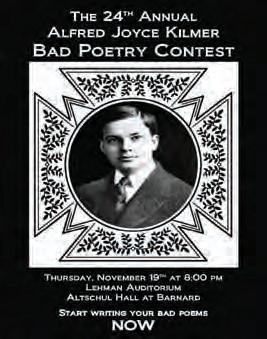

96 readerSdigeSt.co.Uk aUgUSt 2013
◄
Every year thousands of people put their faith and trust in Cats Protection when looking for a new addition to the family.
Behind each volunteer and member of staff is a wealth of experience and expertise which means when you adopt one of our cats, you can feel safe in the knowledge that he has been given the best possible care.
When he leaves Cats Protection, your cat will have been treated to a top-to-tail medical.
This means he will have been:
• Fully examined by a veterinary surgeon
• Vaccinated at least once against flu and enteritis
• Treated against fleas, roundworm and tapeworm
• Neutered if old enough
• Microchipped

We also provide four weeks’ free insurance (terms and conditions apply) giving invaluable peace of mind and reassurance as you and your cat embark upon this lifelong friendship.
All he needs now is a loving home to make his dreams come true – over to you!

Find a Cats Protection cat looking for a home in your area. Simply scan the QR code with your smart-phone to use our new find-a-cat search tool, or get in touch on the details below. Thank you.
T: 03000 12 12 12
E: helpline@cats.org.uk
W: www.cats.org.uk
Reg Charity 203644 (England and Wales) and SC037711 (Scotland)
HOW
TO… BY LINDA GRAY

EVERYONE SHOULD KNOW 1,001 Things
Welcome to the pages that help make life simpler, easier and—we hope—more fun!
How to PICNIC IN COMFORT
It’s not the corkscrew or picnic rug that most of us forget but thinking ahead, says Annie Bell—and, as author of The Picnic Cookbook (£15.99), she should know.
Start by choosing a wonderful picnic spot (if you’re stumped, there’s a list on visitbritain.org). That way, you won’t end up in a lay-by and you can take exactly what you need. No one wants to lug a table and hamper to a remote beach, so save those for feasts with a car park nearby. If you’ll be walking any distance,

THOMAS TOLSTRUP/THE IMAGE BANK/GETTY IMAGES
98
think small and light, with finger food in a cool bag and disposable bamboo plates —“much nicer than plastic”, says Bell.
Pack the night before so you won’t forget rubbish bags or the sharp knife you’ll need to divvy up the quiche (or, better still, Bell’s asparagus and smoked-salmon frittata). You can see o most natural disasters with a windbreak, a wasp deterrent such as Waspinator (£12.95), sun hats if it’s scorching (we wish!) and ball games to warm everyone up. But pray for fair weather, because it’s no fun picnicking in the rain.
Should you wake up to a clear blue day with no plans, try this impromptu picnic. Roast a chicken and pack it before it cools, along with sourdough bread to mop up the juices, peppery green salad, vine tomatoes and a (screwtop) bottle of wine. Mmm...

How to BE BETTER CONNECTED
If 99.7% of us can get a mobile-phone signal, as Ofcom says, how come it vanishes as soon as we drive out of town? It’s because the figure refers to people rather than places, and 13% of the UK has no service. But though there’s nothing we can do in a “notspot”, there are ways to improve reception in areas where it’s patchy.
Networks di er, so consult Ofcom’s mobilereception map before taking out a contract and make sure it contains a coverage guarantee. Even then, walls can block the signal indoors, which is where Orange’s Signal Boost (free) and Vodafone’s Sure Signal (£100, but handles multiple phones) come in. But as both need broadband—in other words, a phone line—you could simply set your voicemail to direct callers to your landline instead.
Outside, options are more limited. If you use your mobile in a car, a hands-free kit with an external antenna that searches for a signal is the best solution. On foot, the Open Signal app for smartphones shows you how to get closer to the nearest phone mast. Easiest of all, change the way you hold your mobile in case you’re blocking the antenna. With luck, the answer could be a lighter touch.
Wherever you are, avoid cheap mobile boosters called repeaters. Though widely available online, they’re illegal in the UK and using one could take you to one place where reception is banned—jail. ►



How to BECOME A MENTOR
Nothing in common with Simon Cowell or Alan Sugar? Rest assured that mentoring is very di erent in real life. Good mentors don’t give advice or wade in to sort problems, and they never, ever bully. The idea is to help their protégés think things through for themselves. “They guide and support, sharing their experience so the other person learns from it,” says mentor Elsa Caleb of business support firm ECJ Associates. Keen to try? Then practise this on a friend:
1. Check your body language, which accounts for 55% of communication.
2. Ask, “What do you hope to learn from mentoring?” so you can focus on the other person’s needs.
3. Listen actively, without being distracted by your own thoughts, then summarise what they say.
4. Challenge their interpretation of events. For example, asking, “Why do you think that happened?” helps them reflect on their experience.
5. Turn talk into action. Ask them to create a personal-development plan and implement the first step before you meet again.
6. Give feedback each time you meet. “But it should be two-way,” cautions Caleb. “You need to know if you’re helping them.”
Many professions have a mentoring scheme and SFEDI (Small Firms Enterprise Development Initiative) trains mentors with business experience. Otherwise, try the National Council for Voluntary Organisations (ncvo-vol.org.uk) or horsesmouth. co.uk, which gives support online. “Never think, I’ve nothing to give,” says Elsa Caleb. “You can change someone’s life and, in turn, that changes you.”


How to BEAT HOLIDAY BLUES

Holidays may help us recharge our batteries and see o stress, but our spirits descend along with the plane, and the benefits vanish within a week, says Dr Christian Jarrett, author of 30Second Psychology (£12.99).
Luckily, we can postpone the post-holiday dip. Leaving work promptly and prioritising what’s urgent is a start. Use the time to relive some of those holiday highs —taking a leisurely lunch, seeing new places or swimming—and begin planning the next break.
Sometimes the blues strike while we’re away, especially if we’ve invested emotionally and financially in a trip. Perfectionists are at risk of falling ill, while workaholics and extroverts feel bored. Taking shorter breaks more often could be the answer because people feel happier after three to six days away.
What really counts is what we remember, so aim for one truly amazing day. It needn’t even be positive. “Situations that seem annoying at the time may end up becoming treasured memories— stories that bind you all together in years to come,” says Jarrett.
GLOBALSTOCK/GETTY IMAGES; EMMANUEL FAURE/THE IMAGE BANK/GETTY IMAGES 1,001 THINGS
How to SPEAK FASHION
WOMEN’S WEAR Boyfriend (1) (think jeans and blazers) means baggy and often looks best on the petite. Beware oversized, which is beyond big, and also mum jeans once a term of abuse but now trending in Topshop. In contrast, body con (2) is clingy because clothes contain elastane, as in the bandage dress, made from stretchy strips.





Fierce (3) is not a criticism but admiration for dominatrix chic, especially shoes. Rock means to wear a demanding style with attitude, as in “Miley Cyrus rocks a side-boob.” Or indeed, the colour-block trend that combines clashing colours, sometimes in the same garment. In contrast, a pop of colour (4) recognises that a belt, shoes or bag is the only sane way to wear workmen’s orange.



MEN’S ROOM Chinos (5) are cotton trousers inspired by the military. See also cargo pants with pockets on the legs, designed to store bullets. More technically, Oxford is way of constructing formal shoes (6) and also a cotton basketweave cloth used for shirts (7).





GENDER NEUTRAL Rise is the distance from crotch to waist. Look for regular rise (12in) rather than low rise (8in or less) unless you want to flaunt some flesh. Luxe is short for “de luxe”, but not always formal: “luxe sportswear” is made from
It’s already AW13, which, in case you’re wondering, isn’t a postcode but shorthand for autumn/winter 2013 and the reason the shops are stocking boots instead of swimwear. Other fashion terms are even more confusing and can cause problems when shopping online—so here’s how to crack the code. ►



fabrics inappropriate for the gym. Grunge means unkempt, while urban is inspired by hip-hop stars. (Think baggy pants, hoodies and high-top trainers for men; cut-o shorts and skimpy tops for women, and plenty of bling for both.)
101 AUGUST 2013READERSDIGEST.CO.UK
➊ ➋ ➌ ➍ ➎ ➏ ➐
How to RECLAIM A FRONT GARDEN
Look through most front windows and what we see is a car park. One in four front gardens is now significantly paved, and as this increases the risk of flooding, it often requires planning permission. So why not spend the £172 fee on a green oasis instead?

WHAT YOUR TOUR GUIDE
WON’T TELL YOU


requires planning




Even a small front garden has a corner where plants will grow, says Leigh Hunt, adviser for the Royal Horticultural Society. (See Gardening Matters: Front Gardens on rhs.org.uk.)
Try to squeeze in a small tree like Lobner’s magnolia or a fragrant evergreen shrub like skimmia or Mexican orange blossom. Run clematis alpina, hydrangea or ceanothus up fences and walls, or plant a hedge if there’s space.
If you can fit in a border, grow Rozanne geraniums, Michaelmas daisies, Japanese anemones and periwinkle, which survives even dry shade. If not, fill containers with petunias and tobacco plants in summer, swapping to winter pansies in autumn.
More ambitiously, go for lowkey parking, with paved tracks and gravel plus reinforced grass for visitors’ cars. Then screen vehicles from sight behind a box or lavender hedge and enjoy!
● There’s always a troublemaker. They’ve seen The White Queen on telly so they’re an instant expert. But as they always make the same corny jokes, I’m ready with a put-down—so be warned!
● I hate holding up a brolly. I prefer wearing a bright colour so I’m easily spotted instead. But if I’m leading a large group in a busy place, an umbrella is essential.
● If you take photos non-stop, you’ll miss out. Why pay me if you don’t want to listen? Take an audio tour instead.
● Facts are not enough. I have to hold the group’s attention for hours at a time—which is where volunteers and graduate historians may struggle.
● Talk to the room guides if you want a free tour. Ask them to tell you about their favourite object and their best story. They’re usually permanent sta or volunteers who are passionate about the place and know more than any visiting guide.
● Saying “I don’t know” is better than busking it. If I’m stumped by your question, I’ll o er to find out and email you the answer. Unlike some guides, who simply make it up.
● The tour isn’t always as advertised and not just because

SOURCES: CITY OF LONDON TOURIST GUIDES; GUILD OF REGISTERED TOUR GUIDES; AND THE NATIONAL TRUST. SPECIAL THANKS TO TOUR GUIDE GIRL, WHO RUNS TOURBAUCHERY WALKING TOURS IN LONDON (TOURBAUCHERY. CO.UK)
READERSDIGEST.CO.UK AUGUST 2013 102 1,001 THINGS
CAROLINE MARDON/GAP PHOTOS/GETTY IMAGES
a building is closed for repair. I also have to make changes if a large number of tourists come with pushchairs—or walking sticks.
● “All day” can mean all day on the bus. If the tour goes to Windsor, Bath and Stonehenge, you’ll be lucky to have an hour in each, including meals and comfort stops.
● I can’t tell you everything I know. If I’m part of a large organisation, I have to stick to the script. And if I work in a stately home, the family may

have secrets they want to keep to themselves.
● I’ll wait for you twice if you lag behind. After that, it’s up to you to catch up.
● The blue badge is a recognised sign of quality, which is why places like Westminster Abbey demand that guides have one. But other qualifications count too. Areas such as the City set their
own criteria and many tourist favourites (including the Abbey) run tours led by their own sta .
● Nothing beats local knowledge. That’s why I hand over to guides who live nearby when taking tours to hotspots abroad. In places like Pompeii and Olympia I’ve no option, because they insist on using their own people.
● The tour ends at a pub for a reason, and it’s not because we all need a drink. I’ll often get an, ahem, “discount” if I bring customers to a bar, shop or restaurant.
● I’m not being patronising. I have to spell things out because I can’t assume that everyone understands what I mean by “a church built by Wren”.
● Please express your gratitude. I’ll be delighted to hear you enjoyed it—and your tips mean I can earn a living wage.
● I’ll always mention the stairs. Mobility is essential on some tours, while others aren’t suitable for children. I’ll always warn you when you book, but if you turn up on spec, I may have to turn you away.
● Everyone laughs at fart jokes. If a group glazes over when I’m talking about Napoleon III, I simply mention his empress’s flatulence and they’re all ears. n
103 AUGUST 2013READERSDIGEST.CO.UK
BETSIE VAN DER MEER/TAXI/GETTY IMAGES
MEDICINE WITH MAX PEMBERTON

For best results: take one dose of
a stranger’s
kindness
Simone is sitting in front of me and crying. She looks away, embarrassed. “Sorry, doctor,” she says, dabbing her eyes with a tissue and trying to compose herself. “I shouldn’t be taking up your time like this.” Many of my patients are in desperate need, not just because of ill health, but because of their financial problems. And, as any doctor can tell you, poverty and illness are inextricably linked.
“Poverty” is a word that we read in reports, that tumbles easily from politicians’ mouths and is the subject of much debate and policy. But I’ve come face to face with real poverty in Simone. Each week after her bills are paid, she has £20 left to live on. From this, she has to buy food and clothes and pay for travel. She prioritises her daughter over herself and something as simple as a hole in her child’s shoe can mean Simone has to skip meals. In some ways, she could be criticised for having a child she can barely support. She herself looks back on her life and wishes she’d made di erent choices. Listening to this desperate yet determined woman, however,


I’ve come face to face with real poverty in Simone
works
I am humbled. She works part-time in a shop while her daughter—a bright, engaged eight-year-old—is at school. Simone proudly takes a photograph from her handbag of her daughter receiving the end-of-year prize for her academic achievements.
Simone is determined that her child will have every opportunity in life, and scours charity shops for books for her. Six months ago, though, Simone was involved in a road accident and this seems to have been the final straw. She slid into depression and, although she continued to work, began to feel that life was not worth living any
104 READERSDIGEST.CO.UK AUGUST 2013
FUSE/GETTY IMAGES
more. The GP’s referral letter had suggested that I might prescribe a suitable antidepressant, but it’s a sad truth that no pill can make Simone’s situation better.
But today Simone is not crying because of the bleakness of her situation. She’s crying because she’s overwhelmed by a stranger’s kindness. She shakes her head in disbelief as she tells me the story. One of the administration sta in the outpatient clinic had just won a £20 Marks & Spencer voucher in a ra e—and given it to Simone so she could treat her daughter, who often plays in the department while her mother sees me.
This simple gesture has e ectively doubled Simone’s income for the week. She’s never even shopped in Marks & Spencer. I think of all the £20s I’ve frittered away on bottles of wine or late-night taxis and instantly feel very ashamed. That sudden, impulsive act of generosity has made all the di erence to Simone. It’s not only the financial impact; it’s also shown her that in a world which must often seem cruel, scary and dark, there’s still kindness and compassion.
And there’s not a pill in the world I could prescribe that would give someone that feeling.
Max Pemberton is a hospital doctor and author. His most recent book is The Doctor Will See You Now








MEDICAL MYTHS— BUSTED!


WHAT’S THE TRUTH?
THE MYTH? READING IN DIM LIGHT DAMAGES YOUR EYES
Nearly every parent has, at one time or another, cited this myth when scolding their children for reading under the covers with only a torch. But it’s not true. There’s not a shred of evidence that doing any activity, including reading, in poor light damages the eyes or the eyesight. Anecdotal reports of people throughout history studying by candlelight and going blind as a result are wrong. Those people may well have lost their eyesight but it was nothing to do with working in poor light.
WHERE DID THE MYTH COME FROM?

Bad lighting can cause a sensation of having di culty focusing and it’s thought that this is the source of the myth—people assumed, wrongly, that this meant they must be damaging their eyes in some way. Reading in poor light also makes people blink less, which can lead to the eyes becoming dry and uncomfortable —again adding to the belief that they’ve been damaged. There is, however, no evidence that such eye strain does any permanent harm or changes the eye in any way.
SO THERE’S NOTHING TO WORRY ABOUT?
While good light will improve your ability to see clearly, it’s not necessary for eye health. So to all parents—sorry, but you’re going to have to find another excuse to tell your children to turn o the torch and go to sleep. ■
105 AUGUST 2013READERSDIGEST.CO.UK
ILLUSTRATED BY DAVIDHUMPHRIES.COM
YOUR FAVOURITE MAGAZINE IS NOW AVAILABLE ON THE NEWSSTAND. THE APPLE NEWSSTAND, THAT IS…

All you need is iOS 5 on your iPhone or iPad and away you go! You can buy either single issues of the magazine for £1.49 or—for just £11.99—you’ll get a whole year’s worth. What are you waiting for?
We’re now also available in the Google Play Store and on Amazon

HEALTH WITH SUSANNAH HICKLING

How you can have a healthy holiday–and still hit the buffet

Get active on those longawaited family hols, and you’ll avoid carrying extra weight when you come back. And we don’t mean in your suitcase...
1 BE A WATER BABY
Don’t spend all your time lying on the beach or by the pool. Make sure you get in the water for swimming, games or even walking. Just standing in waist-high water gives you a good workout.
2 MESS ABOUT IN BOATS
Canoeing is a joy—and paddle boats are fun; rowing boats, romantic; sailing boats, serene; kayaks, pure adventure. Whether you are propelling it or not, being on a boat burns calories and engages your muscles more than being on dry land.
3 PLAY GAMES
Make it your goal to play an outdoor game every day while on holiday. Even if it’s just some gentle badminton, table tennis or bowls, you’ll still be a winner when it comes to figure and fitness.
4 HOLD AN ODDBALL OLYMPICS
London 2012 may be behind us, but why not organise a mad mini-Olympics with the kids? Have a daily crazy competition in the pool—swimming between people’s legs, say. Or hold an animal race, where everyone chooses an animal, such as a monkey or a snake, and has to move like their chosen creature. Silly is the name of the game—it’s serious fun, not a serious competition.
5 TREAT YOURSELF— ONCE A DAY
Let’s face it, holidays are about good food. But you’ll enjoy it more—and stay trimmer—if you limit the splurges to one a day, rather than gorging constantly. So by all means go for the unlimited bu et or that great restaurant in the old town—just not at every meal.
107 AUGUST 2013READERSDIGEST.CO.UK
GLOW IMAGES, INC/GETTY IMAGES
►

MEN’S HEALTH SLEEPING YOUR WAY TO FITNESS
It’s time to wake up to the health benefits of getting a good night’s sleep. Medical science is increasingly linking lack of sleep to a range of health problems—and now a new study of 2,000 men from Iceland has shown that male insomniacs are twice as likely to develop prostate cancer. Everyone’s di erent but, ideally, you should try to get between six and nine hours of
6 GO GOLFING
Mini-golf, that is. The kids will love it, and you’ll burn more calories standing and walking than you would if you were lazing in a hammock.
7 GO ON A WORLD TOUR—AT HOME
Planning to stay put this summer? Take a virtual trip instead. Place a world map somewhere prominent in your house, then choose a destination and walk the equivalent distance to get there. Take daily walks using a pedometer—there are roughly 2,000 steps in a mile—then plot your progress on the map.
kip a night—in other words, enough to feel refreshed.
To improve your chances of sleeping well, go to bed and get up at the same time every day, avoid co ee and big meals late in the evening, keep your room dark and take a relaxing bath before bed. Drinking too much alcohol can also stop you getting a good
“You deal with the kids, love—I need to look after my health”

TRY THIS AT HOME
Some headaches can be relieved by plunging your hands or feet into a basin of iced water for between 30 seconds and ten minutes. The action changes the circulatory pressure in the brain. You can also try a cold compress on your head.
GO FIGURE
10%


The likely influence our genes have on how long or healthy our lives will be; the remaining 90 per cent is down to lifestyle.
108 READERSDIGEST.CO.UK AUGUST 2013
NADYA LUKIC/E+/GETTY IMAGES ►
HEALTH













Wish you could shop for a new bladder?
If your days out are being ruined by too many visits to the toilet you may be su ering from an overactive bladder.
Over 7 million people in the UK su er too, so you’re not alone.
Luckily there are treatment options available including e ective medications from your doctor.
To find out more about overactive bladder and the help available visit
www.bladderproblem.co.uk
Or call our free helpline on 0800
011
4766












VES12465UK / Nov 2012
NEW TAKES ON GREAT FOOD
Switch old faves for new raves—not only will you turn your diet from ho-hum to yum-yum, but you’ll get added health benefits too.
OLD FAVE: SPORTS DRINK | NEW RAVE: COCONUT WATER
Why switch? The water, from young green coconuts, contains only small amounts of natural sugars. A single cup (250ml) has about 50 per cent more potassium—which lowers blood pressure—than a banana. Unlike many sports drinks, it’s also low in calories.




OLD FAVE: SALMON | NEW RAVE: ARCTIC CHAR
Why switch? The char has about the same amount of omega-3 fatty acids, but is slightly sweeter and more delicate in texture. Omega 3 is important for heart health.
OLD FAVE: OLIVE OIL | NEW RAVE: AVOCADO OIL
Why switch? The avocado oil contains lutein, which helps promote healthy vision and—like olive oil—is high in heart-healthy monounsaturated fats.
Yoga develops your flexibility and can help prevent and relieve symptoms of arthritis— the leading cause of disability in Britain according to Arthritis Research UK. It improves muscle tone too.

BEND IT SHAPE IT

chances of avoiding cardiovascular disease and so of living to a ripe old age. A 2012 review of research showed that yoga can lower blood pressure, cholesterol and glucose levels.

Yoga soothes back pain. back pain is also linked to a high risk of falling in the elderly, but yoga postures can help strengthen core muscles— diminishing the risk, lessening the pain and improving balance.
Yoga soothes back pain. Chronic
Can yoga keep you young? Research suggests that the answer is yes

Yoga can beat stress and —both of which may lead to age-related diseases, including cancer.
Yoga boosts heart health. The more you do to keep your ticker in shape, the better your depression cancer.
a new pattern of breathing demanding be
Yoga can break the cycle of unchecked stress by teaching a new pattern of breathing slowly and deeply, even when your body is in a physically demanding position. Your brain will then be trained to remain calm under pressure. ■
110 HEALTH FOR MORE ON HEALTH, GO TO READERSDIGEST.CO.UK/HEALTH
PUCCINI’S

“a powerful show… held the huge audience captive”
EVENING STANDARD
STAGED IN THE ROUND SUNG IN ITALIAN WITH ENGLISH SURTITLES
THURSDAY 27 FEBRUARY - SUNDAY 9 MARCH 2014

ROYAL ALBERT HALL BOX OFFICE 020 7838 3100 BOOK ONLINE ROYALALBERTHALL.COM
LA U OHÈME
RAYMOND GUBBAY AND THE ROYAL ALBERT HALL PRESENT

Hanging onto the telephone, especially when drunk…
QI lost my phone and wanted to claim a new one on my insurance, but the claims supervisor kept trying to suggest that I was drunk when I lost it. He’s being rude, but if I was a bit tipsy would it a ect the claim?
AThere’s no excuse for rudeness, but it’s increasingly a key issue with regard to insurance claims—and not just with the major phone providers. You’re unlikely to su er any loss because the phone companies haven’t entered this territory, but there’s been an increase in the prevalence of alcohol-exclusion clauses in insurance contracts—your policy could be void if it can be said that the consumption of booze seriously a ected your judgement or impaired your physical movements.

came to my door chasing it, so my wife and I panicked separately and got two by mistake. Now they’re putting inordinate obstacles in our way of getting a refund on the second licence.

A
Typically utilities bark loud and fast about delayed or late payments, but are notoriously slow in refunding when necessary. I’m afraid you’ll have to jump through their hoops to get your money back. Their processes are arcane, and unfortunately there’s no prospect of them changing any time soon.
You may think the whole point of going on holiday is to have a few drinks, but beware the cold, sober winds of reality and check your insurance policy in advance.
QI’ve accidentally paid for two TV licences on the same property. I was a little late with payment and someone
70The number of cold calls we receive at home every year.
This is rather unfair, particularly when it’s a criminal o ence not to possess a TV licence—I’ve come across people being prosecuted for a payment that’s even one day late, so in the meantime be grateful that this didn’t happen to you. This is why direct debit is so useful, because you don’t actually have to think about it.
Donal MacIntyre is an investigative journalist and a former presenter of ITV’s London Tonight. Please email queries to excerpts@readersdigest.co.uk
100The number of cold calls a direct marketer typically makes every day.
2 minutes
The average length of a cold call. In our lifetime, we’ll have spent over a week receiving and rejecting cold calls. ■
112 READERSDIGEST.CO.UK AUGUST 2013
MACINTYRE
CONSUMER WITH DONAL
Modern Homes in beautiful locations

Would you like to downsize, release capital and be able to make the most of your leisure time...
You could move to a beautiful location and have a new detached home with a high-spec interior, that’s a delight to live in and easy to maintain. Its simpler than you think with The Park Life Group - with over 50 parks across 17 counties. People from all walks of life choose to live in a park home, or buy one as a second home, and become part of a friendly community. With almost 70 years of excellence, The Park Life Group offers remarkable value for money and superb customer service. Come and see for yourself at one of our Open Days and go to www.parklifegroup.com for more details.
Open weekends:
Truro Heights - 27 & 28 JULY
Kenwyh Hill, Truro, TR1 3DY
Tregatillian Park - 27 & 28 JULY
St Columb Major, TR9 6JL
Thornlea Park - 27 & 28 JULY
Littlehampton, West Sussex BN17 7QD
Hedge Barton Park - 27 & 28 JULY
Fordcombe, Tunbridge Wells, Kent TN3 0SL
Radwell Court - 3 & 4 AUG
Radwell, Bedfordshire, MK43 7HS
Folly Park - 3 & 4 AUG
Clapham, Bedfordshire MK41 6AL
Peppercorn Park - 3 & 4 AUG
Clapham, Bedfordshire MK41 6HB
Kingsmead Park - 3 & 4 AUG
Rushden, Northants NN10 0NF
Cotswold Manor - 10 & 11 AUG
Stratford Bridge, Ripple, GL20 6HE
Cheltenham Spa Parks -10 & 11 AUG
Bamfurlong Lane, Staverton, GL51 6TD
Takeley Park - 10 & 11 AUG
Takeley Park, Takeley, CM22 6TD
Braintree Park - 10 & 11 AUG
Coggeshall Road, Braintree, CM7 9DW
Rymer Point Park - 10 & 11 AUG
Barnham, Nr Bury St Edmunds IP24 2PY
Waterbeach Park - 10 & 11 AUG
Denny End Road, Waterbeach CB25 9PF
Regency Court - 10 & 11 AUG
Allhallows-on-sea, Rochester, ME3 9TD
Wickham Court - 17 & 18 AUG
Fareham, Hants PO17 6JS
Organford Manor - 17 & 18 AUG
Poole, Dorset BH16 6ES
Westgate Park - 17 & 18 AUG
Westgate, Sleaford, NG34 7QP
Roecliffe Park - 17 & 18 AUG
Roecliffe, North Yorkshire, YO51 9LY
Truro Heights - 31 AUG & 1 SEP
Kenwyh Hill, Truro, TR1 3DY
Tregatillian Park - 31 AUG & 1 SEP
St Columb Major, TR9 6JL
Thornlea Park - 31 AUG & 1 SEP
Littlehampton, West Sussex BN17 7QD
Hedge Barton Park - 31 AUG & 1 SEP
Fordcombe, Tunbridge Wells, Kent TN3 0SL








OMAR MIDDLETON NEW TWO BED HOME STATELY PLAT. CONT. NEW TWO BED HOME These are just
of the stunning homes available. Call us today or visit our website for more details of homes and plots available across the country. Or experience our parks for yourself by coming along to one of our Open Days. SPECIAL OFFER SPECIAL OFFER FREE PITCH FEES in first year when you buy a new home from the Park Life Group TERMS AND CONDITIONS APPLY SEE WEBSITE Homes Available from £89,995 Part Exchange Example: Park Home Price: £129,950 House Price: £200,000 Cash to you: £70,050 Part Exchange Available: Solicitor and Agents fees paid. LINES OPEN 7 DAYS A WEEK 01242 30 02 92 www.parklifegroup.com
some
MONEY WITH JASMINE BIRTLES

Economy drive: how to cut the cost of motoring

Running a car seems to get more expensive by the day— but follow these tips and you could make some serious savings
l SAVE ON PETROL—AND AVOID TRAFFIC TOO
Always check on PetrolPrices.com before you go out to fill up. This website compares 11,000 petrol stations to find the cheapest one in your area. Simply type in your postcode or town, and it does the rest for you.
Or if you’re into apps, download Waze—which enables you to join forces with other people in your community to avoid congestion and save money on petrol. Local drivers share tra c information so you
don’t waste time and money in jams. They also report on local pump prices so you can avoid paying through the nose.
l FILL YOUR EMPTY SEATS
If you’re driving somewhere, you could get some money back by giving someone else a lift. The car-sharing site BlaBlaCar.com connects you with paying passengers who want to travel where you’re going. O ering them a ride takes only a couple of seconds on the site or the mobile app, and by taking two passengers you can save no less than 88% of your fuel costs on longdistance journeys. Alternatively, you could even ditch your car altogether and become a regular passenger through BlaBlaCar instead.
l DRIVE SMARTLY
The Energy Saving Trust estimates that the average UK driver could save between £300 and £350 of petrol costs a year just by being cleverer with their driving. Basic tips include going no faster than 70mph, closing your windows when travelling at
BY PAUL WOOD
114 READERSDIGEST.CO.UK AUGUST 2013
CARTOON
more than 60mph to reduce aerodynamic drag, unloading unnecessary items from your boot and switching o your engine when stationary for more than a minute. Check your tyre pressure regularly too, as that can a ect your driving e ciency.
l PARK FOR LESS
By logging onto ParkatmyHouse. com or Parklet.co.uk, you can park in people’s driveways for much less than you’d pay for commercial spaces. For example, a week’s public parking near Heathrow Airport costs between £70 and £120. Renting a private space through ParkatmyHouse can be as little as £20.
l GET MONEY BACK ON YOUR PARKING TICKETS
If you’ve had a ticket and you don’t think it’s fair, then appeal. You have a good chance of getting your money refunded. Figures from the Tra c Penalty Tribunal show that more than 60% of appeals result in a win for the motorists.
Not only that, but according to PATROL (Parking and Tra c Regulations Outside London), if any of the information in the Penalty Charge Notice—such as the size of the fine or the reason for the ticket—is wrong or incomplete, the ticket is invalid.



THIS MONTH’S BARGAIN
Get 20% o great designer shirts at IVcu . co.uk with our exclusive code. For your discount, just put in DIGEST when you get to the checkout.
O er closes August 30, 2013.
IS EQUITY RELEASE RIGHT FOR YOU?
Equity release allows you to get money from your property without selling it. If you’re retired and struggling financially, it can be a useful source of ready cash—but here’s what you need to know first.
What types of equity schemes are available?
There are two types you could go for.



The first is a home reversion scheme, which involves you selling a share of your property for less than the market value to an equity release company. The company pays you either a large lump sum upfront or a monthly amount until you either die or move into long-term care. Once this happens, the provider will be entitled to its share of the property’s value at the going market rate, and what’s left goes to your estate.
FASCINATING FACT
A survey from Barclays has found that the average Brit loses around £760 a year in unexpected costs. In the top ten of these regular nasty surprises are car repairs, parking fines and speeding tickets.

The second option is a lifetime mortgage. This enables you to take out a loan on your property in return for a tax-free lump sum, an income or a combination of the two. Much like a
115 AUGUST 2013READERSDIGEST.CO.UK
►
standard mortgage, the loan is secured against your property. The di erence is that it doesn’t have to be repaid until after you die.
Hasn’t equity release had a bad press?
In the past, it has had quite a negative image—and often rightly so. There have been some shocking scandals and a number of older people have been fleeced. More recently, though, much has been done to regulate the schemes properly and most of the cowboys have been run out of town. However, equity release still has potential pitfalls and you have to be very careful before you sign up.
What are the advantages of equity release?
l It allows you to stay in your home and still have money to spend in retirement.
l It can really cut down the inheritance tax bill your children would have to pay.
THE ONE THING YOU MUST DO THIS MONTH...
l If you don’t have anyone to leave your worldly goods to, it makes sense to make the most of all your assets yourself.
And the disadvantages?
l It can a ect the state benefits and tax credits you are entitled to, because it e ectively increases your income.
l It’s often expensive to arrange, owing to additional legal and valuation costs.
l The interest rates are significantly higher than normal mortgage rates, meaning you could be left with a lot less than you anticipated.
l It’s often inflexible and can be very complicated.
l It can mean you have little or no inheritance to leave your children.
To find out more about equity release, get in touch with the Equity Release Council (equityreleasecouncil.com). And if you do decide to go for it, make sure it’s with a company that’s a member of the council.



for over-60s, so make sure you
...is to switch your gas and electricity providers to a cheaper supplier. Fuel prices tend to go up in September, so if you can get a fixed deal now, you’re likely to save over the next 12 months. Try LSIutilitybroker.co.uk and energyhelpline. com to find the cheapest o er. And don’t forget that there are often even cheaper deals for over-60s, so make sure you enter your age if you’re a senior.
JARGON BUSTER FREDDIE MAC, FANNIE MAE
These are the nicknames for the Federal Home Loan Mortgage Corporation and the Federal National Mortgage Association in America. They don’t lend directly to homebuyers, but are responsible for providing a large part of the money lent out as mortgages. They’re privately owned, but after they almost went bust in the financial crisis, the government put them into “conservatorship” to make sure that can’t happen. ■
Jasmine Birtles is a personal finance writer and the founder of moneymagpie.com
116
FOR MORE ON MONEY, GO TO READERSDIGEST.CO.UK/FINANCIALSERVICES MONEY
◄






Remember when we thought we knew what the world of tomorrow would be like? Nobody really knows what the future holds, but we’re fairly sure that no matter what, you’ll want to be financially secure. Reader’s Digest have an exciting partnership with LV= and that’s just the sort of thing LV= have been helping out with for 170 years. For more information, give their earth-based call centre a ring today. Let

Liverpool Victoria Friendly Society Limited: County Gates, Bournemouth BH1 2NF Vivat Finance Limited (trading as Reader’s Digest Financial Services) acts as an introducer appointed representative to Liverpool Victoria Friendly Society Limited (LVFS) for life protection products and to Liverpool Victoria Financial Advice Services Limited (LVFAS) for advice on retirement products. Vivat Finance Limited is registered in England No. 07205138. Registered office: 1 Eversholt Street, 9th Floor, London, NW1 2DN. LV= is a registered trade mark of LVFS and a trading style of the Liverpool Victoria group of companies. LVFAS registered in England No. 3027145, is authorised and regulated by the Financial Conduct Authority, register number 186890. LVFAS is a wholly owned subsidiary of LVFS. LVFS is authorised by the Prudential Regulation Authority, and regulated by the Financial Conduct Authority and the Prudential Regulation Authority, register number 110035. Registered address for both companies: County Gates, Bournemouth BH1 2NF. Tel: 01202 292333 21334635 05/13
our
in an
Plus plan:
170 Annuities: 08000 234 186 Provided by Lines open 9am-8pm Mon – Thurs, 9am-5pm Fri. For textphone, dial 18001 first. We may record and/or monitor calls for training and audit purposes
Helping
customers
ever-changing world 50
08000 234
us help you be ready for it. No-one knows what the future holds.
FAST FOOD
Tasty recipes you can make in just 30 minutes
Fritattas are not only easier to make than quiches—but, because they don’t have pastry, they’re healthier too. Serve this one hot or cold, with crusty bread and a tomato salad.
NUTTY SPINACH AND MUSHROOM FRITATTA (Serves 4)

1. Preheat the grill to high. Rinse and dry the spinach and parsley, and chop enough parsley to give 2tbs. Set aside.
2. Heat the oil in a large frying pan. Halve, peel and finely chop the onion. Fry over a moderate heat for 3–4 minutes, stirring, until soft.
3. Clean and quarter the mushrooms. Add them to the chopped onion and fry, stirring frequently, for a further 3–4 minutes.
250g young spinach leaves
Small bunch of fresh parsley
2tbs olive oil
1 small onion
350g small, closed cup
mushrooms
75g roasted cashew nuts
5 medium eggs
Salt and black pepper
85g vegetarian cheddar or Parmesan cheese
4. Add the spinach and cook over a fairly high heat, stirring frequently, for 3–4 minutes, until the leaves have wilted and the excess liquid has evaporated. Stir in the cashews and turn the heat down to low.
5. Break the eggs into a bowl, add 2tbs of cold water and the chopped parsley. Add the seasoning and beat together.
6. Pour the egg mixture into the
spinach and cook for 5 minutes until the egg is just set and golden underneath, lifting the edges to let the uncooked egg run underneath.
7. Grate the cheese, sprinkle it over the top and grill for 2–3 minutes, until the fritatta is set and golden, making sure the handle of the frying pan doesn’t burn. Alternatively, place the fritatta on a baking tray under the grill. ■
118
PHOTOGRAPHED BY FABFOODPIX

For the chance to win our biggest cash prize yet of £77,700 CASH simply solve the puzzle and register your answer on the freephone entry line below by Thursday 22nd of August!
Because £77,700 is our largest ever cash prize you must solve one of our most difficult puzzles – we have included some difficult words and they can read forwards, backwards AND diagonally
We have other bonus cash prizes to give away as well, giving you a total of seventy-seven chances to win cash!
Entry is free from a BT landline provided you’re able to solve the puzzle and register your answers by Thursday 22nd of August. All you have to do is find the ONE word that can NOT be found in the puzzle grid.
Based on 2012 readership figures, less than 1% of readers submitted correct answers to the Wordsearch Cash Giveaway competition*
*statistics independently verified by LMG Accountants
Only a small percentage of potential competitors will submit correct answers in time.
Remember words may read diagonally!
This tremendous cash prize sum of £77,700 has now been safely set aside under authorization by competition
EQLPWKMFDTLGJMTVH
IEHECONOMETRICSGI
SZHTTBUHQGYSPGNBG
EIQJKELECTROLYSIS
RGQMYLOBENOBHSIWK
ER R EVTNRVPWEIVCTZ
NPNGEMEUAOXWUEDGU
DT K DOHGRBBJX U HLFH
I FZFTVUNKCSXVQSZL
PGZAZCITHVBWEYHLJ
IREVZATAF Q IGTJMUG
TFOHRG H RLREZTVLZJ
ODRSEAZITBTMTRBCV
U OPWLJHORSESH O EXH
SGXF T HZYDLFA O MLNS
SECLO V ERQVVFVN M XG
managers to be paid out following a successful draw.
Please note: you must be a British Resident over 18 to qualify. Strictly ONE entry per person.
If you meet the criteria above, submit your free
SERENDIPITOUS
entry now – entry takes less than one minute and your entry will be confirmed over the phone and in writing if you’re correct. Don’t miss out – ENTRY LINE CLOSES THURSDAY 22ND O F AU GU ST !
0800 063 9213
If
*YOU MUST BE A UK RESIDENT OVER 18 TO PARTICIPATE. CALLS LAST UNDER 1 MINUTE AND ARE FREE FROM A BT LANDLINE. CALLS FROM MOBILE NETWORKS WILL NOT BE INCLUDED IN YOUR STANDARD INCLUSIVE MINUTES AND WILL INCUR AN ADDITIONAL CHARGE. Competition name: Lucky 7 Cash Giveaway. This competition may be advertised in various forms of print and online media and may include different graphic representations and layouts. As a responder to this promotion Churchcastle Ltd and other 3rd party companies may contact you with offers by post or text. If you don’t wish to receive these offers write to Dept O, 6 Castleham Road, St Leonards on Sea, TN38 9NR or call 0808 126 3083. One entry per person. Postal responses close 1 week from the on sale date of this publication. Each correct entrant is allocated a unique number between 1 and 777,777. The winning number will be independently drawn and the £77,700 prize will be awarded if there is an exact match with an active entry. Bonus prizes available: 3 x £7000; 15 x £700; 58 x £70. One number will be drawn for each bonus prize and the prize will be awarded if there is a match with an active entry. Approximate odds of winning a cash prize: 1:10101. Draw date: 04/10/2013. Participating in this competition constitutes the right to use the name, hometown, testimonial and photograph of all winners for promotional purposes without further consent. Actors’ photos may be used to represent genuine winners.This skill competition is not connected to this publication. The organisers are not responsible for printing or technical errors and reserve the right to amend competition details, entrants unique numbers and the draw process in order to ensure a fair draw. Our Registered Office is 21 Buckle Street, London E1 8NN, but if you have any queries about this competition, please write to: Lucky 7 Cash Giveaway, 6 Castleham Road, St Leonards on Sea, TN38 9NR or call 0142 479 7531. © Churchcastle Ltd 2013. T/A Lucky 7 Cash Giveaway. Job number 1671. Registered in England No. 4301808.
Advertisement Try to find the words hidden in the grid. Simply identify the ONE word that is MISSING from the grid for the chance to win £77,700 cash!
£77,700 FREEPHONE ENTRY LINE
Seven Thousand & Seven Hundred Pounds – Closes Thursday 22nd of August!
WIN£77,700! Seventy
Confirm your entry in less than 1 minute by Thursday 22nd of August
your answer is correct we will be in contact by post.
...................................
CLOVER SEVEN ELECTROLYSIS WISHBONE FEATHER ECONOMETRICS HORSESHOE RAINBOW
Keeping plants watered and ensuring flowers bloom


QI’m having real problems with bindweed on my climbing plants. How do I get rid of it?
A Midsummer is a good time to tackle this and other tenacious weeds, before they flower and set seed. Glyphosate is the best weedkiller to use, but because it kills any growth it touches, start by training the
bindweed away from the host climber by sticking bamboo canes into the ground, up which the weed can grow. Then slip the weed o the canes and apply the glyphosate within a polythene bag to prevent it from coming into contact with other plants
Q My last attempt at growing roses was a bit of a failure. What am I doing wrong?
A For a start, avoid planting new roses where roses grew before, as they’re unlikely to thrive due to replant disease (which isn’t fully understood).
If you have nowhere else to plant, replace the soil. Dig a hole for each new plant, about 2ft wide and 18in deep. Remove the soil to elsewhere in the garden and replace it with a mixture of fresh topsoil and garden compost or well-rotted manure.
Q My gardening is restricted to a few pot plants on my patio, but I’m never sure how much to water them at this time of year. Can you help?
A Watering can become a real time-consuming chore in the summer. If the weather
121 AUGUST 2013READERSDIGEST.CO.UK
GARDENING
MARTIN HUGHES-JONES/ALAMY ►
Stop plants getting in a bit of a bind
is hot, you’re looking at watering your pot plants once or even twice a day.
The problem is the limited root area and the “umbrella” of foliage that keeps most rainfall o the compost. But the frequency of watering can be reduced by using waterretaining gels or pellets and favouring larger containers. Better still, consider installing an automatic watering system —then you won’t have to bother your neighbours when you go on holiday.
QI find that my greenhouse gets too hot at this time of year, often scorching my foliage. I’ve tried fitting blinds and opening all the doors and ventilators, but do you have any other heat-reducing tips?
AIdeally, you don’t want temperatures to rise much beyond 20C. As well as the techniques you’ve mentioned, apply another coat of shade paint to the outside glass, cover seedlings with sheets of newspaper on bright days, and damp down the floor and surfaces every day. And, as with the rest of the garden, make sure you water everything regularly —early signs of water stress include flagging or lacklustre leaves and a dry, stale smell as you enter the greenhouse.


AUGUST CHECKLIST
Send your gardening questions to excerpts@readersdigest.co.uk
● Spring bulbs will require dividing or storing, the new season’s bulbs need tending, and autumnflowering bulbs should be planted.
● Keep plants at their best by staking, thinning and deadheading, and—with an eye to the future—take a few cuttings of tender perennials.
regular routine of
● Also maintain a regular routine of watering, weeding, pruning, hedge trimming and pest control.


the



reader’s tip



Cheap vented
Cheap vented microwave plate covers make excellent mini cloches. These ones cost only £1 each. ■
Many thanks to Lucy Travell of Gloucester for sending this in
Email your gardening tips and ideas—with photos, if possible—to excerpts@readersdigest.co.uk. We’ll pay £50 if we use them on this page.
122 READERSDIGEST.CO.UK AUGUST 2013
◄
How just £15 will help save our bees
BeesarevitaltosomuchofBritishlife: they help pollinate 75% of our food, keep our farms in business and help our gardens, parks and countryside to thrive. Disease, chemicals and disappearing green spaces have all contributed to their dramatic decline in recent years.
The full impact of losing British bees could be devastating. But thankfully, it’s not too late. You can save us – but please act now.
Donate £15 and get your Bee Saver Kit.
Call 0800 581 051 or text Bees to 66777 and we’ll call you.




andSomespeciesofbumblebees,honeybees partssolitarybeesareregularvisitorstomany ofthecountry.Usethishandybeechartandseehowmanycanyouspot.



EarlyMiningBee Andrenahaemorrhoa

BlueMasonBee Osmiacaerulescens

DaviesMiningBee Colletesdaviesanus



GardenBumblebee Bombushortorum

CommunalMiningBee Andrenacarantonica

Fabricus’NomadBee Nomadafabriciana




IvyMiningBee Colleteshederae



Willughby’sLeafcutterBee Megachilewillughbiella HoneyBee(queen) Apismellifera


White-tailedBumblebee Bombuslucornum


Red-tailedBumblebee Bombuslapidarius







*All texts will be charged at your normal network rate and someone from our team will phone you back free of charge.
Friends of the Earth Trust, a registered charity. www.foe.co.uk

Brown-bandedCarderBumblebee


Red-shankedCarder-bee Bombus

Short-hairedBumblebee BombusSubterraneus


www.foe.co.uk/ savebees
Mason Osmiarufa
HoneyBee(worker) Apismellifera TawnyMiningBee(male) Andrenafulva Hairy-footedFlowerBee(male)Anthophoraplumipes
TawnyMiningBee(female) Andrenafulva Hairy-footedFlowerBee(female) Anthophoraplumipes
RedMasonBee Osmiabicornis
CommonCarderBumblebee Bombuspascuorum Buff-tailedBumblebee Bombusterrestris
BEE Your Bee Saver
you
bees. All over the UK, Bee Savers are getting busy. This step-by-step guide will help you become a Bee Saver too.
you ready to earn your wings? THECAUSE
buzzing for bees today
Bee guideidentification THECAUSE
Kit Everything
need to get busy for
Are
Get
Fabricus’NomadBee Nomadafabriciana DaviesMiningBee Colletesdaviesanus
Spring Summ Autumn Winter MarAprMayJunJulAugSepOctNovDecJFeb Helleb Rosemary Lungwort Geranium Apples & pears Chives Thyme Rock rose Lavender Raspberry Honeysuckle Artichokes Heather Runner beans Sunflow Hebe Michaelma dais Anise hyssop Blue Satin Hibiscus Mahonia Ivy Sarcococca Arcacia Build a inyourback garden pple ssom Chives Honeys le Geranium Rosemary Lavend Sunflower
White-tailedBumblebee Bombuslucornum CommunalMiningBee Andrenacarantonica BlueMasonBee Osmiacaerulescens IvyMiningBee Colleteshederae Winter
British wildflower seeds
ONLINE WITH MARTHA LANE FOX


How technology can help you fi nd your inner artist
Last Valentine’s Day, as the clock struck midnight, Tracey Emin’s digital collection “I Promise to Love You” illuminated 15 Times Square billboards with digital messages of love.
Part of “Midnight Moment”, Emin is one of a host of artists using tech to stamp and share creativity across (and beyond) New York’s legendary commercial district. Her goal? To make us think about how we feel. She chose to do this digitally because that’s how she thought we’d best understand, identify and respond.

“Digital art”, “internet art” or “net art”, as it’s variously known, is nothing new. Starting from the 1960s, London’s Victoria and Albert museum has a collection of computer-generated works varying from the experimental crankings of colossal analogue machines by early programmers to contemporary digital prints.
Technology cannot maketh an artist, but fresh innovation has boundlessly extended
Painted love: Tracey Emin’s digital memos at New York’s Times Square
audiences, imagination and collaboration beyond the reach of a mere gallery. Spawning a world of creativity for many, it’s inspired a seismic shift in the way we can enjoy and even collect art.
While galleries increasingly put their collections online, recent Arts Council England and BBC collaboration The Space Collection (thespace.org), even provides free and on-demand access to the work of artists and arts organisations—including
124 READERSDIGEST.CO.UK AUGUST 2013
theatre, concerts, opera, dance, film and more—to every screen.
David Hockney, one of the most notable artists to embrace the iPad, once declared that he frequently makes drawings at 6am and sends them out by 7am (without having brushes to clean either). For his Paris show, iPads helped visitors see works as he had. Taking iPad illustration to another extreme, artists Andre Woolery and Victor Abijaoudi’s series Invisible Hieroglyphics lifted fingerprints to capture how we interact with apps and social networks.
From as little as a tenner, sites such as seditionart.com, where you’ll find Emin’s collection, and Artfinder. com now let anyone collect art. Once the preserve of the rich, these sites are stu ed with digital works by the world’s leading contemporary artists —collections can be accessed anytime, anywhere, thanks to smartphones, tablets and smart TVs.
TRY THESE
● The Brushes app, reportedly used by Hockney, provides a colour wheel/picker and allows you to work with layers and switch between brushes. You can even record each stroke and play it back to see how you produced your piece. Alternatively, try SketchBook Pro.
● Tour a gallery of 45,000 works by more than 10,000 artists from hundreds of museums, cultural institutions and archives worldwide with Google’s Art Project (googleart project.com).







Over a billion drawings have already been created with the Draw Something app and 50 million of us have downloaded the game so far. Simply sketch a picture to guess a word.

● With heaps of great arty apps for kids, try Drawing Pad, which has photo-realistic crayons, markers, paintbrushes, coloured pencils, stickers and pens, or the Paint Sparkles Colouring Book app for a canvas that explodes with little “sparkles” as children paint.
Are you inspired to share your digital skills with others? Visit go-on.co.uk/ rdigest for more. Or to find a local taster session, call freephone 0800 77 1234
● Nasa’s Earth As Art app shares satellite images. Flick through as a gallery, or choose time-lapse shots to view the changing nature of our planet.
ABSOLUTE BEGINNER ONLINE SHOPPING
Shopping online is like shopping in the real world, but with hundreds of stores to choose from and no bulky bags to bring home. Most major outlets have an online option—use your search engine to find one or to compare prices. Make sure you check delivery costs and rules about returns too.
Ready to buy? Check the site you’re surfing is safe before entering your card details. The web address in the browser will start with https rather than http, meaning they’re using security when handling your cash. ■
125 AUGUST 2013READERSDIGEST.CO.UK
Martha Lane Fox is the UK’s digital champion and chairs Go ON UK (go-on. co.uk)
MOTORING WITH CONOR MCNICHOLAS

Porsche’s 911: 50 years on
Cars become legendary for many reasons. The Porsche 911 is a legend partly because it’s so good, but also because it’s so weird.
The 911 is a car born of revolution. In 1963 the Beatles recorded their debut album, Kennedy was assassinated, and a virtually unknown car company called Porsche unveiled a sports car loosely related to the VW Beetle. It looked a bit like a squashed frog, but it packed 128bhp and went to 131mph, impressive
for the day.
Steve McQueen (pictured) was a huge fan.
It’s amazing, in a way, that the 911 has survived. Most cars have their engine at the front. Some sports cars have it in the middle for better weight distribution. The 911 has its engine hanging out over the rear wheels—early 911s had a reputation for taking corners and disappearing bottom-first into hedges.

But over time the engineering geniuses at Porsche have turned it into one of the world’s greatest sports cars.
Porsche have planned to kill o the 911 many times, but it’s always survived. The current 991 model (released in 2011) has come a long way from the stripped-back, upturned tin tub of 1963. It’s the longest, widest and most technically advanced 911 yet, a masterful piece of supercar engineering and still as desirable as ever.


ONE TO BUY ONE FOR THE ROAD?

Citroën C4 Picasso e-HDi 115 (£17,500)
Since Citroën launched the C4 Picasso mini people carrier in 1999 they’ve sold a whopping 400,000 wordwide, and it’s become a staple of UK motoring. This new model is a major refresh and features a new 115hp diesel engine that Citroën predict will be a best-seller. It’s a hugely practical, modern car as well as being good value. Most importantly, it looks like a little spaceship. Result!
A council has just licensed J D Wetherspoon to open the UK’s first pub in a motorway service station. Many are concerned about this close link between alcohol and driving. But we allow bars on cross-channel ferries, don’t we? Where does nannying stop and personal responsibility begin? ■


126 READERSDIGEST.CO.UK AUGUST 2013
The 1964 911 2.0 Coupé (left) and the 2011 model












Direct from the manufacturer
Economy 7, Solar PV compatible
Feet, castors or wall mounted
to
13
• Instant heat for one room or the whole house • Control your room temperature with our modern, wireless, intelligent room thermostat for total comfort
Use less energy and have total control over your heat To request your free catalogue... Simply complete your details below, cut out and pop into an envelope with this address: FREEPOST FISCHER FUTURE HEAT. No stamp or address required. Or call us on FREEPHONE 0800 103 2670, quoting RD23JUL Name: Address: Post Code: Telephone/Mobile: Your information will not be sold or exchanged to a third party. Call FREE 0800 103 2670 or 0116 242 5533 www.fischer-futureheat.co.uk Fischer-Future Heat UK, The Waterfront, 19-20 North Mills, Leicester, LE3 5DH Replace your night storage heaters with LOW INPUT modern, Smart Fischer Storage Heaters. Use less, save more... High Quality German Engineering Slimline, Low Input, Smart Heaters 10 Year Manufacturer Guarantee Exclusive 40mm Clay Core Controllable Heat 40% Reduction* Beat the rising energy costsact now! The unique Fischer 40mm chamotte clay core for extended storage, reducing energy wastage. Summer Installation 15% off Buy NOW Pay NEXT SPRING† * When you replace your 3.5Kw night storage heater with 1.9Kw Fischer storage heater with electronic programmable thermostat † Subject to status
•
•
•
• Easy
install - uses
amp • Modern 110mm slimline design
•

My Great Escape: From Russia, with love



Sage
Send us a photo of your favourite holiday, tell us briefly what made it so special, and if we include it on this page we’ll pay you £50. See address on p4.
The glowing amber sun set over the calm Baltic Sea as our cruise ship made its return journey from St Petersburg to the UK. It was 11.30pm on a summer evening and not yet dark!
I’d always fancied a cruise for a taste of di erent places, so four years ago, with my husband John and children Katherine and Chris, I joined P&O’s Ventura on her Baltic Splendour cruise.
We visited many attractions en route to St Petersburg, including Oslo’s peaceful Vigeland Park with its fascinating naked human statues. And, in Stockholm, we spent time wandering around the Vasa Museum, home to the huge wooden ship Vasa, which tragically sank on her maiden voyage in 1628 less than one mile from the port.
Our arrival in St Petersburg took us on an old tram tour of the city. We also visited the State Hermitage with its wealth of historical paintings, sculptures and artefacts. During the evening we watched a truly magical performance of Swan Lake.
Days at sea were spent relaxing in the sunshine, enjoying the spa facilities and swimming pool, and sampling the wide range of excellent food and live evening entertainment on board.
Our return journey included a stop in Estonia where we walked around Tallinn’s medieval old town enjoying its fairy-tale charm and admiring the many tall, coloured houses that line the Town Hall Square.
We also visited the northeast of Germany—which is not
128 READERSDIGEST.CO.UK AUGUST 2013
Linda
and her family, from Cheshire, savour a Baltic Sea cruise
WITH KATE PETTIFER
TRAVEL
The Church of the Saviour on Blood in St Petersburg
The glowing amber
a country you often think of as having a Baltic coastline. On leaving the port of the seaside resort of Warnemünde, locals came out to say goodbye to the largest cruise ship that had ever docked in the harbour. They lined the wall cheering and waving flags, and a band played “A Time to Say Goodbye”.
Ventura’s final stop was Bruges, the “Venice of the North”, with its scenic canals and cobbled streets, before heading for Southampton and home with memories to treasure.
For 2014, P&O has 14-night Baltic cruises aboard Azura and Oriana, starting at £1,449pp, including a cabin, all meals and entertainment (0843 373 0111; pocruises.com).
TRAVEL WEBSITE OF THE MONTH
Edinburghfestivals.co.uk
This month the Scottish capital hosts a clutch of festivals, including the International and the Fringe. This one-stop website brings together well-presented and thorough information on all of the city’s year-round festivals, from Hogmanay to the Military Tattoo (also this month). Register online and use its interactive itinerary planner to create a diary of shows you’re attending, plus advice on the quickest routes between them.
THINGS TO DO THIS MONTH
GO NOW
Austria’s second-

largest city Graz prides itself on a strong culinary tradition and you can taste it for yourself at The Long Table of Graz on August 17. Seven hundred guests congregate at beautifully decorated tables in an old-town square for dinner. Tickets costs £80 (oeticket.com/en; +43 316 80750). Culinary walking tours also run every weekend morning at 10.30am until October 27 (graztourismus.at/en).
STAY NOW
Wildlife specialists
Naturetrek look to home turf with a week-long Wild West tour of the Ardnamurchan Peninsula in Scotland. Take a night safari to seek out wildcat and go spotting for pine marten, deer, seals, minke whales and eagles. There are a few spaces left on this month’s tours, or sign up for next year. From £1,095pp, including all accommodation, transport, food and guiding (01962 733 051; naturetrek.co.uk).
BOOK NOW

Holiday companies
that use no-frills airlines can o er cheaper deals for families the more notice you give. Fleewinter had a one-week holiday to Morocco, staying at the Rebali Riads on the Atlantic coast during May’s half term for £1,150pp (b&b). The same trip for October half term at that time cost from £875pp and, for February 2014, started at £565pp—saving more than £2,000 for a family of four (020 7112 0019; fleewinter.com). ■

129 AUGUST 2013READERSDIGEST.CO.UK
The Reader’s Digest
August ction
There’s plenty of comedy, and the return of an old favourite, in our choice of new novels

The Guts
by Roddy Doyle
(Cape, £12.99; ebook, £8.26)
In 1991, Roddy Doyle’s first novel
The Commitments, about a Dublin soul band, became a much-loved film. Next month, it’ll be a West End musical. In the meantime, though, we’re brought up to date with the main character
Jimmy Rabbitte in a stirring—and unexpected—return to Doyle’s old stamping ground. After 25 years, much has of course changed. Jimmy is 47, married with four children and battling cancer. His hopes for Ireland getting rid of its old Catholic piety have largely been fulfilled—although not by soul music. Still the same, however, are his love of a good song and his essential decency. (Once his chemo starts, he sees his main job as not to frighten the children.) Also unchanged is Doyle’s miraculous ability to serve up dialogue that fizzes with great, often quite rude jokes—but never at the expense of the emotions lying behind them. And because the characters are no longer young, more feels at stake this time round, making both the dark bits darker and the funny bits funnier. The ending in particular, featuring Jimmy and
BY JAMES WALTON
James Walton writes and presents the BBC
Radio 4 literary quiz
The Write Stu
?



NAME THE AUTHOR Answer on page 134
Can you guess the writer from these clues (and, of course, the fewer you need the better)
1. Despite dying in 1968, she’s still one of this century’s ten bestselling writers on amazon.co.uk.
2. One of her most famous characters is a selfemployed taxi driver…
3. …who works in Toytown.
three contemporaries at a rock festival, thrillingly strikes just the right note of middle-aged defiance: rueful, battle-weary, but somehow still triumphant.
Mr Lynch’s Holiday
by Catherine O’Flynn (Viking, £14.99; ebook, £8.99) Dermot Lynch, a 76-year-old widower, makes a surprise visit to his thirtysomething son Eamonn in Spain—a visit that, from Eamonn’s point of view, couldn’t be more badly timed. His girlfriend has just left him, he’s struggling to find work and he and a few other expats are rattling round a housing development whose developers have recently gone bust.
Now on her third novel, Catherine O’Flynn has already built a strong reputation for her sharp yet kindly eye, and that skill is hugely in evidence here. The mixture of love and exasperation—together with guilt about the exasperation—in the relationships between grown-up children and their parents is perfectly captured. So is Eamonn’s strange desire almost to savour his sense of failure (“He recognised the lure of pathos”).
August paperbacks
My Old Man by John Major (HarperPress, £9.99) An engaging mix of the historical and the personal as the former prime minister tells the story of music hall—in which his father performed as a comedian and trapeze artist.
Last to Die by Tess Gerritsen (Bantam, £7.99) The latest from an increasingly well-regarded crime writer. Stephen King is a big fan. Unbelievable by Jessica Ennis (Hodder, £8.99) Her own story, from She eld to Olympic gold. As unfailingly likeable and charming as you’d expect.

England’s Lane by Joseph Connelly (Quercus, £8.99) A novel that paints an a ectionate, if faintly incredulous portrait of Britain in the late 1950s, when high-street shops were king and chicken was a luxury.
Yet for all its melancholy elements, O’Flynn’s warmth—and her awareness of the comedy involved—ensure that the book is never remotely bleak. Some readers, in fact, might wonder if she’s a little too warm in allowing her characters to escape their seemingly inevitable fates. Nonetheless, given how much we’re rooting for them by then, my guess is that even those readers wouldn’t want it any other way.

Guide to Classical Music by Gareth Malone (Collins, £8.99) Not only a great introduction to the subject for beginners— and one packed with eccentric characters— but also the personal story of one of Britain’s favourite TV presenters (left).
131
►
How many roads? Quite a lot
It’s been a funny old 40 years for one of the founding fathers of modern music—including the time he gave his wife a weird musical surprise
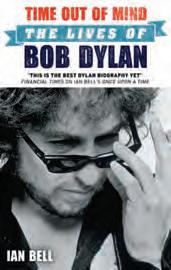
When Once Upon a Time, the first volume of Ian Bell’s biography of Bob Dylan, was published, it received almost universally rave reviews, many of which ended by hoping that we wouldn’t have to wait too long for part two. The good news, then, is that we didn’t—because now, less than 12 months later, here it is.
Time out of Mind picks up the story in early 1975, when Dylan had just released Blood on the Tracks, an album clearly inspired by the break-up of his marriage to wife Sara. (Their son Jakob once described it as the sound of “my parents talking”.) It was also his first masterpiece since the mid-Sixties.
In fact, Dylan’s sales for the rest of the 1970s were better than they’d ever been—even when he bemused his old fans from the counter-culture by becoming a born-again Christian.
Bell convincingly argues that Dylan’s embrace of old-time religion didn’t come out of the blue. Even so, he does think that it soon proved a creative dead end. Then again, Dylan might have been heading for one of those anyway—because, give or take the odd good song, Bell sees the 1980s as a period of “creative extinction”. A particularly excruciating low point came at Live Aid when, after providing a distinctly anti-climactic climax to the whole event, Dylan ended by suggesting that some of the money should be given to American farmers.
The live performances famously continued, on what the press have called the Never-Ending Tour, even if they weren’t always great. (Drink may have been involved.) Yet, between 1990 and 1997, Dylan didn’t record a single original song. And that, on the whole, seemed to be that.
But then, apparently out of nowhere, came the towering Time out of Mind, which won three Grammies (the musical equivalent of the Oscars), including Album of the Year. His records since have
RD EXCLUSIVE: IAN BELL’S
CHOICE OF SIX GREAT DYLAN SONGS
Girl from the North Country (1963)
Did he know all there was to know about love and loss aged 21? Was this an original melody, or was he just tinkering with the old English “Scarborough Fair”? One of the great love songs of the 20th Century.
Mr. Tambourine Man (1965)
A choice so obvious it dares you to choose another. A song that never fails to still all doubts over the belief that poetry can come from pop songs.
Like a Rolling Stone (1965)
One day, in the summer of 1965, a child heard something on the radio and said, “What is that?”


132 READERSDIGEST.CO.UK AUGUST 2013
RD’S RECOMMENDED READ
►
been equally acclaimed, and have even returned him to the top of the charts. More surprisingly still, he’s published a wildly entertaining memoir and become a genuinely funny radio host.
Bell follows these twists and turns with just the right mixture of fondness, amusement, shrewd analysis and occasional bewilderment. Unlike many writers about Dylan, he’s never too earnest; nor is he blind to the man’s shortcomings. The result is a huge treat for fans, and a superb (if quite long) introduction for anybody else who’s ever wondered what all the fuss is about.
But let’s go back to 1975 for this extract. Despite Blood on the Tracks, the Dylans weren’t completely estranged—which is why his soon-tobe-ex wife was there one night as he recorded the album Desire. What she didn’t know was that he had a new song called “Sara” waiting for her…

Dylan’s confederates in the studio were given no hint of the existence of ‘Sara’. He made the recording in the early hours of August 1 while his visiting wife, not forewarned, sat listening. In a manner unmatched by anything on Blood on the Tracks, Dylan exposed himself utterly. He seemed to plead for his life.
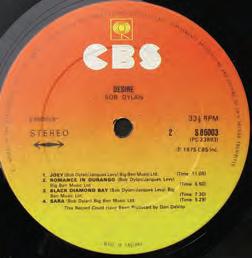
In his book On the Road with Bob Dylan, ‘Ratso’ Sloman described the night of July 31/August 1 as a quiet session in which a good deal of time was spent listening to playbacks of previous recordings. Then, it seems, Dylan turned to his wife, said, ‘This is for you’, and performed ‘Sara’. The song was greeted by those present, in Sloman’s account, with the kind of silence generally described as ‘stunned’—while Sara remained ‘impassive’.
which a good deal of time was spent listening song account, with the kind of silence generally




The song’s appeal is, intensely, a matter of taste. There are clichés enough within it.
viewed through one man’s tired eyes. Here are
But here, equally, are scenes from a marriage, viewed through one man’s tired eyes. Here are family moments, intimate thoughts and feelings, private—you might have thought—and personal, o ered in a way that was, for this artist, entirely unprecedented. The song ends with Dylan’s


Time out of Mind: the Lives of Bob Dylan by Ian
published on August 1 by Mainstream at £20 ►
133 AUGUST 2013READERSDIGEST.CO.UK
Bell is
Above, Dylan during the recording of Desire, 1975; below, with his wife Sara
‘‘
For a short while the song may seem to have achieved its purpose, but the recordingsession remains one of thestrangestof Dylan’scareer
keening words, ‘Don’t ever leave me, don’t ever go’.
Many fans find ‘Sara’ intensely a ecting; a few of us wince. How a notably guarded woman might have felt about having her marriage acted out before strangers in the middle of a New York night tends to be overlooked. Clearly, Dylan was so caught up in his emotions he did not see fit to ask permission— when did he ever? Through all the years of their union he and his wife had made their privacy paramount. Now all of that was cast aside simply because he felt the need.
You could call ‘Sara’ one of the great love songs. You could also call it a piece of sentimentalised emotional blackmail. Sara, trapped by the performance, might have had reason for her impassivity. He, bereft, simultaneously acknowledging that the marriage was over yet begging for it to continue, could put his side of the story before millions of people in a Bob Dylan song. She had no such opportunity, even if she had wanted it. The fans who hear only an expression of profound love assume that Sara must have been deeply moved when first she heard the song.
But what was she supposed to say or do? Try yet again to make the marriage work, no doubt. For a short while the song would seem to have achieved its purpose, but the recording session remains one of the strangest episodes in Dylan’s career.
The central rule of his art had been that plain truth is never to be o ered. Now, suddenly, he was telling the world, among other things, how his wife had helped to get him o heroin in New York in 1965.
Afterwards, the world was never the same again.
Knockin’ On Heaven’s Door (1973)
Just a song from a film [Pat Garrett and Billy the Kid]. Just a reminder that we all grow up. A song that can haunt your life.
Not Dark Yet (1997)
Because it wasn’t, and because you write o a born writer at your peril. The signature song for the most improbable comeback of them all.
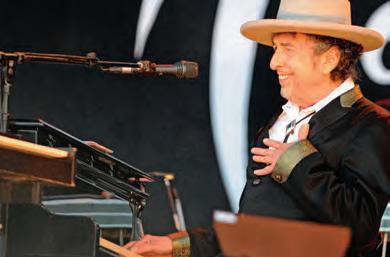
Bob Dylan in smile shock! Live in France, 2012
This, surely, was too close to any bone. Who tells the world such things? Not, or so it had been presumed until now, Bob Dylan.

AND
Things Have Changed (2000)
Further proof from the old ru an that obituaries can be deceptive, as his contribution to the movie Wonder Boys wins the Oscar for Best Song. n
134 READERSDIGEST.CO.UK AUGUST 2013
◄ ’’
◄
THE
Enid Blyton.
NAME OF THE AUTHOR IS…
(Needless to say, that self-employed taxi-driver is called Noddy).
FRED TANNEAU/AFP/GETT Y

Books That Changed My Life
Best-selling author Adele Parks has sold over two million copies of her novels in the UK since publishing her first book Playing Away in 2000. Her latest, The State We’re In, is out now.
Behind the Scenes at the Museum by
Kate Atkinson
The late 1990s were a period in my life when I was able to indulge my love of reading; I was commuting to work and didn’t yet have a family and I read voraciously. This was Kate Atkinson’s first book—I was dazzled by her amazingly intelligent writing and inspired when it won the Whitbread Book of the Year, ahead of Salmon Rushdie. Kate was portrayed as an ordinary woman from Yorkshire, and while I sat on the train to work, I thought, I’m an ordinary woman from Yorkshire too and I’ve always wanted to write. Maybe I can do it as well. I started writing Playing Away soon after that.

As told to Caroline Hutton
To Kill a Mockingbird
by Harper Lee
I’d always loved English lessons, but when we read this book in class I actually started to live for them. At 12 years old I was the ideal age to appreciate the humour, irony and adult hypocrisy so brilliantly portrayed in this astonishing novel. I can vividly remember where I sat in the classroom, the way the light came through the window, the sound of the teacher’s voice and who sat next to me—all these things were linked to my enjoyment of the book. I realised I felt more passionate about it than my friends and it a rmed what I’d felt as a child—I had to be a writer! Besides, flesh-and-blood books were, and still are, the most important thing to me because of the way they give meaning to life.
 by Gina Ford
by Gina Ford
The Contented Little Baby Book
When my son was born I was living in London, far from my parents in Teeside, and then I found myself a single mum. This book was the one thing that kept me sane. It mattered so much to me because it made me feel like I was getting something right—or at least not completely wrong. Knowing that my baby would definitely sleep at certain times of the day gave me the freedom to continue writing. Gina Ford gave me back some control, although once you get pregnant you never really have total control in your life ever again! ■



least not completely wrong. Knowing that my

135 AUGUST 2013READERSDIGEST.CO.UK
Harper Lee on set during the filming of her book




SHOPPING DIRECTORY 136 Specialists in beautifully-crafted made to order furniture. CD/DVD cabinets / TV / Hi-Fi furniture Wide range of woods and finishes Contemporary or traditional design For further information, please email us info@deanwattsbespokefurniture.com or phone 01295 760017 or 07929 032574 www.deanwattsbespokefurniture.com Dean Watts Bespoke Furniture 0845 434 8749 Napton Narrowboats A Great British Touring Holiday - you know you've always wanted to try it! Family run business for 25 years Weekly hire or short breaks. Call 01926 813644 www.NaptonNarrowboats.co.uk Thinking of Writing Your Life Story? (or done so already!) For a fun-filled hobby... ... and a great family book Phone Mike for a chat 01869 246796 www.boundbiographies.com Bound Biographies Ltd 10 Pipits Croft Bicester, Oxon OX26 6XW



To advertise on these pages please contact Nick Page Tel: 07789178802 Email: nick.page@madisonbell.com 137
Laugh!
WIN £50 for every reader’s joke we publish. Email excerpts@ readersdigest.co.uk or go to facebook.com/readersdigestuk
¶ A man walks into a bar and orders three whiskies. The barman pours one and says, “Let me know when you want the next.” But the man says, “No, I’d like all three at once.”
The barman pours two more drinks. The man slugs all three, pays and leaves.
This goes on every night for a week. Finally, the barman asks the man why he orders three at a time. The man says, “When I left my home, many miles away, I promised my two brothers that whenever I had a drink, I’d order one for each of them too.”
The man returns every night for a year. He and the barman get to know each other very well. Then, one day, the man orders only two whiskies. This goes on for a couple of weeks, but the barman is afraid to ask if something has happened to one of the brothers. Finally, he summons up the courage to say, “I noticed you’ve been ordering only two drinks for the last few weeks. Is everything OK with your brothers?”
The man looks at the barman, puzzled, then realises what he’s implying. He smiles and says, “Yes! My brothers are fine, but I’m trying out life as a teetotal.”
Seen at on Reddit



¶ THE PRESIDENT OF COCA-COLA PUTS IN A CALL to Russian president Vladimir Putin.

“Mr Putin, I notice you’ve changed the Russian anthem. Do you have any plans to change the flag as well and return to the previous purely red flag? If you’d put a Coca-Cola trademark in the corner, we’d solve all your financial woes for the next five years.”
Putin puts the call on hold and asks his underlings, “Hey, when does our contract with Aquafresh end?”
Seen at ahajokes.com
138 READERSDIGEST.CO.UK AUGUST 2013
¶ I banged my head the other night, so I followed the old wives’ tale of rubbing margarine on it. But I still have a sore noggin.
I can’t believe it’s not better.
Julie Mo at, Newport
¶ I’m 33, but this year I got ID’d buying fine wine in Marks &
I was addicted to soap once, but now I’m clean
Seen on Reddit
Spencer. The guy said, “Have you got any proof you’re over 18?”
I said, “Yes, I’m in Marks & Spencer.” Comedian Mark Watson
¶ My comment on the suggested plans to build a full-sized replica of the Titanic: “It’s unthinkable.”
Comedian Anthony King
Silence is golden. Unless you have kids. Then it’s just suspicious
Seen on the internet

THE TROUBLE WITH AUGUST BY JOSH WIDDICOMBE
Award-winning comedian Josh Widdicombe is 5ft 6.5in tall, and his favourite TV show is The Simpsons. Each month, he lets us know just exactly what his problem is.
Childhood misleads you about how much fun August can be. Like Now That’s What I Call Music albums, August is something best enjoyed before the age of 16 and then occasionally looked back on with sepia-tinged nostalgia while questioning where your life went.
August o . Did this actually happen? What the hell did I do with my time? Play? What a bloody waste!

If youth is wasted on the young, then surely this applies even more so to summer holidays. Think of the things I could now achieve with an August o . For a start, my receipts for my tax return would be nicely sorted by August 2. What I’d do after that is anyone’s guess.
As a grown-up, I now find it almost impossible to believe that, for a long period of my life, I got the whole of

Instead, we’ll all spend August just doing the same jobs we do for the rest of the year (for instance, performing a show at Edinburgh Festival, 9pm at the Assembly Rooms, August 1–13, tickets still available).
Benjamin Button had it made; they have life easy, the young.
139 READERSDIGEST.CO.UK A UGUST 2013
►
AWKWARD SHOPPING MOMENTS
There are many good reasons why some people hate shopping—one is that there’s such great scope for embarrassing scenarios like these (seen at buzzfeed.com).
● Asking somebody who’s not a shop assistant for help.
● Setting o the alarm when you didn’t steal anything.
● Having the sales assistant ask if you need a larger size.
● Getting judged by the sales assistant for being too poor to buy anything in the shop.
● Hearing a rip when you try something on.
● Having the security guy think you stole the thing you walked in with, because this shop also sells it.
● Having your card declined, and insisting it must be a technical problem.





“Thanks, but no thanks. We just can’t imagine the situation in which someone would say ‘This is a job for Stickman…’ ”

PUNNING A SUCCESSFUL BUSINESS
Everybody likes a shopfront with a sense of humour.

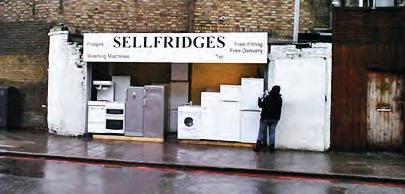



140 READERSDIGEST.CO.UK AUGUST 2013
¶ I told my cat I was going to teach him to speak English. He looked at me and said, “Me? How?”
Seen on the internet
¶ I got my first bikini. It’s a threepiece: a top, a bottom, and a blindfold for you.
US comedian
Wendy Liebman
¶ I went to the grocer’s today and picked up an iceberg lettuce. I said to the shop assistant, “Why is it that these just seem to be getting smaller and smaller?”
“Global warming,” he replied.
Seen on the internet
¶ According to my wife’s diary, I have boundary issues.
Seen on Reddit
¶ It’s worth remembering that spiders can see in the dark, so if we do eat them in our sleep, it’s their own stupid fault.
Twitter comedian @sixthformpoet
60-Second Stand-Up
Ladies and gentlemen, please welcome Carey Marx
FAVOURITE JOKE?
I heard this when I was eight and thought it the funniest thing ever. I still think I was right, but most people don’t find it funny. And they’re wrong.
Customer: A steak and kidley pie, please.
Waiter: I think you mean kidney, sir.
Customer: I said kidley, didle I?
FUNNIEST HECKLE RECEIVED?

Carey Marx is in Edinburgh with new show Intensive Carey throughout August
Heckles aren’t funny. But, when I was new, I was compèring a show when somebody shouted, “Jew boy!” Now, when you receive racist abuse, you’ve a right to come down hard. I hit him with every put-down I’d ever heard. I was cruel. Afterwards, I went to the bar. The man came to join me. He was upset. “Why did you make fun of me so harshly?” I reminded him he’d shouted “Jew boy” at me. “No! You were asking where people in the audience were from. I was telling you I’m from Dubai.” I still cringe when I think of him.
FUNNIEST THING THAT’S EVER HAPPENED TO YOU?
Apart from the heart attack I based my new show on, there was also the organiser of a corporate gig who insisted on a pointless rehearsal and shouted at me and all the waiting sta . She needed everything to run perfectly. After shouting at everyone she could shout at and finally being satisfied nothing could go wrong, she allowed the clients in to dinner. She sat down with them, then promptly fell asleep in her soup. Nobody woke her.
FAVOURITE TV SHOW?
I like It’s Always Sunny in Philadelphia, Community and Modern Family. A favourite scene from Modern Family is “Phil’sosophy”, which includes the advice, “You can tell a lot about a person from his biography.”

FINALLY, WHO’S YOUR COMEDY INSPIRATION?
If I have to settle on one, it would be Woody Allen for his perfect timing, wording and hilarious angles. n
141 READERSDIGEST.CO.UK A UGUST 2013
STEVE ULLATHORN (MARX)
RD Brain Teasers
Grab a cup of tea and a biscuit and bend your mind to these six puzzles, ranging from the mildly ba ing to the pen-chewingly fiendish
1. POLY-GONE
Take a look at the set of numbered, coloured shapes and work out which option fills the gap.





2. MISSING LETTERS
Look at the square on the right:

Can you work out in one minute which one of these squares numbered 1 to 6 doesn’t contain any of the letters in that square?

3. DIGITAL WIZARDRY
Add to the number 12345678 a permutation of the same set of eight digits in order to produce the smallest possible result consisting of even digits only.


4. SUDOKU To win, you have to put a number from 1 to 9 in each outlined section so that: • every horizontal row and vertical column contains all nine numerals (1–9) without repeating any of them; • each of the outlined sections has all nine numerals, none repeated. If you want even more of a challenge, try timing yourself too.
Di culty
142 READERSDIGEST.CO.UK AUGUST 2013
A B C D
★★★★
?
+ ? =
* Entry is open only to residents of the UK, Channel Islands, Isle of Man and Republic of Ireland aged 18 or over. It is not open to employees of Vivat Direct Limited (t/a Reader’s Digest), its subsidiary companies and all other persons associated with the competition.
5. DRAUGHTS
In this game, the draughts can move over one another in any direction. A piece is removed when another piece jumps diagonally over it. In one move you can make your piece sequentially jump over a number of other pieces. Make just one move so that only eight pieces remain on the board, arranged so that no horizontal, vertical or diagonal line contains more than one piece.
Answers
1. Poly-gone: C is the missing figure.
2. Missing letters: Square 4. 3. Digital wizardry: Add 12534768 to give 24880446.

4. Sudoku: If you solved it within: 15 minutes, you’re a true expert; 30 minutes, you’re no slouch either; 60 minutes or more, maybe numbers aren’t your thing.
5. Draughts: The piece originally on square F6 jumps over and removes the pieces on E5, C5, C7, E7, G5, G3, E3 and C3 to finish on B2 (or reverse the order of the first four pieces so you get E7, C7, C5, E5, then the rest in order).


£50 prize question
(answer will be published in the September issue)
Place a number in the central box by which all the numbers can be divided without leaving a remainder. The number is greater than 1
The first correct answer we pick on August 2 wins £50!*
Email excerpts@readersdigest.co.uk
Answer to July’s prize question:
31
And the £50 goes to… Arnold Jones from Flintshire
AUGUST 2013READERSDIGEST.CO.UK 143
405 783 243 486 648 297 ? 1 2 3 4 5 6 7 8 A B C D E F G H
Beat the Cartoonist!
WIN £100 AND A CARTOON PRINT

Think of a witty caption for this picture and you could beat the experts at their own game. The three best suggestions will be posted on our website in mid-August alongside an anonymous caption from our professional cartoonist. Visitors can choose their favourite—and if your entry gets the most votes, you’ll receive £100 and a framed copy of the drawing. Submit to captions@readersdigest.co.uk or the address on p4 by August 9. Enter and vote online at readersdigest.co.uk/caption. We’ll announce the winner in our October issue. ■
JUNE’S WINNER

Another month, another onesided massacre. Cartoonist Gerard Whyman’s caption, “Oh, that lot? They’re the DVD extras,” was over 200 votes shy of Dorothy Bowkett’s contribution, “If I’m watching a TV quiz, I insist on the best expert help.” Our readers are clearly getting better and better as time goes on. Here’s hoping for a closer contest next time!
SCOREBOARD READERS 13 CARTOONISTS 5
In next month’s issue
Martin Clunes, back on TV as Doc Martin, on “doing things that simply aren’t on o er to the average actor”
• How to make yourself crime-proof
• Easy ways to wake up your brain PLUS Meet the new British icons



144 facebook.com/readersdigestukReadingTheDigest twitter.com/rdigest b PHOTOGRAPHED BY
NICKY JOHNSTON
facebook.com/readersdigestuk ReadingTheDigest



The








UK’s No. 1 supplements for women’s health
Whether you are looking for support during a time of change like pregnancy or menopause, or simply an ideal general multi-vitamin, the award winning Vitabiotics women’s range offers comprehensive nutritional support from sensible, balanced formulae. With over 40 years’ experience, there’s no women’s supplement range more relied on than Vitabiotics.
Working with:

From , Superdrug, Holland & Barrett, Lloydspharmacy, GNC, supermarkets, health stores,independent pharmacies & www.vitabiotics.com
Vitamin supplements may benefit those with nutritionally inadequate diets. † Professor Beckett is not cited in the capacity of a health professional, but as a product inventor and former Chairman of Vitabiotics.

ADMIX2CONP04-07-13E

Building on over 30 years of innovation and research, the Bose Wave ® music system III delivers awardwinning, room-filling quality sound, yet the entire one-piece system takes up less space than a single conventional speaker.
Music. As it was meant to be heard. The Wave ® music system III reproduces music with the most accuracy we’ve ever produced in a system this small. You’ll hear details you’ve never noticed in songs you know by heart, feel a fullness and power of bass notes – and experience clarity at even the highest frequencies. Exclusive Bose ® waveguide technology allows this compact system to deliver room-filling sound with depth and definition.
The features you want.
The system’s front-loading CD player and digital DAB FM/AM tuner offer you two ways to experience your favourite music, while the digital display shows track information as you listen. Touch-top controls turn the system on, off and snooze the alarm, and the slim, credit-card sized remote offers one touch control of
all the system’s functions.The Wave ® music system III also features dual alarms for two different wake-up times making it one of the most convenient devices you can own.
Music from your iPod, iPhone*, computer or tablet
Available accessories bring music from your iPhone or iPod*, or wirelessly from your tablet, computer or other Bluetooth® device. And being compact, the Wave ® music system III fits neatly just about anywhere – so you can enjoy all kinds of music in all kinds of places.
Hear it for yourself, risk-free.
We believe the best way for you to appreciate the Wave ® music system III is to experience it in your own home. So call now and listen for 30 days without risk or obligation Why wait any longer? Hear for yourself why Bose is one of the most respected names in sound.
Place your order now
*Dock not compatible with iPhone 5 and iPod shuffle.**Payment plan is available on credit/debit cards only and is subject to status. An initial deposit is due at the time of order and all payments will be charged to your credit/debit card. If the product is returned, the deposit is fully refundable. There will be no interest charges from Bose. In the event of late payment, credit/debit card company interest charges may apply. Delivery is subject to product availability, clearance of payment and security checks and can be up to 10 days from when Bose receives the order. Price/Payment plan/Offer subject to change without notice. Free shipping offer applies to UK standard delivery only. Risk free refers to 30-day home trial only. ©Bose Corporation 2013. All rights reserved. The Wave® music system’s distinctive design is a registered trademark of the Bose Corporation
other countries. The Bluetooth
word mark is a registered trademark owned by Bluetooth SIG, Inc., and
under license. iPod and iPhone are registered trademarks of Apple Inc. Registered DAB Digital Radio used with permission of Digital One Ltd. Registered in England no 1187672. Registered Office: Bose Ltd., 1 Ambley Green, Gillingham Business Park, Gillingham, Kent ME8 0NJ. Product shown in Titanium Silver. Also available in Graphite Grey and Platinum White.
in the U.S. and
®
any such use by Bose Corporation is
It’s what you’ve always wanted. Only better.
Easy payment options - 0% interest charges from Bose** FREE shipping to your home To try it, with no obligation Not delighted? FREE return shipping 30 DAYS WAvE® Music sysTEM iii To oRdER oR To lEARN MoRE call FREE on 0800 081 3394 quoting reference 40111 or visit www.bose.co.uk/wms Monday to Friday 9am – 6:30pm, Saturday & Sunday 10am – 5pm FoR A FREE iNFoRMATioN PAck TExT ‘BosE40111’ To 84118
















































































 Author and BBC4 Review Show critic Natalie Haynes on the new releases
Author and BBC4 Review Show critic Natalie Haynes on the new releases






















































































 By Eddie Butterfield, Derbyshire
By Eddie Butterfield, Derbyshire



































 Brenda Blethyn may be as down-toearth as the detective she portrays in ITV’s Vera —but she wishes she had her confidence
Brenda Blethyn may be as down-toearth as the detective she portrays in ITV’s Vera —but she wishes she had her confidence




































































 BY CRISPIN ANDREWS
BY CRISPIN ANDREWS































































































 BY JOANNA
BY JOANNA
 CALTON
PHOTOGRAPHED BY GARY
CALTON
PHOTOGRAPHED BY GARY




 BY MATT POTTER
BY MATT POTTER


































































































































































































 by Gina Ford
by Gina Ford






















































